EDITOR’S NOTE: BY REQUEST, SOME OF THE NAMES OF PEOPLE MENTIONED BELOW HAVE BEEN CHANGED/DELETED.
(All photos taken by Randy)
I’m a Ramblin’ Man
I awoke at 3:30AM, eyes burning from the lack of sleep, and walked from my hotel in downtown Brisbane, Australia, to Central Station. I grabbed the first train to the airport. I couldn’t chance missing this flight, or I’d be going back home to the states in defeat. I was so close.
If all went according to plan, in a few hours I would be stepping foot on a country most have never even heard of. At only eight square miles in size, not only is Nauru just a speck in the middle of the Central Pacific, but it holds the title as The Least-Visited Country on The Planet…Only 160 tourists visit Nauru each year, and this year I would be one of them.
Since there are so few visitors to the island, there was so little online about it. You couldn’t book a hotel online, no flights showed up when searching Expedia, and rental car companies simply didn’t exist on Nauru. Plain and simple, no one was going to this place.
Getting permission to even visit was a task. I had to email for the visa application form and send it back; along with my copy of the round trip flight, hotel reservation and proof of employment letter. I had to wire $50 to Nauru and send a copy of that receipt too. You just didn’t “show up” to Nauru.
What kind of weird country was this, I thought. I needed to study up a little.
Which brings me to a brief history of Nauru, essential to this story and to explain the events that were about to transpire. It’ll be quick and painless, I promise.
Nauru 101
Decades ago, Nauru was the one of the wealthiest countries per-capita in the world. After the island was discovered to be über-rich in phosphate, the outside world came a knockin’ and barreled in to strip the country of its resources. From the 60s til the 80s, enormous amounts of phosphate were mined and exported, extracting the island of its minerals and doing some serious damage to the environment; but at the same time providing the locals with more money and a stronger economy than they could have ever imagined.
Locals sent their kids to expensive boarding schools in Australia while importing tons of vehicles to an island where having more than a few cars is really unnecessary. Nauruans were living high on the hog and enjoying the good life for many years…until the phosphate ran out.
The miners packed up and headed home, leaving tons of giant steel equipment, conveyor belts and factories, to rust and decay on the beaches, like litter after a wild frat party; an afterthought, when the host’s house no longer benefited the guests.
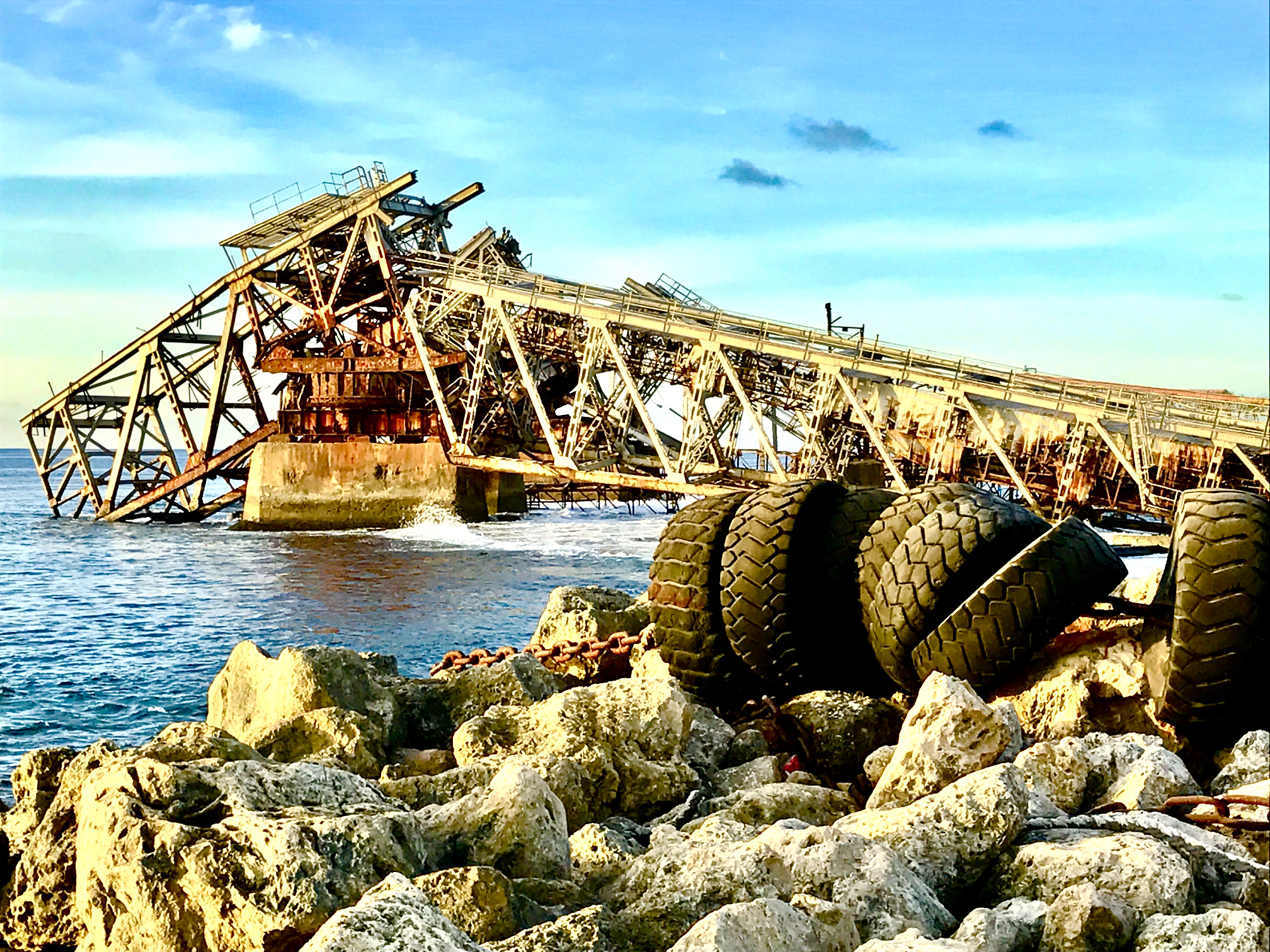
But then came a new opportunity for income: the prison business. Maybe not exactly “prisons,” but it depends who you ask. Australia felt it needed a special place to hold refugees seeking asylum while they were being processed, and it wasn’t going to be Australia. So the Australians came up with the idea of “leasing” the island to hold and house their refugees. So now, you’ve got this tiny island of 10,000 local Nauruans, mixed with hundreds (maybe thousands) of refugees from places like Iran, Afghanistan, Somalia, Sudan, etc; folks that have risked life and limb to escape persecution and braved crossing the sea in rickety fishing boats; all in hopes to land in Australia to start a new, better, safer life.
I didn’t know any of this as I booked the trip; I thought I was just going to a tiny paradise island to lay on a hammock and play the ukulele. It wasn’t until I stumbled upon a documentary on YouTube, that I learned what the island was currently being used for.
With the use of the island to keep refugees, has come lots of criticism from human rights groups. Right or wrong, both Australia and Nauru have been accused of violating human rights by keeping the refugees against their will on this island. They are free to travel about the island—they aren’t kept “locked up”—but nonetheless, there’s been an outcry from many that the entire process is unfair. The documentary I watched was really eye opening and extremely interesting. I felt the most pain for the refugee children—there was one scene where two little girls were talking about being bullied by the locals at school in Nauru. That broke my heart!
Flight 0029
When I arrived at the Nauru Airlines check-in counter I was quite surprised at the number of people in line; or rather, shocked at how many white people I saw. I was actually a little disappointed. I had read numerous times how few people travel to Nauru; so why were all these people here? I was actually pretty let down. I was looking forward to being the only gringo on the flight, and here I was surrounded by a bunch of Australians, off to the island.
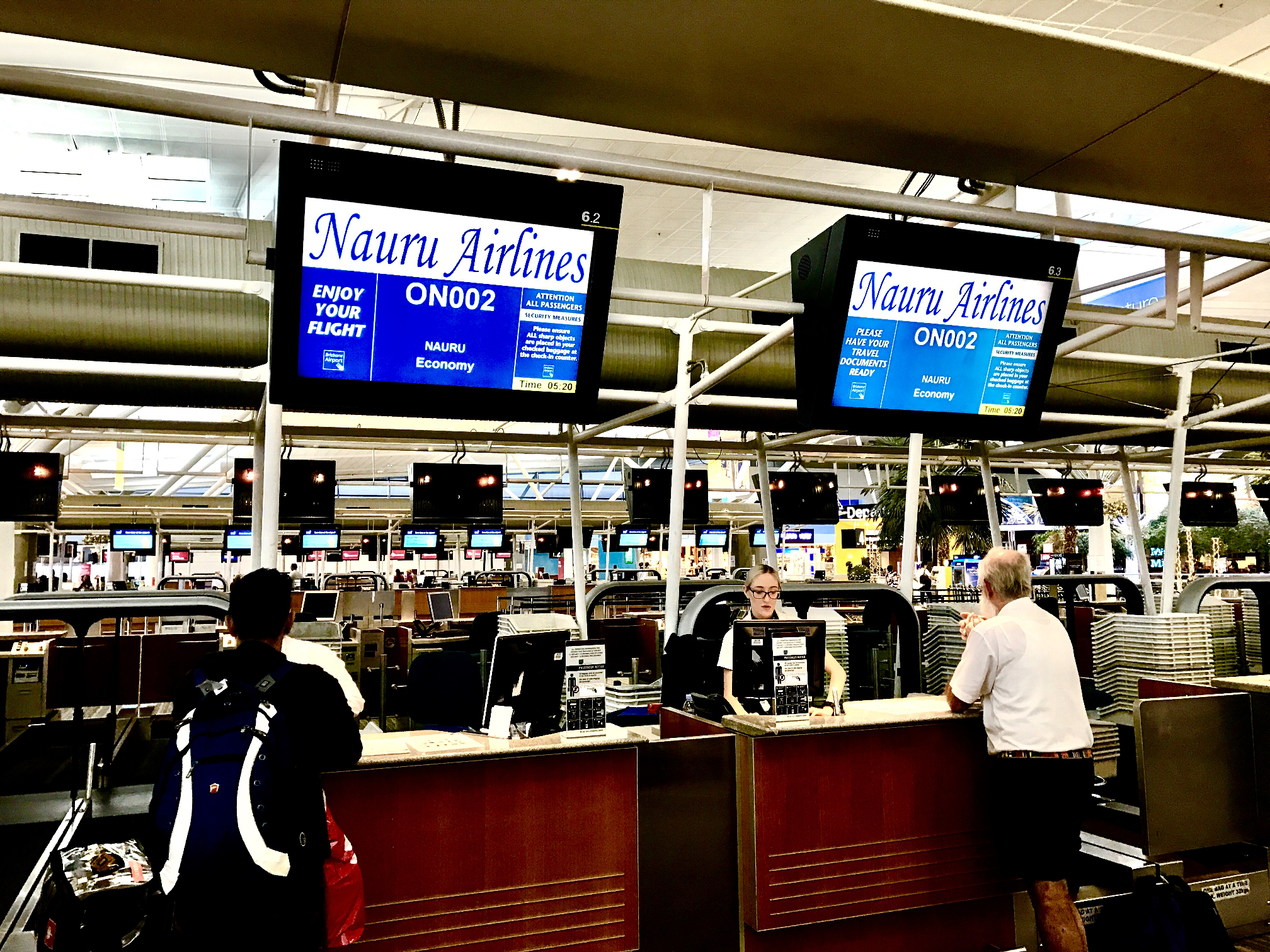
I soon found out that I was indeed the only tourist on the flight, and that the other “gringos” were Australians working on the island. No one was coming to “visit.” I was the only one. I felt cool again. The entire flight was full of local Nauruans and people going to the island for work.
The plane was an old 737 and as I stepped through the door, I heard my first words in the Nauruan language. It sounded crazy…like something from a movie; some dreamed-up tongue you’d hear in a fantasy film about a lost island, or even another planet, in another universe. It didn’t sound like anything I could compare it to; it wasn’t close to anything I’d ever heard in my life. I was anxious to hear more and I hit record on my iPhone to catch the in-flight welcome and safety instructions. Sadly, it was only given in English.
The mostly male airline staff wore teal ties with the Nauru Airlines logo embossed near the bottom, and had name tags with interesting names, like Zulas and Danko. The lead flight attendant, a cheery woman named Helena, wore a blue dress and a big white flower in her hair. Great smile.
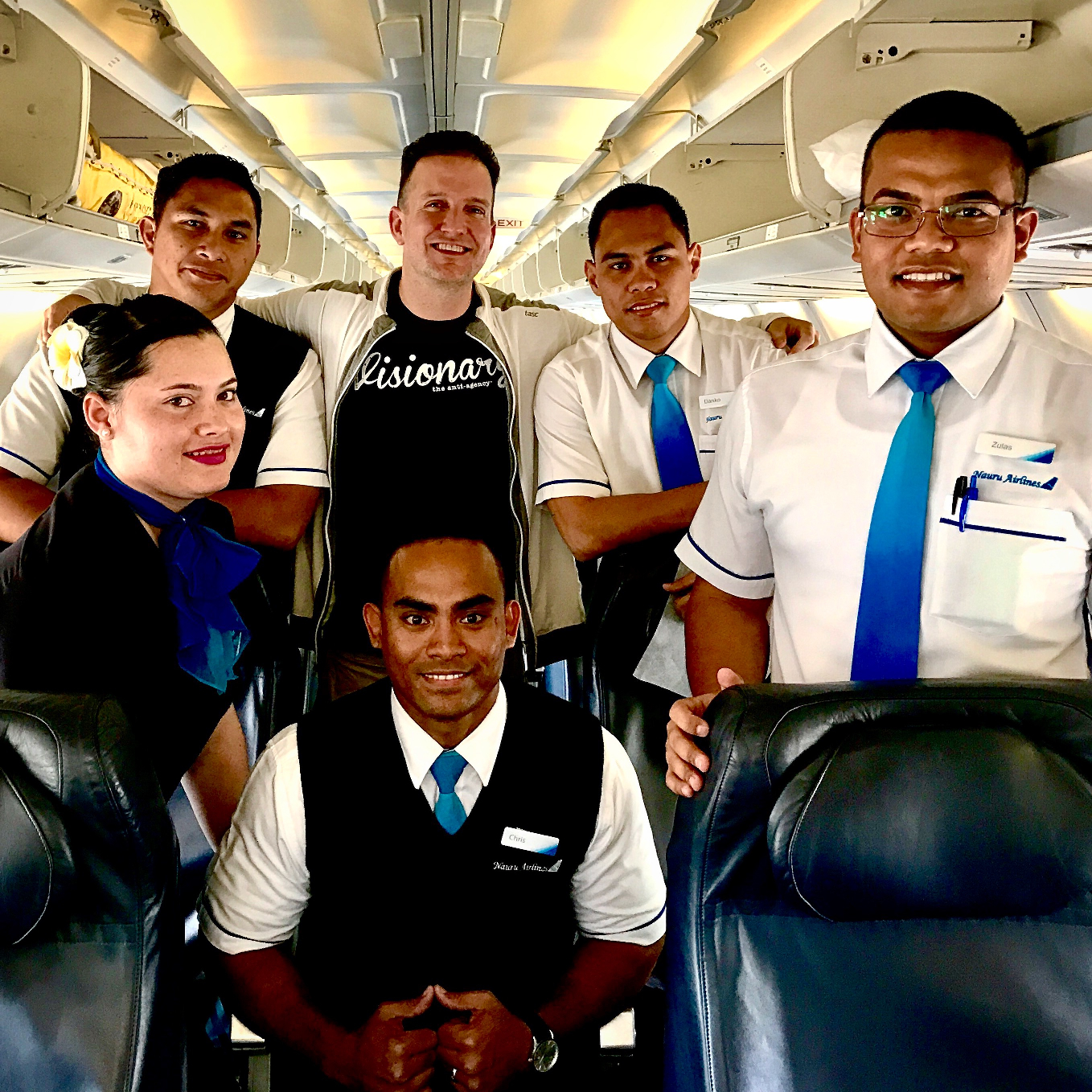
For coach, the service was fantastic, with three beverage services and a snack and a meal; consisting of eggs, fruit, yogurt and a croissant.
I had no clue how I’d even get to my hotel when I landed; I read that there were no rental car companies on the island. A gentleman at the gate informed me that the island had just two taxis, and another man on the flight assured me it’d be easy to rent a car directly from one of the locals, privately. Sounds legit.
I asked the man sitting next to me if there was anything “off-limits” on the island. Once you visit North Korea, you have a new sense of “respect” and even fear of some of these rogue nations. You learn to mind your Ps and Qs in certain places and realize how overly sensitive some countries are when it comes to visitors snooping around. He told me I could roam freely, and that everything was cool. That was a relief, because I’d packed my two bags full of toys, in hopes to get them into the hands of some of the refugee children. If I could only get these Disney Princess dolls to the little girls I saw on the documentary—the ones that were being bullied in school—just to see them smile; my life would be complete. I brought Transformers and Star Wars for the boys. I was on a mission.
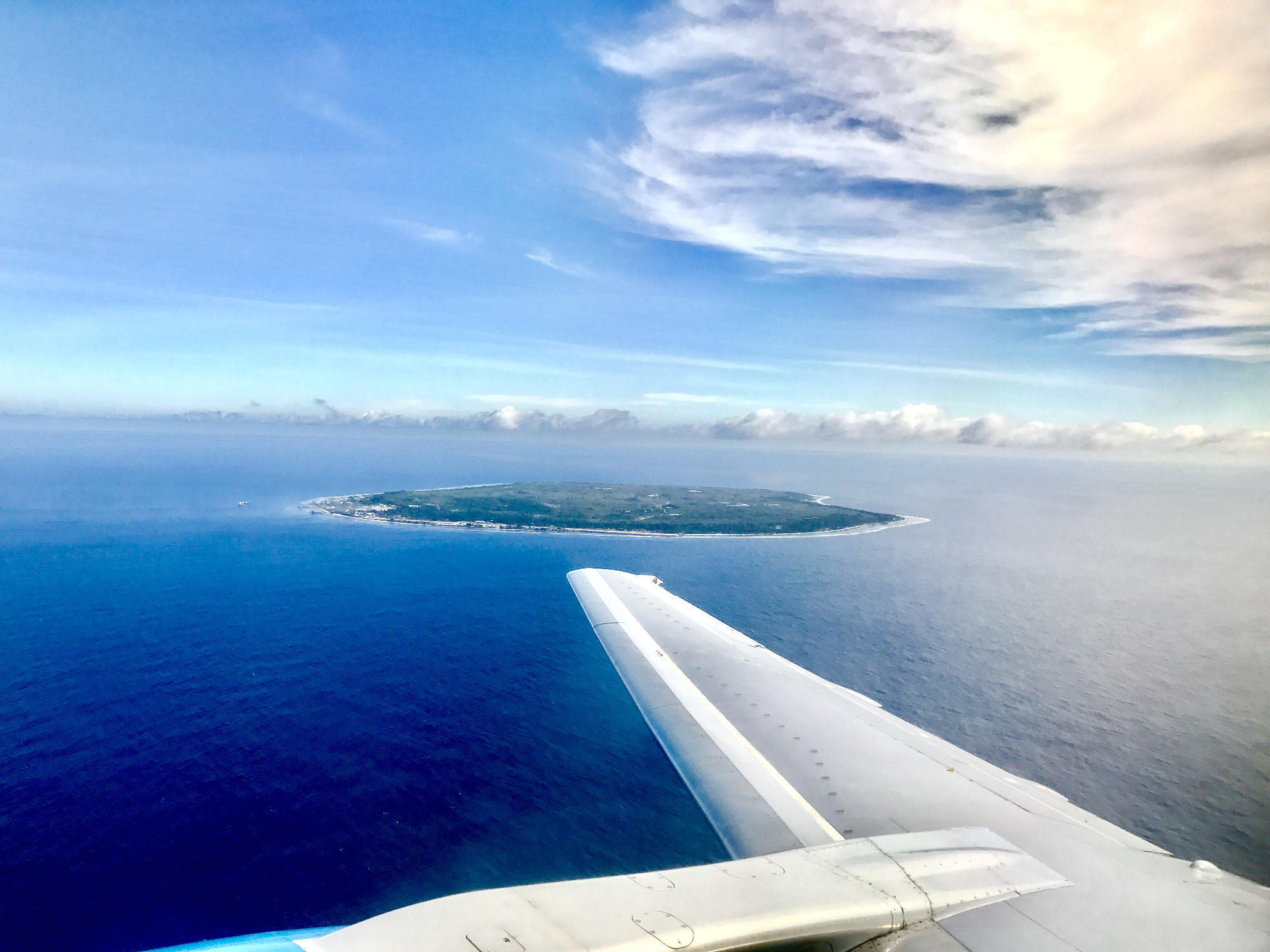
The approach and landing was incredible. The pilot circled the runway to make sure it was clear of any debris, and in doing so, I was able to get a bird’s eye view of the entire country. The entire country. I knew it was small, but seeing it for myself…I was awestruck! This tiny mound of trees and sand was its own republic and I was about to become one of the few who set foot on this strange land. I was downright giddy.
>>> RELATED ARTICLE: SO YOU WANNA GO TO NAURU? EVERYTHING YOU NEED TO KNOW <<<
My mind was blown a second time, when after we landed on that tiny strip perpendicular to the sea, I couldn’t believe my eyes as I watched our plane “cross the street” into the airport. Our plane literally, drove across a road—with cars, stopped by a traffic officer—to park at the tiny terminal. The traffic was also blocked at the beginning/end of the runway. The guy on the plane explained to me that the jet force is too close to the street and that’s why there couldn’t be any cars on the road when planes landed or took off. This was truly insane.
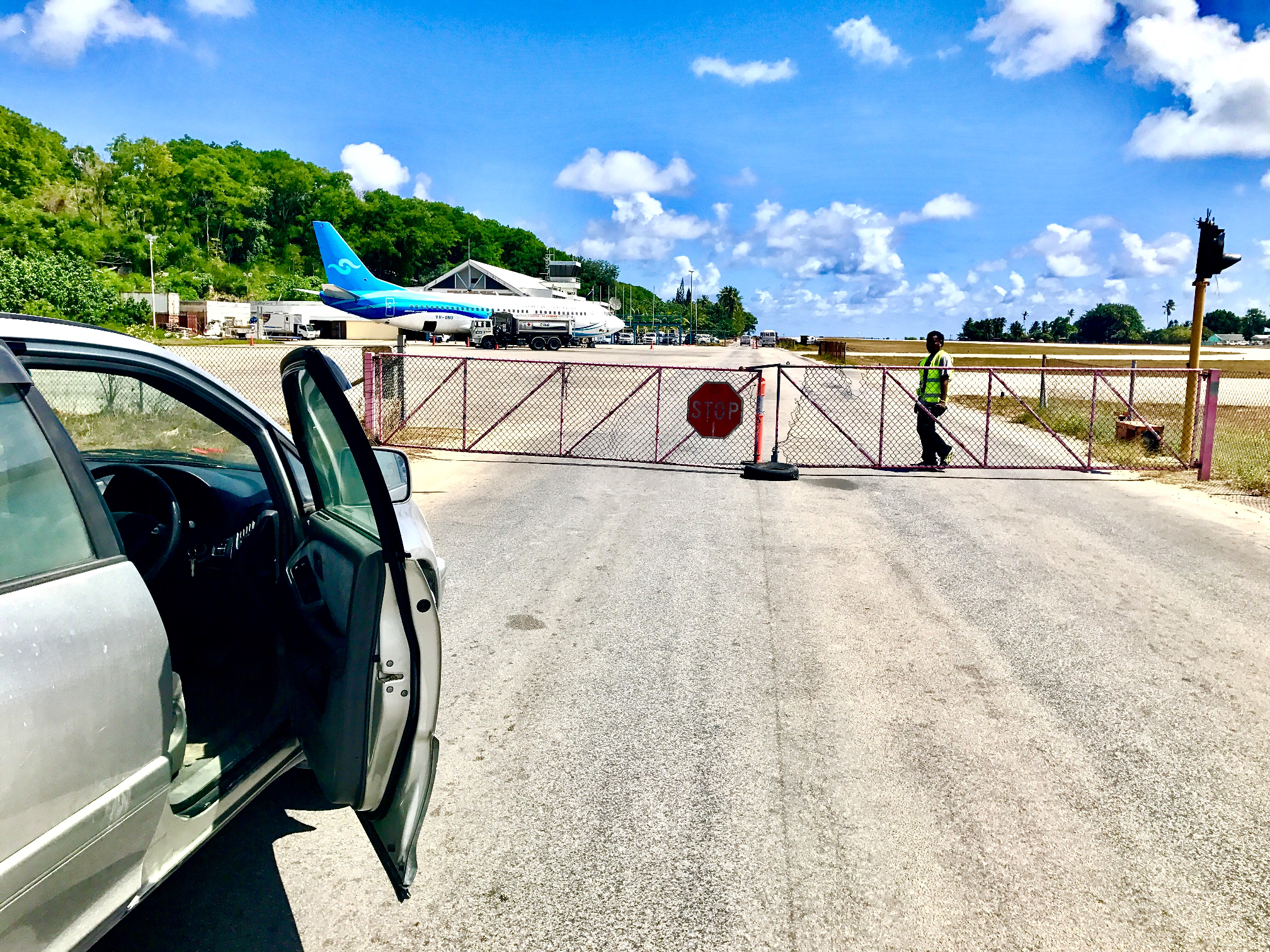
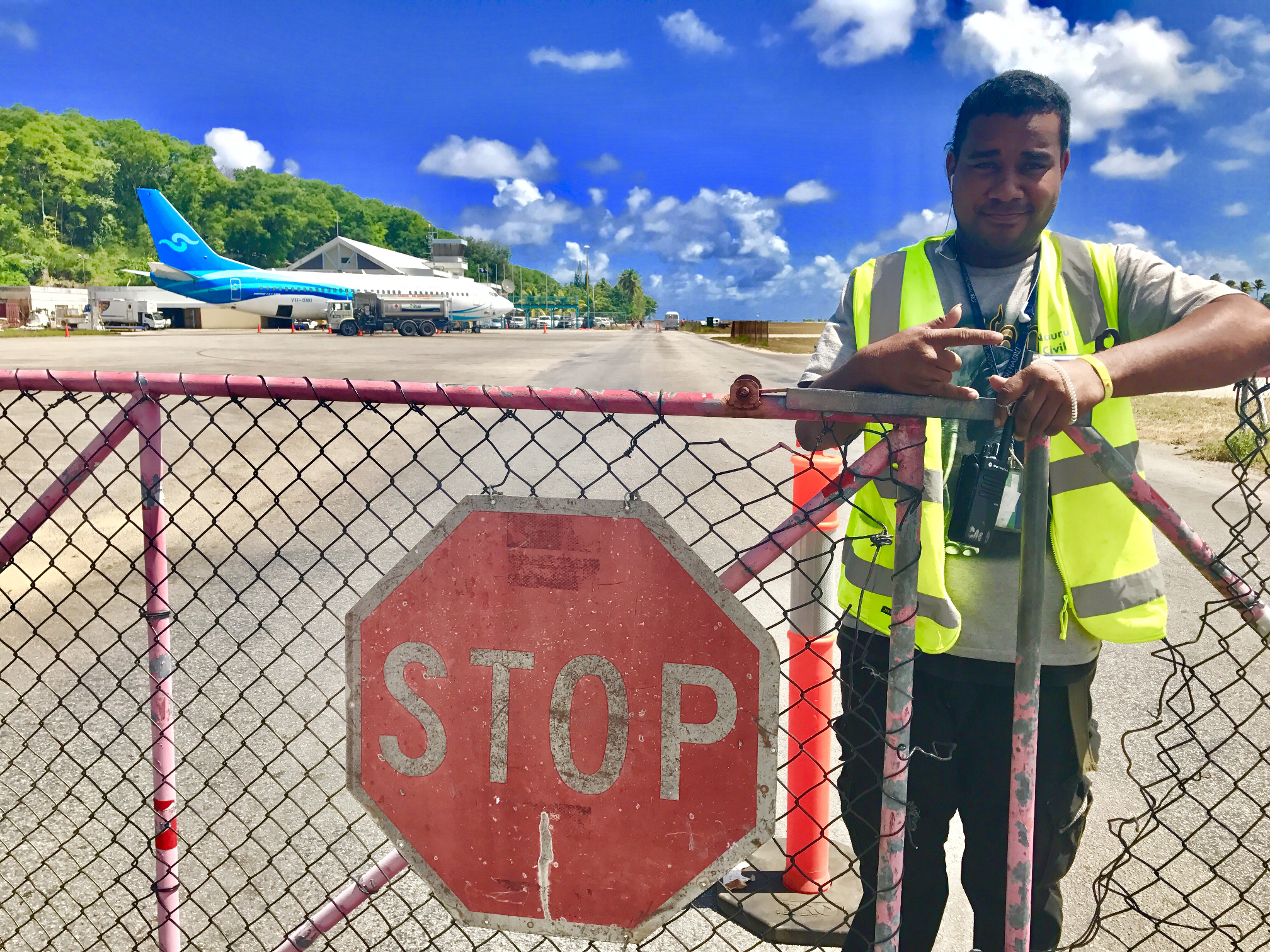
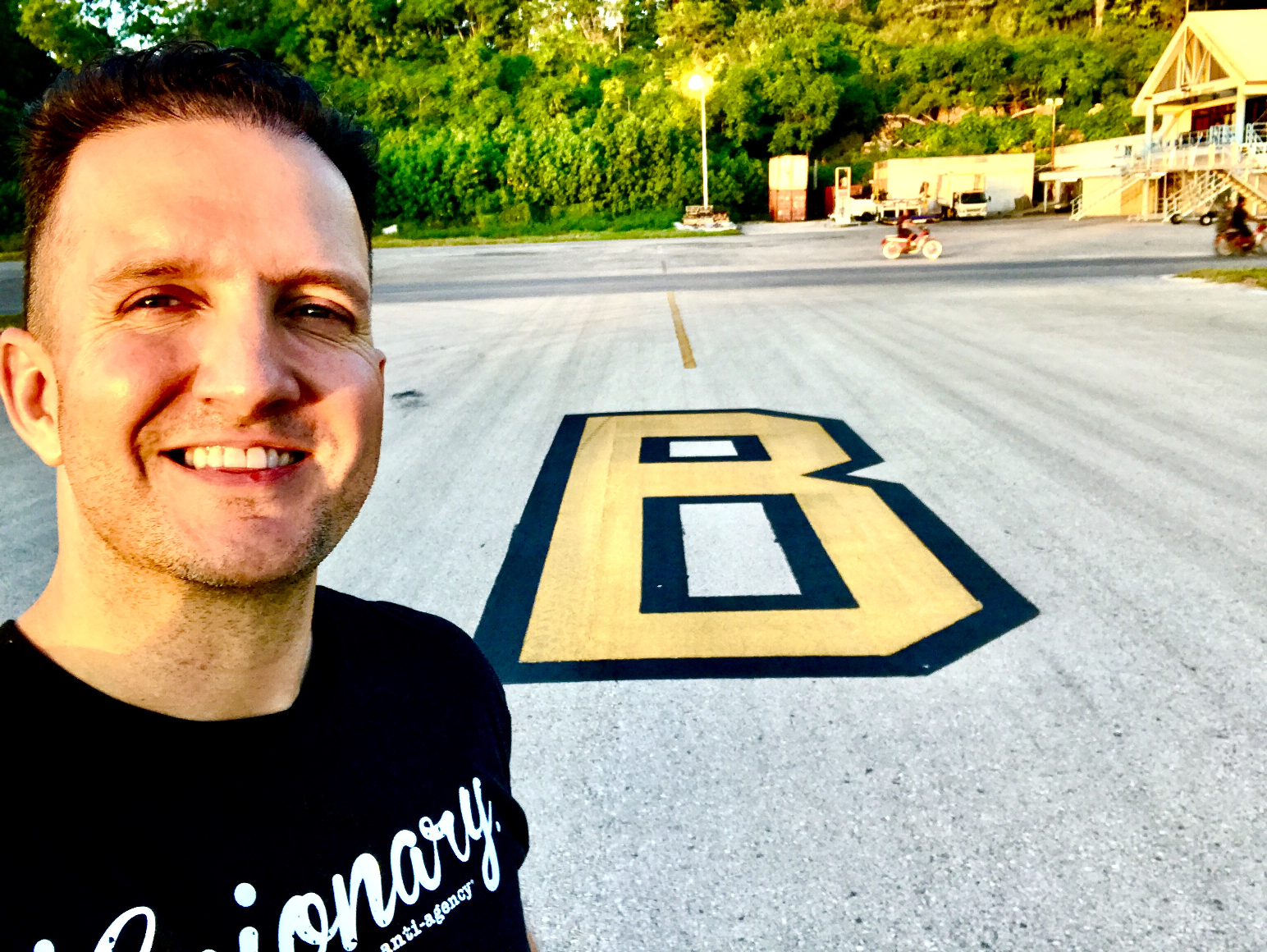
Going through immigration was fun. At the checkpoint were two husky female officers, Nauruans; wearing big colorful muumuus and flip-flops. The customs dude asked what I was bringing in and I told him toys for the kids. I was hoping there wouldn’t be an issue with me bringing so many new toys in—often countries will try and slap you with an import tax. But I was simply motioned through, without even having to open my bag, while passing others being made to unpack all of their stuff onto the metal table.
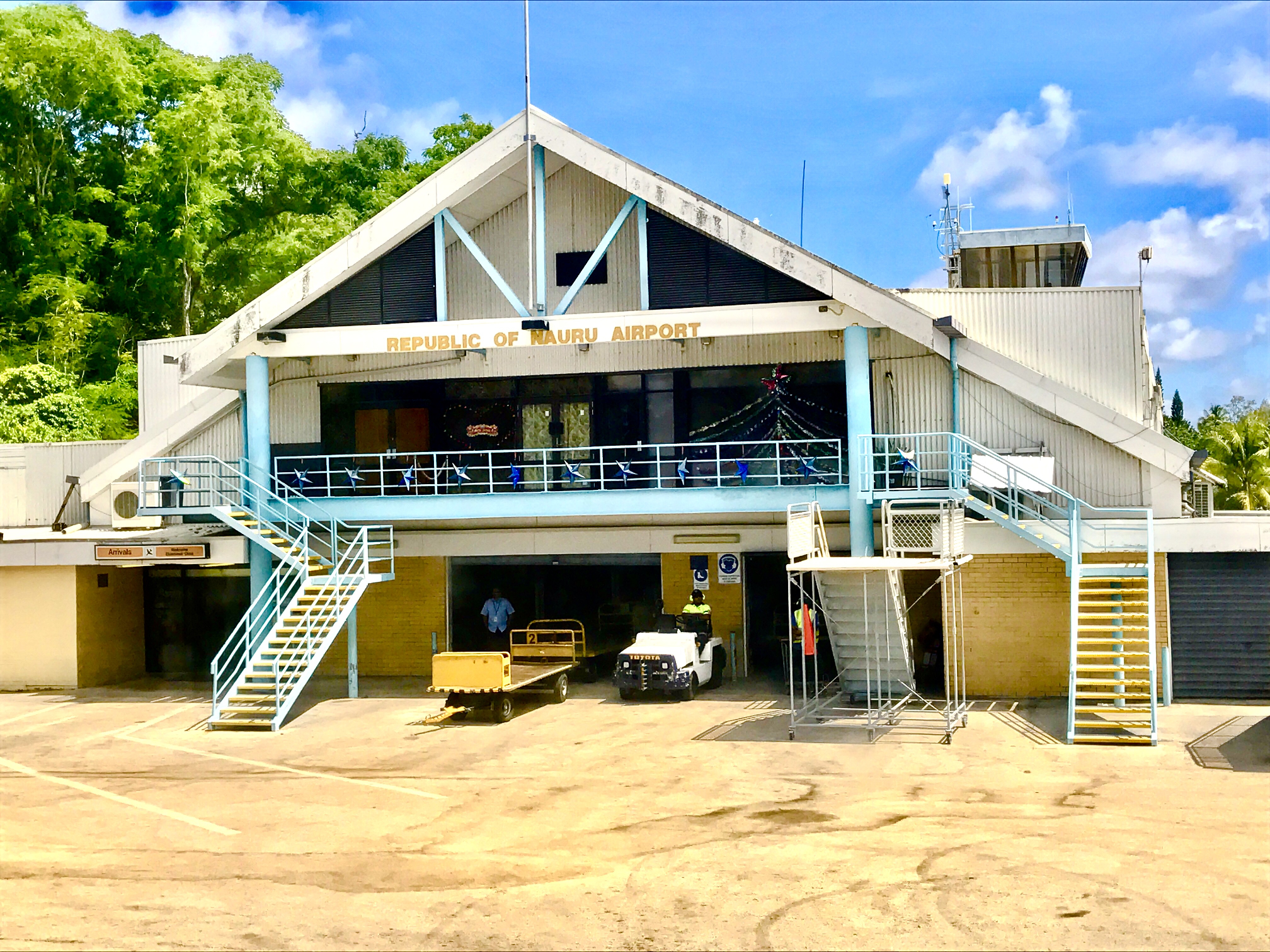
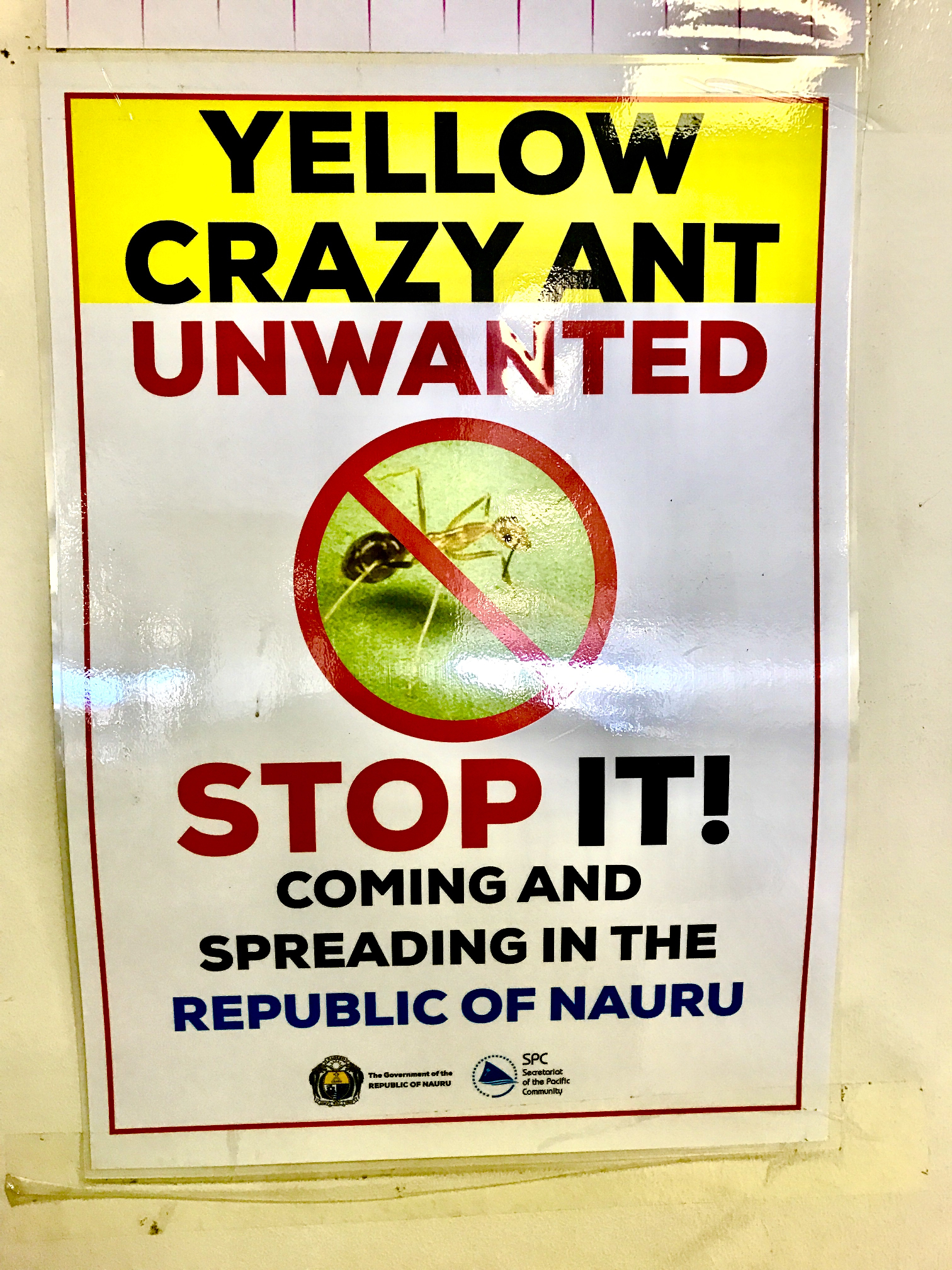
You Can Check In Anytime You Want, But You Can Never Leave
So now I had to figure out how to get to my hotel. Luckily, there was a hotel minivan waiting outside for any new guests. Turned out I was “the” guest of the day. Fonda introduced herself before starting our four-minute journey over to the Menen Hotel.
The island only has two hotels. The Menen and the Od-n Aiwo. Word on the street was the Menen was the nicer one. Truth be told, that was the only hotel I could get a hold of, weeks ago, when I attempted to make a reservation via phone; so I had no choice.
That being said, the hotel looked like something you’d see in Aleppo. No joke. It was the definition of dilapidated. No, beyond dilapidated…borderline abandoned! The front desk checked me in and Fonda showed me to my room. The place wasn’t necessarily dirty—it just looked like it had gotten beat down by the sea for decades, with no maintenance or upkeep whatsoever. The hallways were made of concrete and they were very dark; seemed like only every third fluorescent light bulb worked, barely lighting the way. There were holes in the walls and stains everywhere. Old wooden doors with faded number placards led to each room. The room itself looked pretty third world too. An old rusty pink fan hung from the ceiling, the two tiny beds looked like they belonged in a prison, and the toilet was the kind with a white base and black seat—the kind you see in really bad, old, public restrooms. I was a little weirded out by the place, but seeing no spiders or roaches in the room put me at ease somewhat.
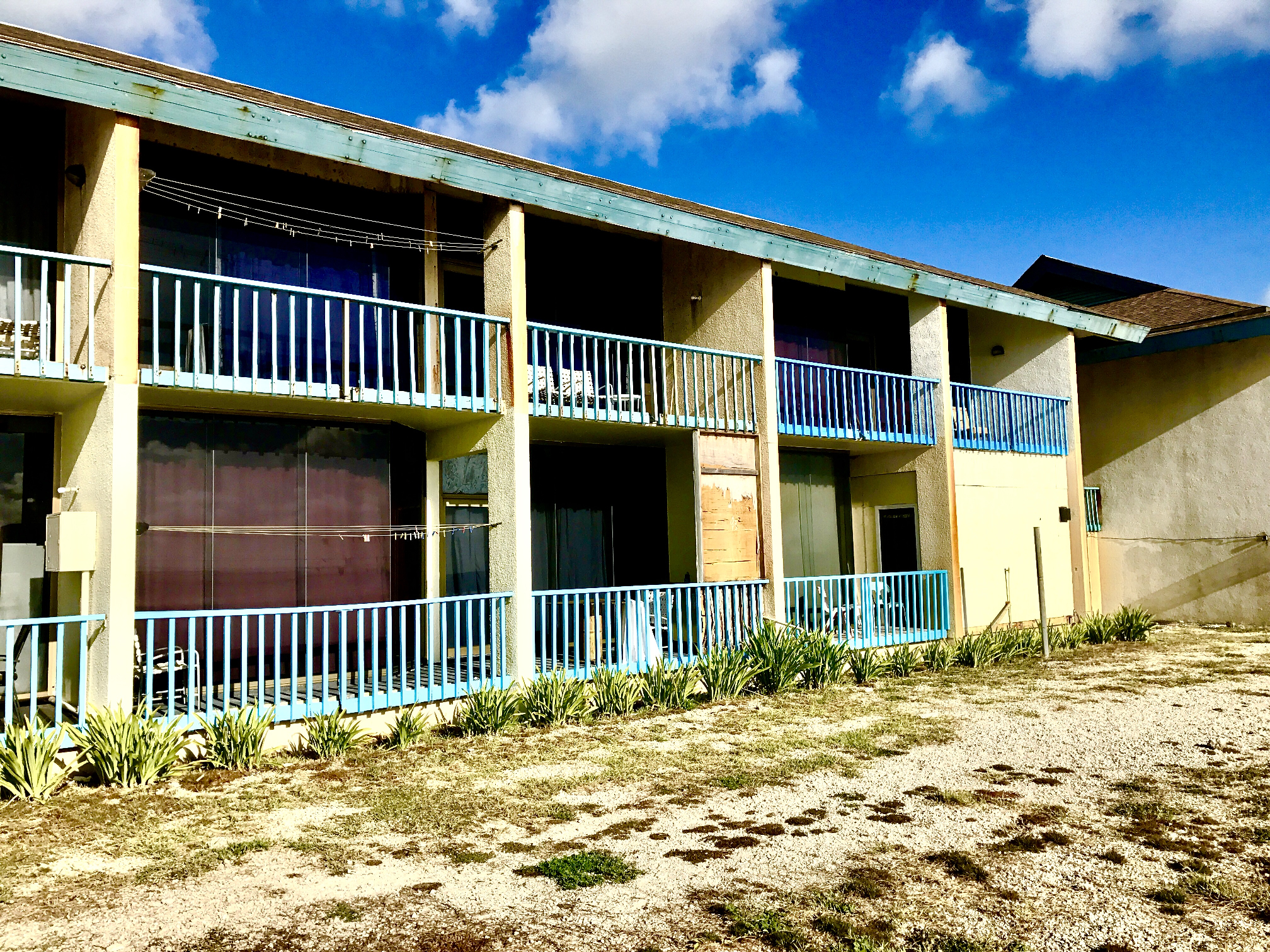
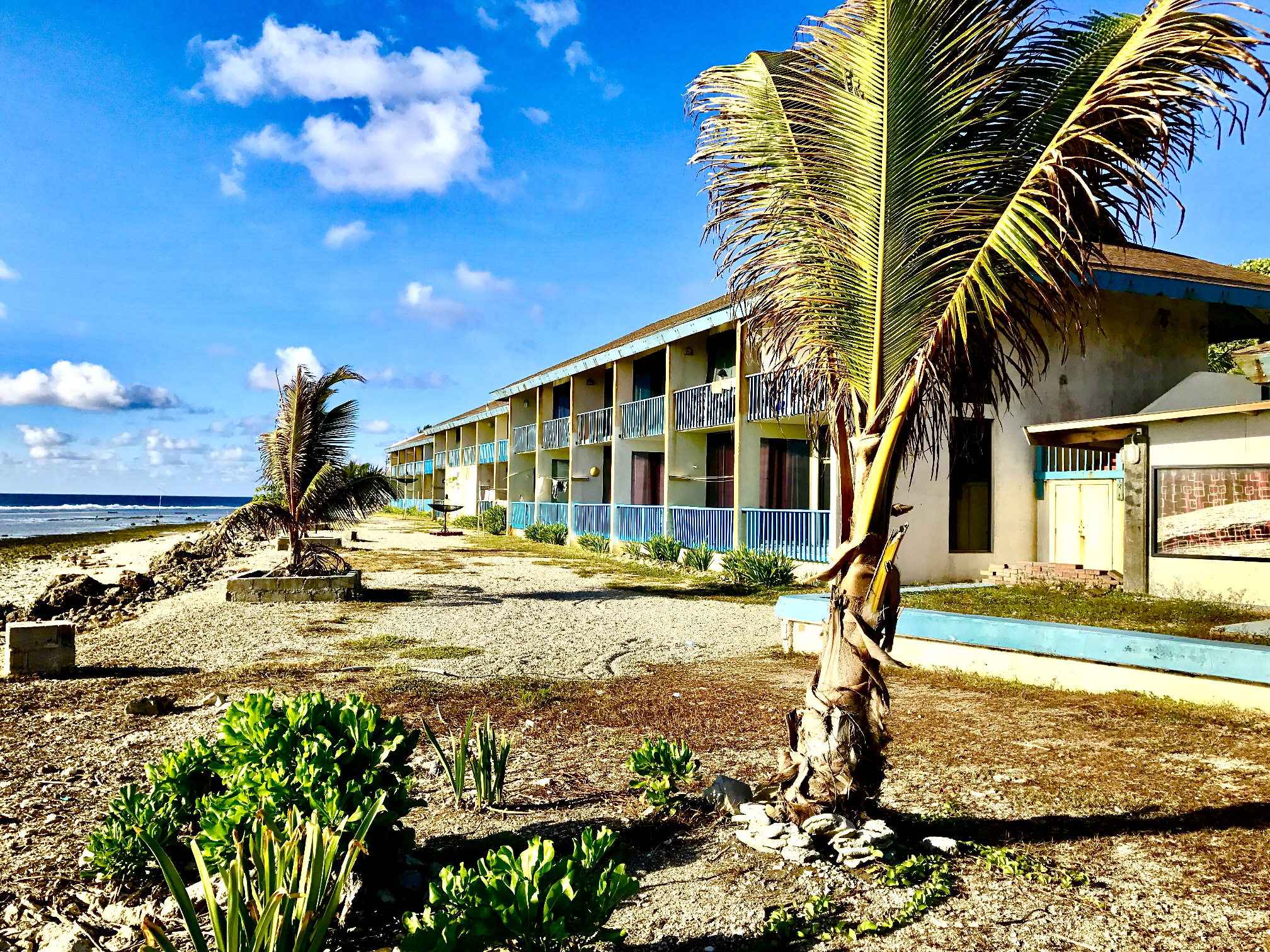
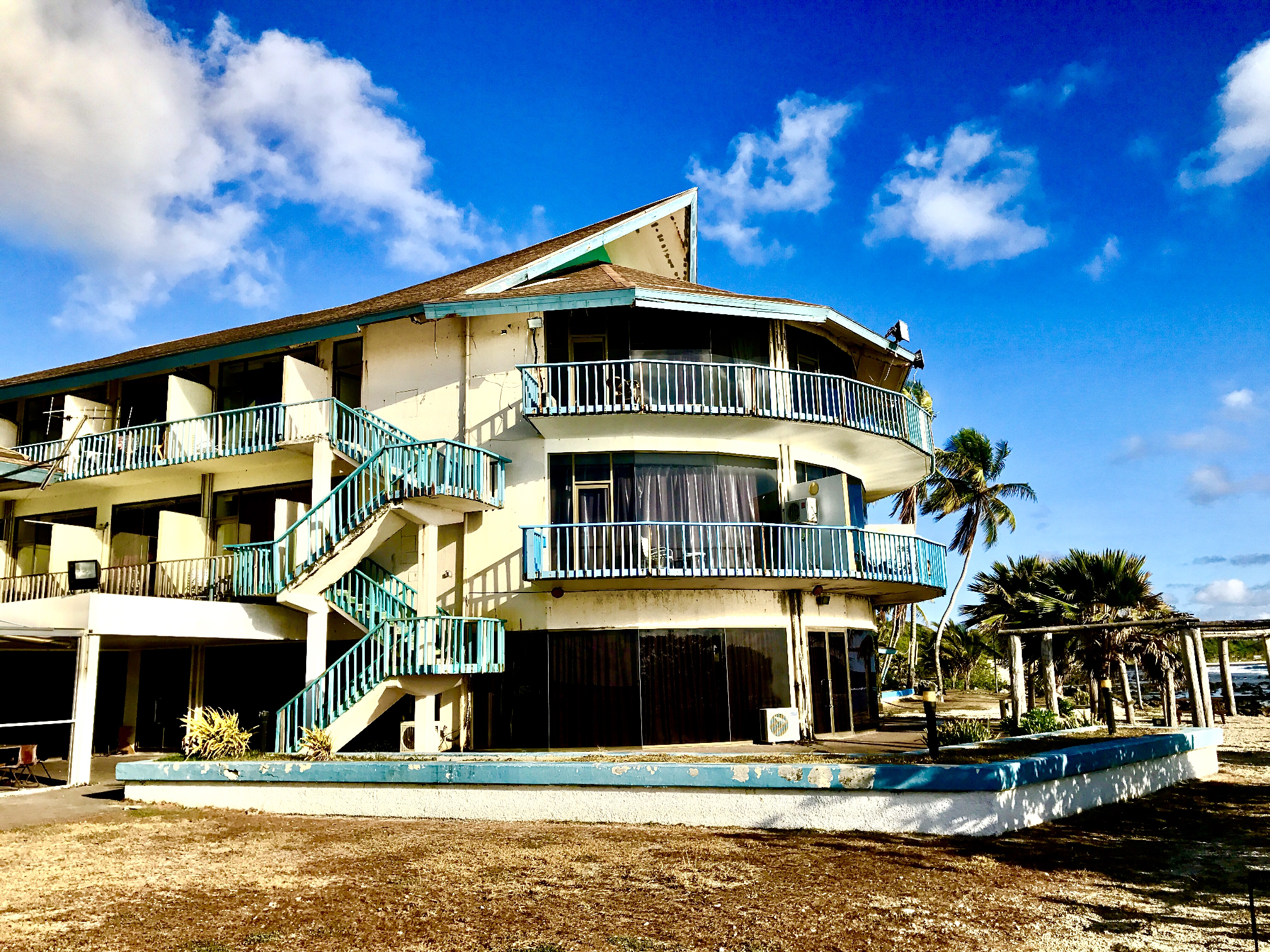
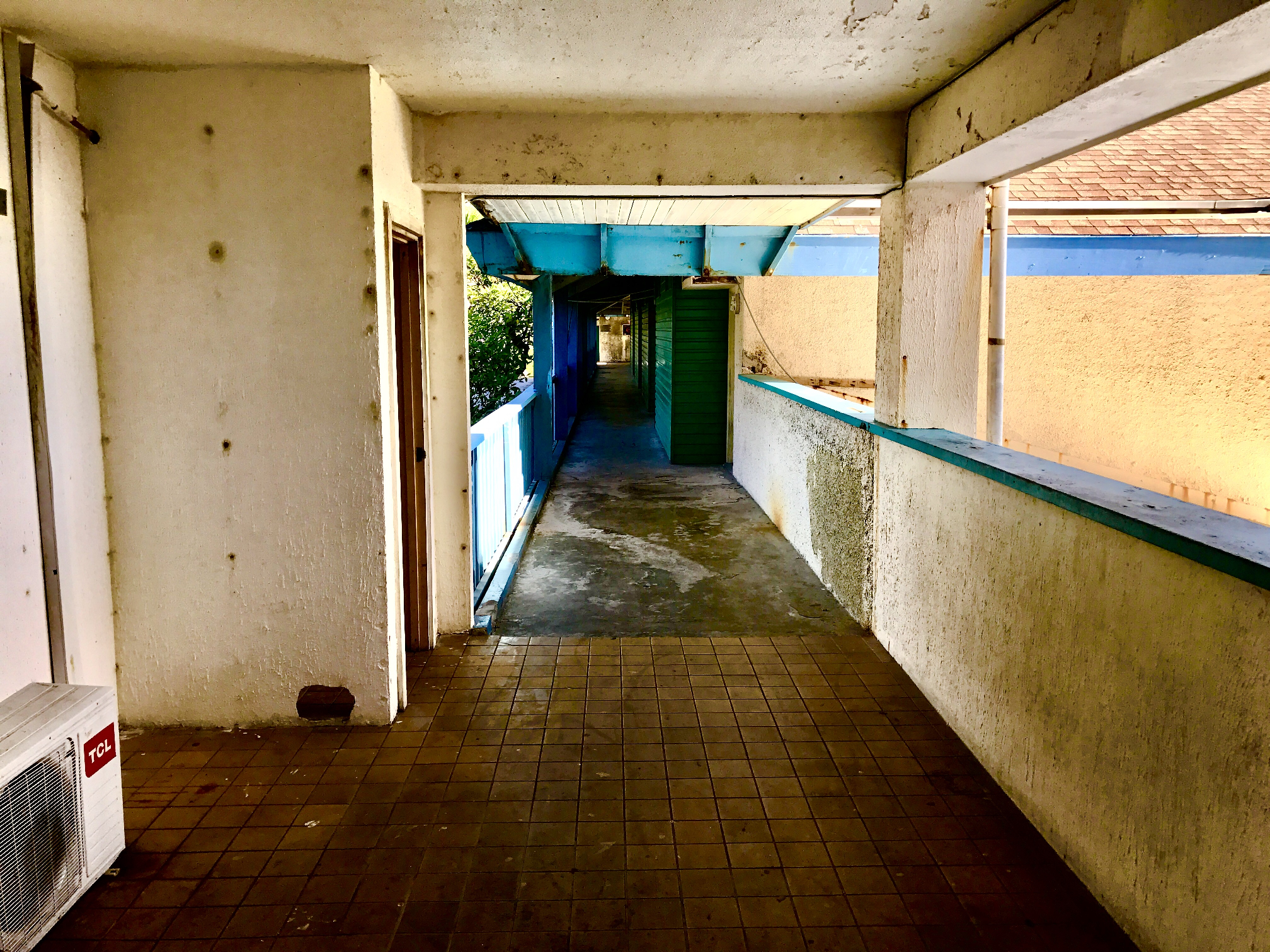
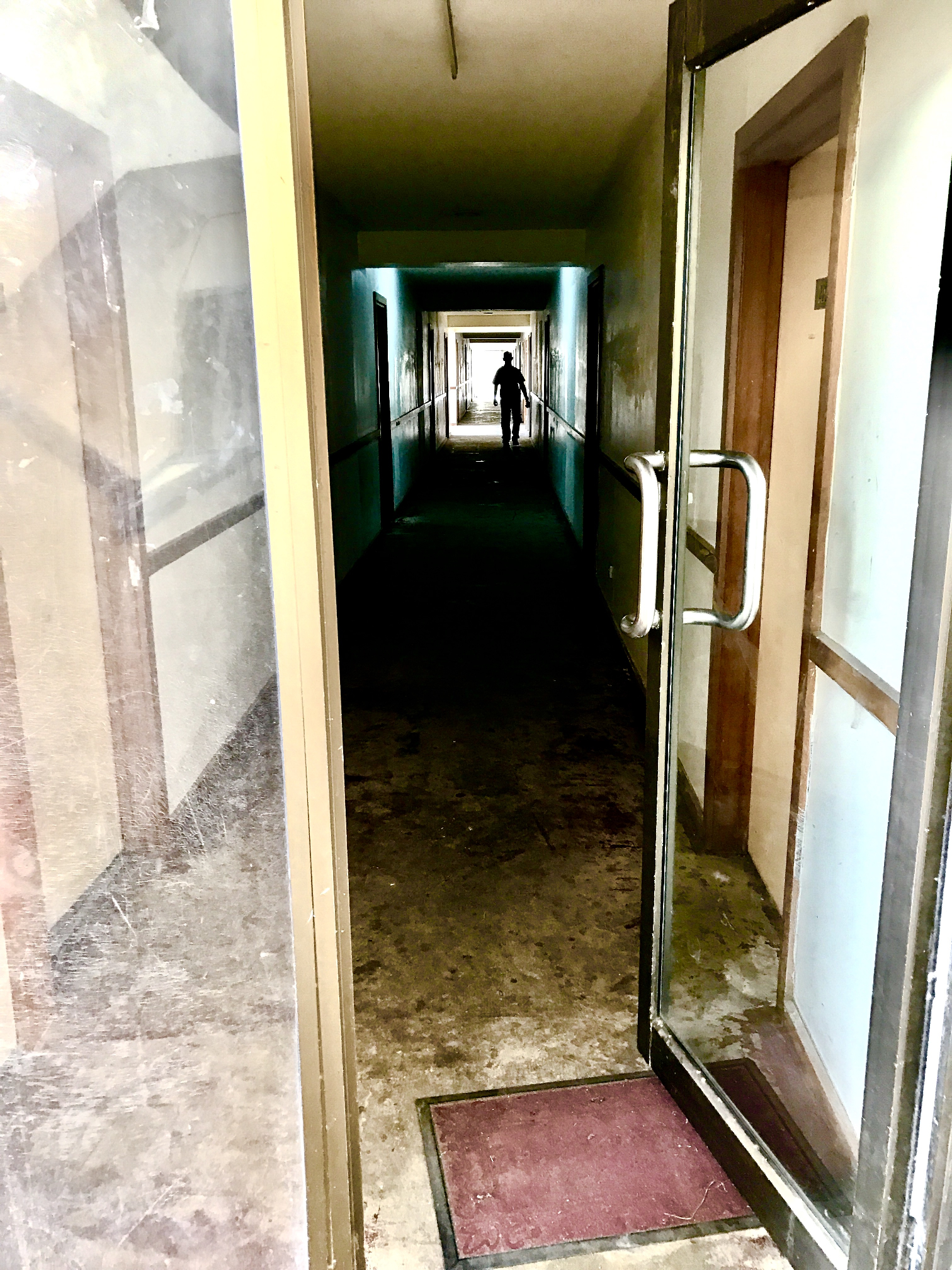
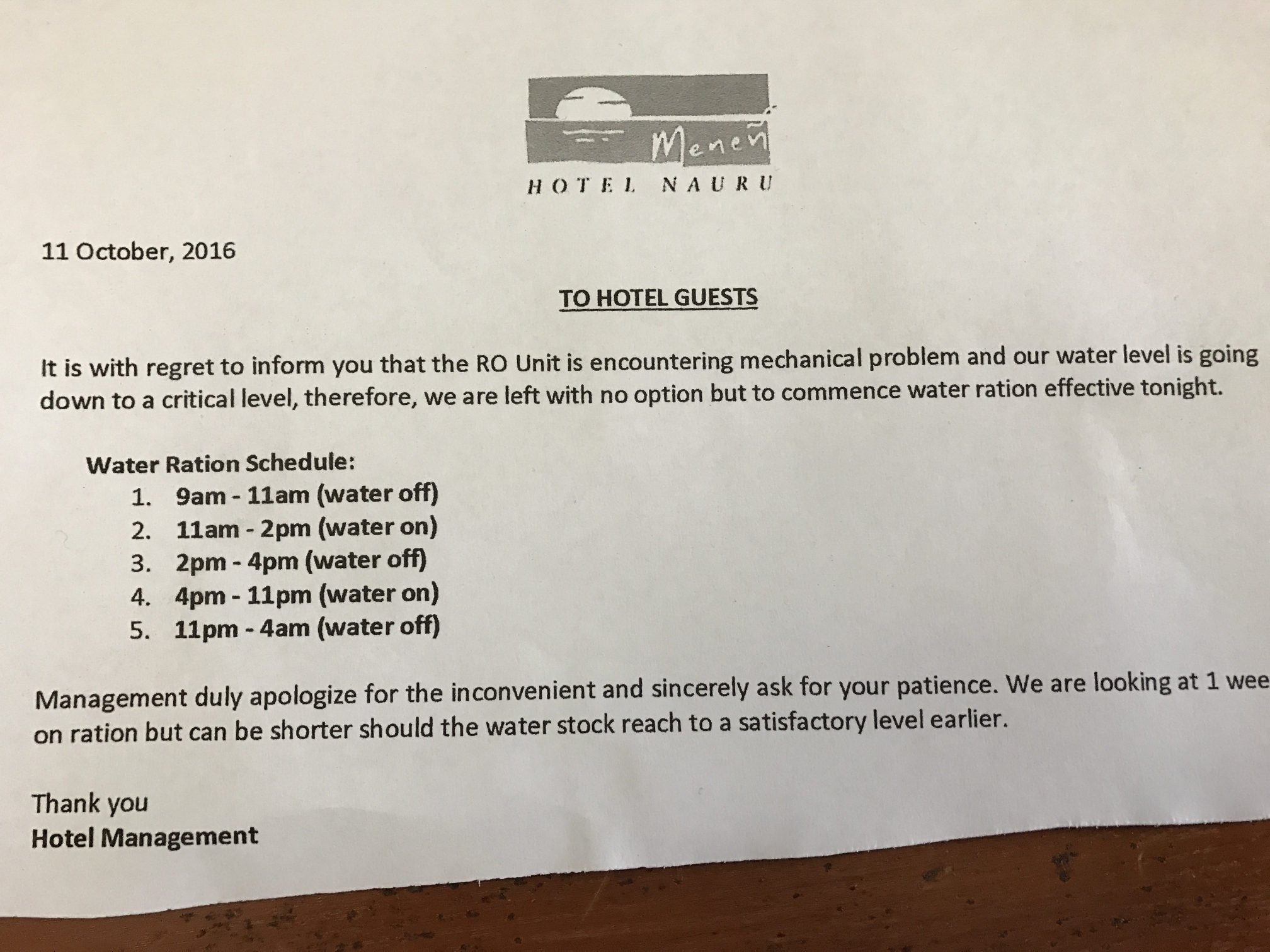
I must say that Fonda made up for the hotel’s condition though. Although kind of quiet and shy, she was very kind and helpful. When I asked her where and how I could rent a vehicle, she quickly jumped on the phone and got to work for me. Twenty minutes later she was knocking on the door to my room with keys to a Toyota Harrier. I later found out it was her family’s personal car. And now it was mine for $80 a day. No contract, no insurance, no inspection. Just cash and I was off. I guess that’s just the way things happen here.
I couldn’t wait to explore. I jumped in my “rental” and began my trek around the island.
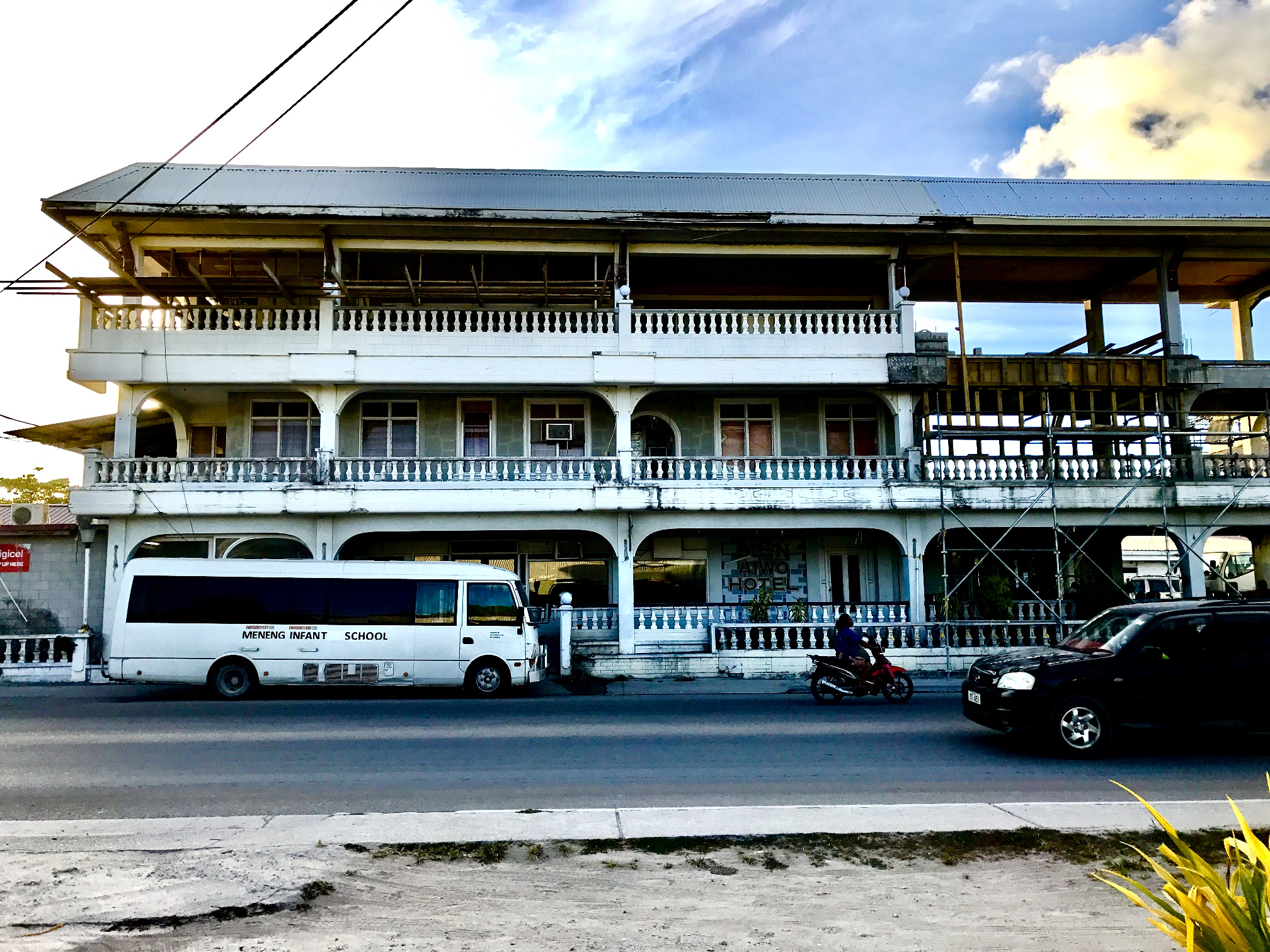
Curious George
The first thing I had to get used to was driving on the left-hand side of the road. What was even more confusing was operating a vehicle with the driver’s seat on the right side. I must have opened the wrong door 15 times that first day. 25 years of opening the door on the left is a tough habit to break. Same with the turn signal. The damn thing was on the right side of the steering wheel in this car. I kept trying to signal using the lever on the left…and that did nothing but turn the wipers on. I repeated this process also 15 times. I must have looked like the nerdiest dude in Nauru. “They’re all laughing at me,“ I thought, as I cruised down the street at seven miles an hour with my windshield wipers on.
I circled the whole island in twenty minutes. Imagine that—driving the entire perimeter of a country in less than a half hour! If I was in better shape, I would have ran it!
I saw so many beautiful and bizarre sites. First, the ocean: insane! Crystal clear waters, but with a twist: Almost all of the beaches had what looked like coral stalagmites shooting up from the water. I’m pretty sure it was phosphate. It looked like I was on another planet; a real life Twilight Zone. I stopped multiple times to park and take photos. The sand was pure white and there were hundreds, maybe thousands of crabs, crawling up and down the pointy rocks. The palm trees looked unreal; straight out a of a 1950s movie set in Tahiti; the one with Elvis singing on a canoe to the local ladies. Was this real?!
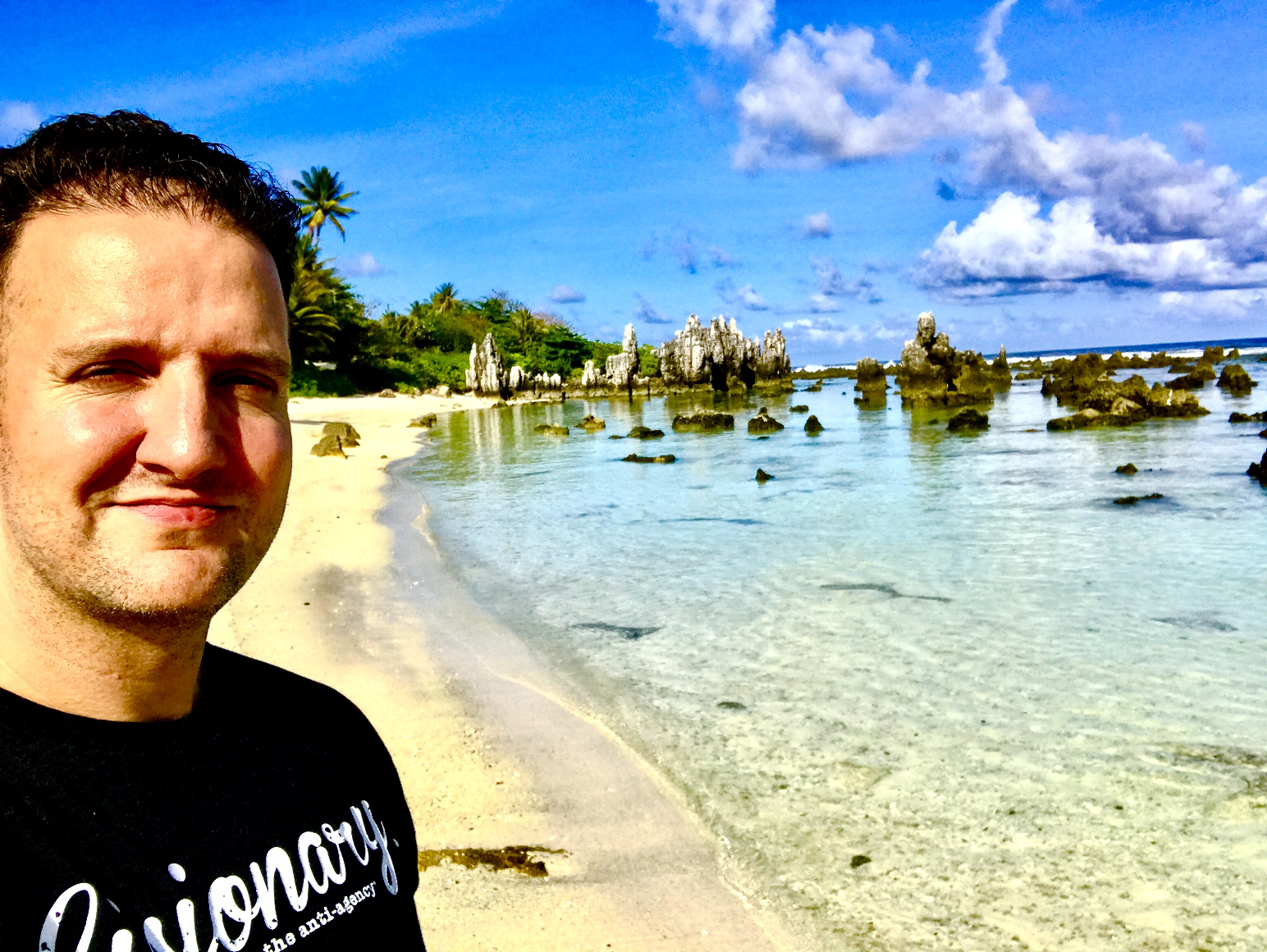
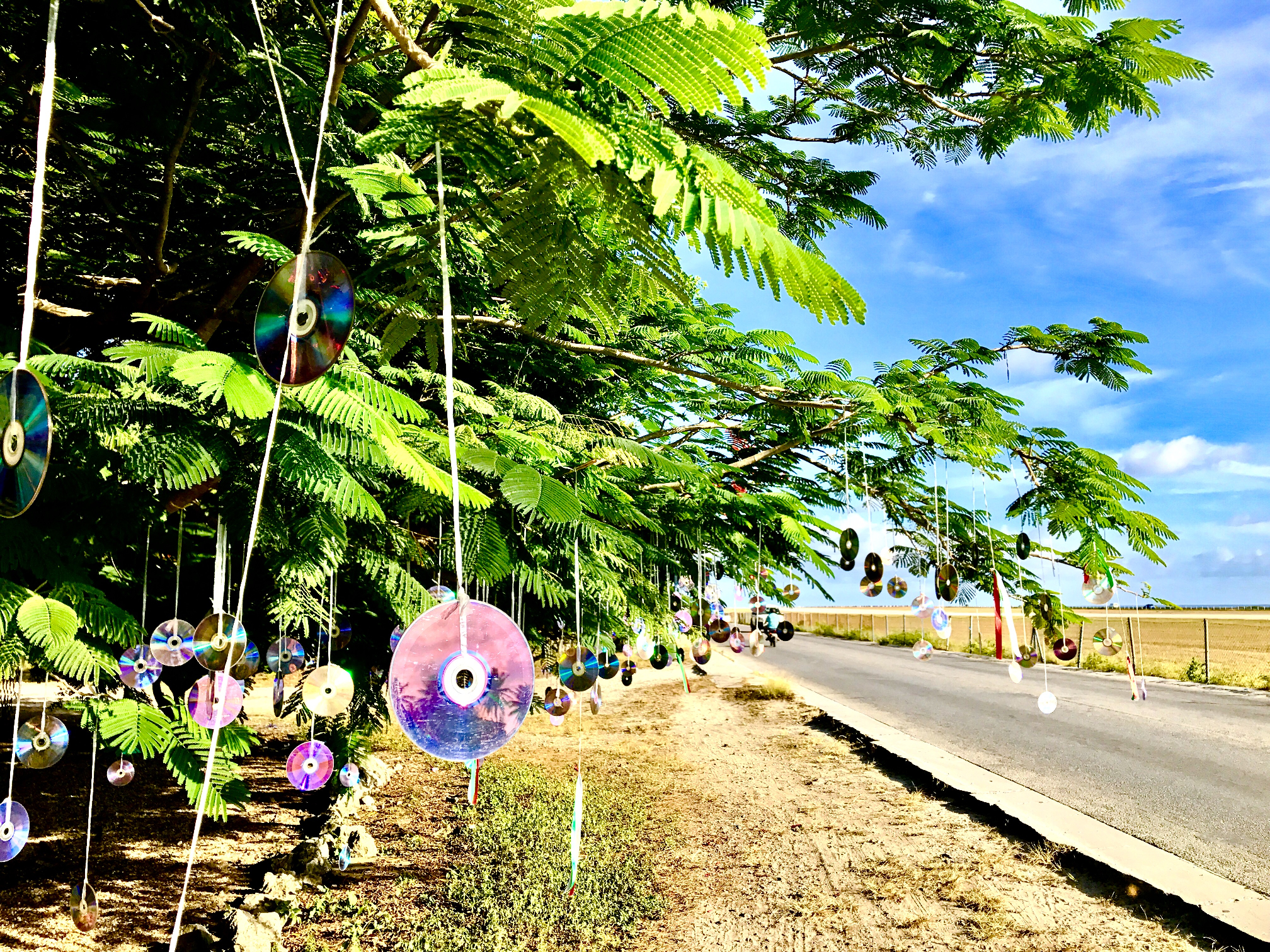
Further down the road I explored one of the beaches that still had tons of old mining equipment left over from the phosphate hey-days of the island. There were gigantic rusting structures, just left behind like disposable garbage by the dicks who pillaged this island for its resources, then got the hell out after they couldn’t squeeze any more juice from the fruit. Giant monster truck-like tires littered the sand, as did an enormous orange sea-buoy that was beached and split open. It looked like a scene from a movie, showing a deserted land years after a nuclear blast destroyed all life. Only there was life: On the other side of a mound of rocks, a family with what looked like 20 kids were frolicking in the water, just having a good old time.
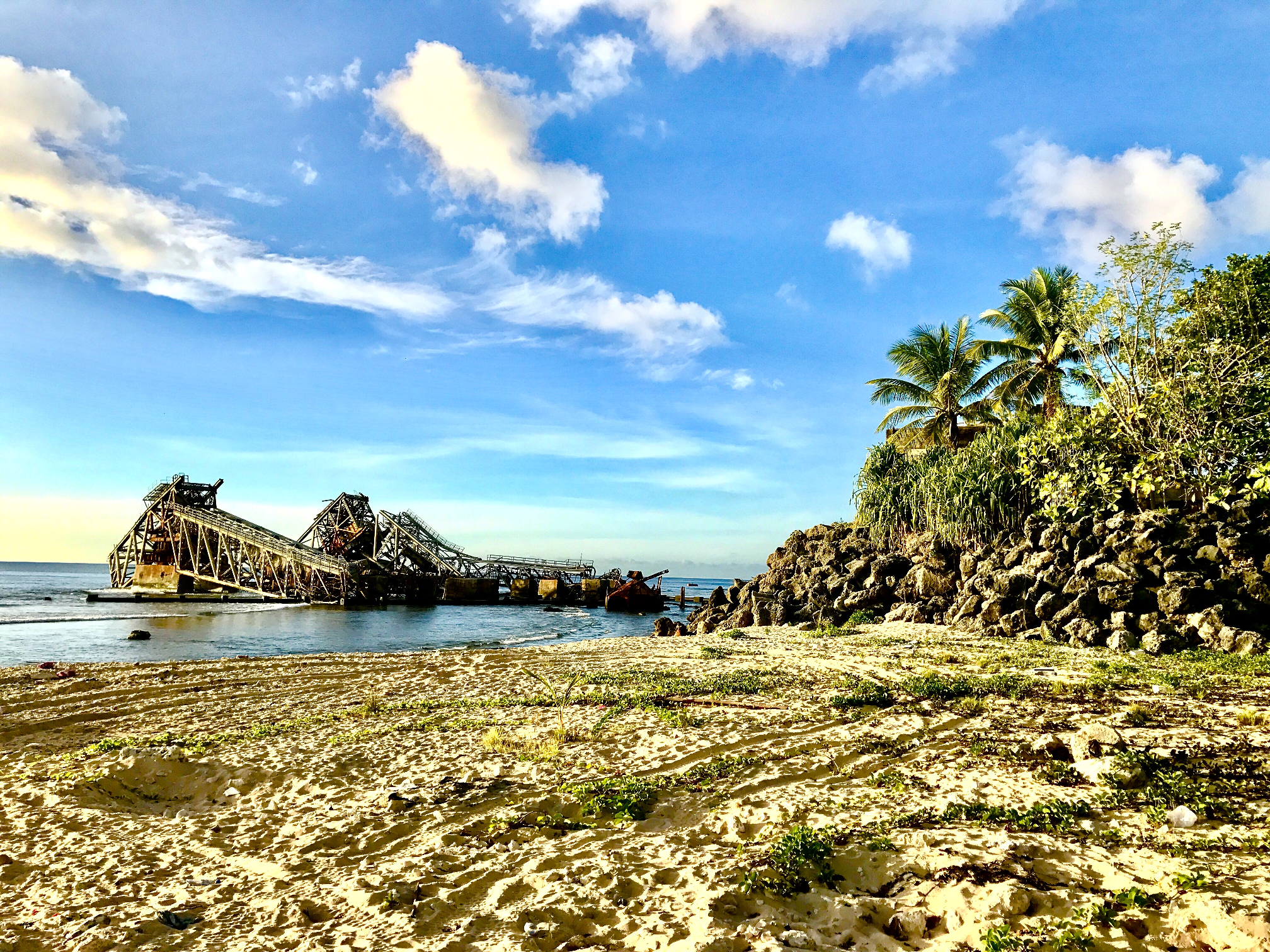
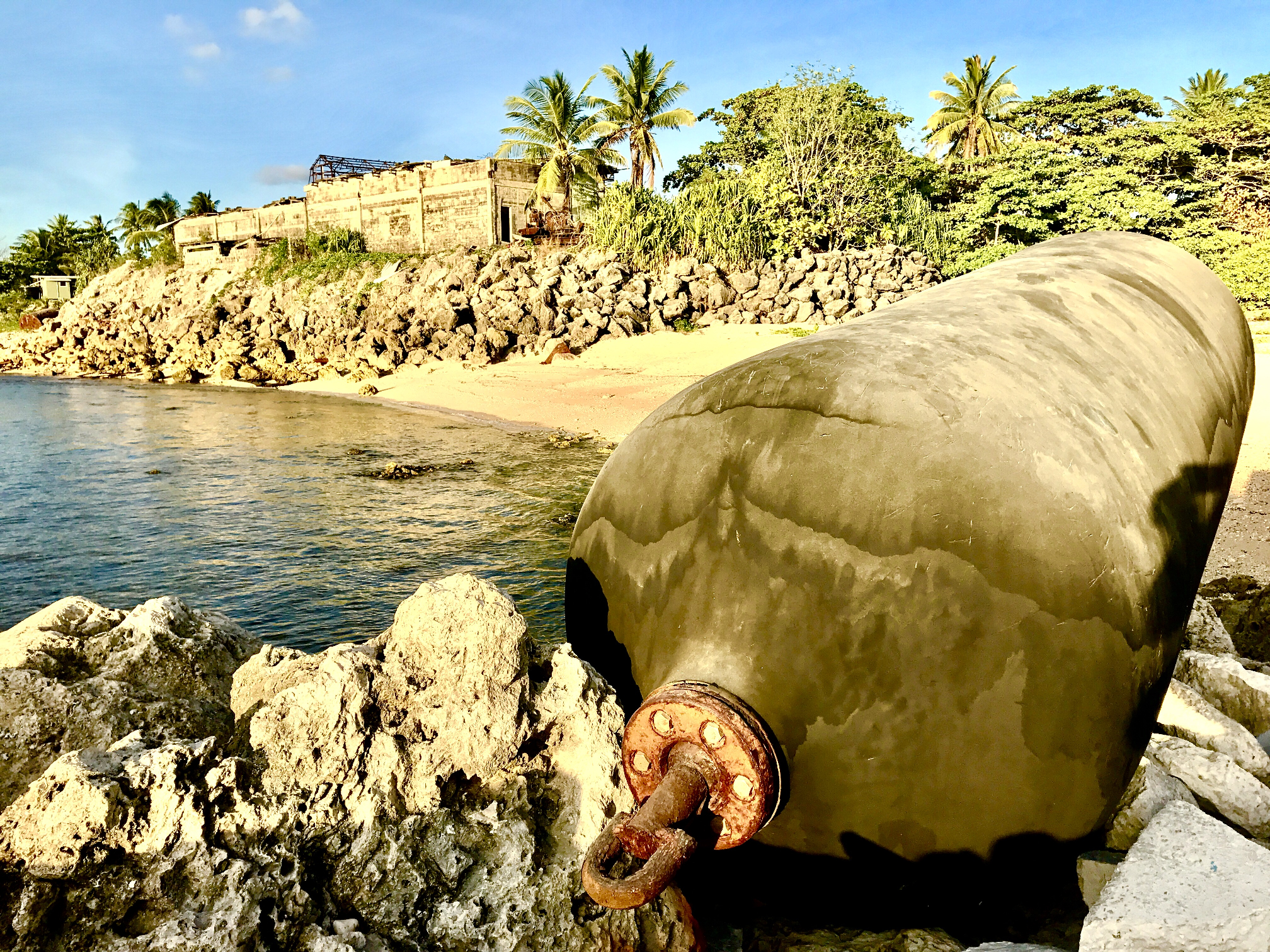
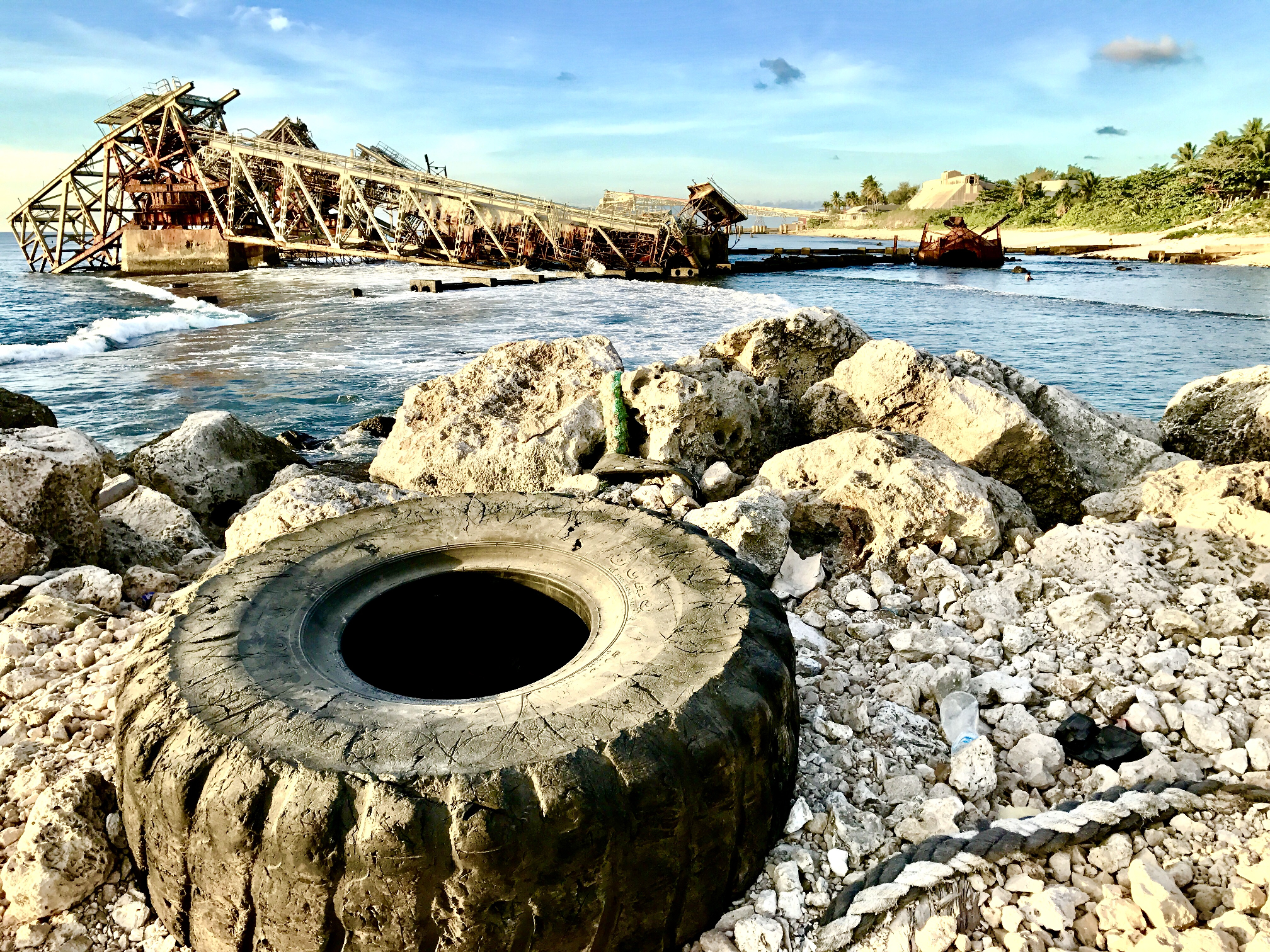
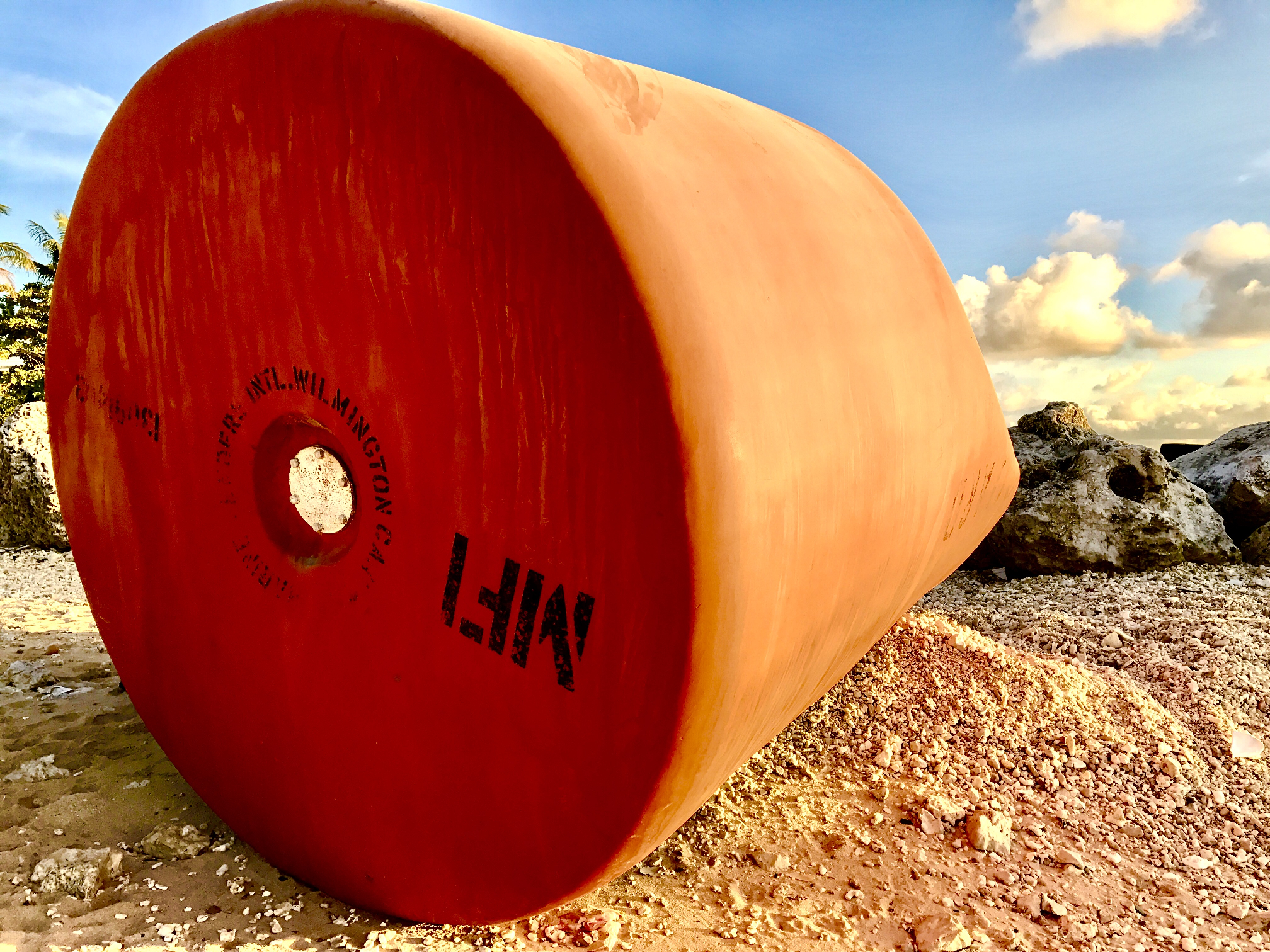
Old shipping containers were everywhere. One was even transformed into a coffee stand: The Container Café served coffee and banana bread.
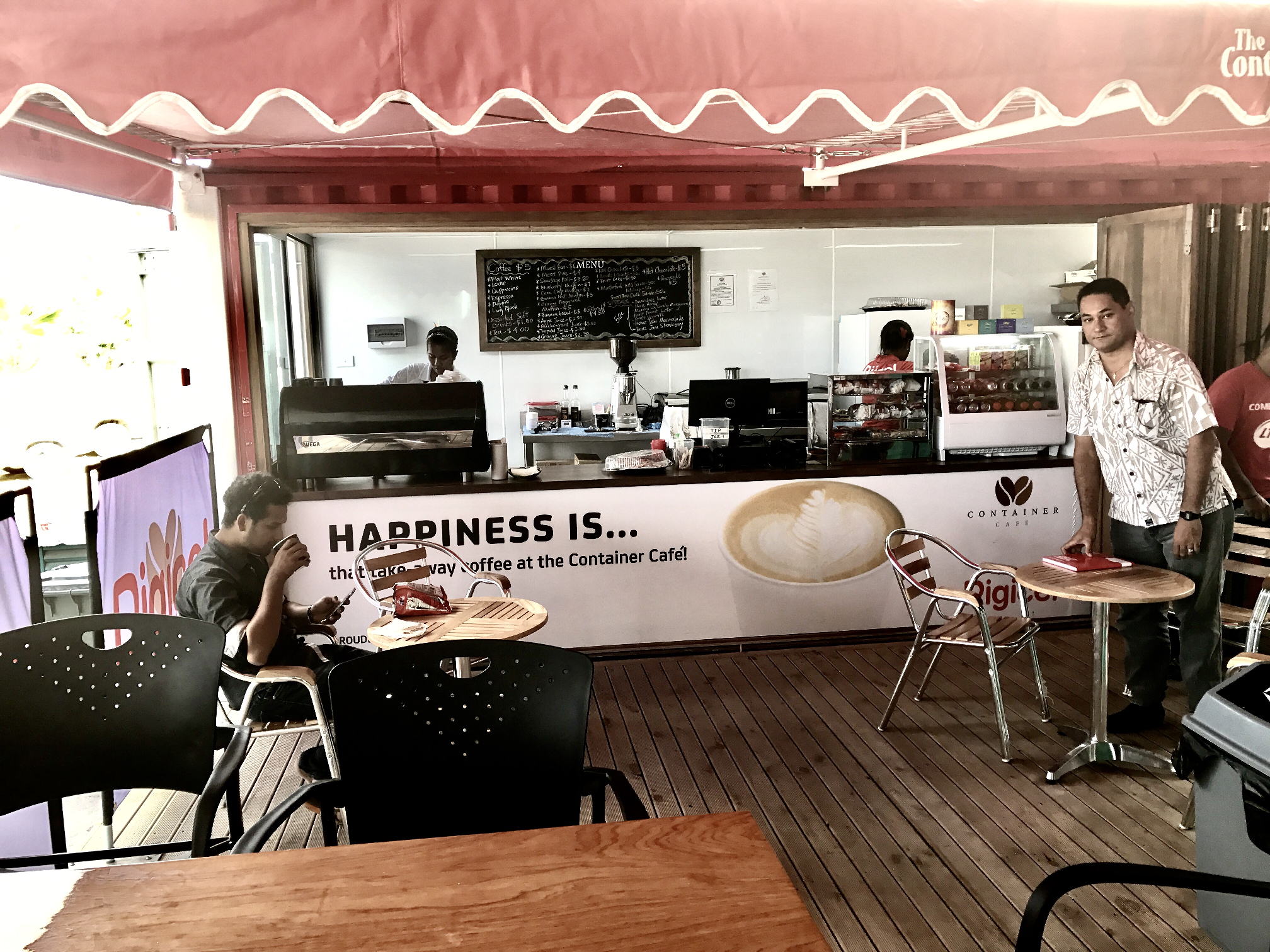
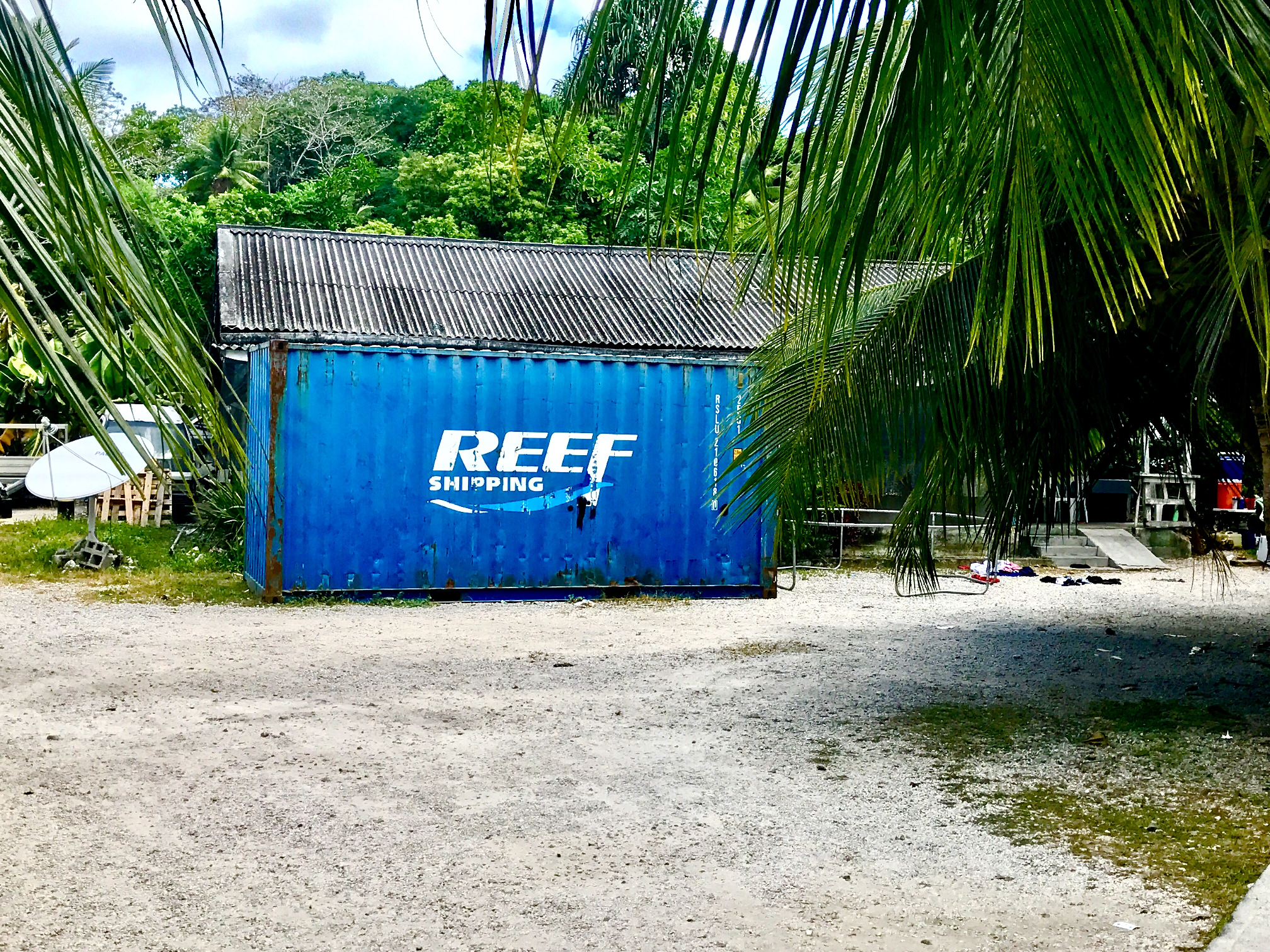
And let’s talk about the kids. They were all playing. All of them! Remember playing? Strange word in 2016, right? The kiddos were actually outside of the house and having fun! Kicking balls, running with sticks, playing with dogs, singing, laughing, and doing what us kids used to do—before video games and social media took over. It was such an awesome thing to see.
Over in a section of town called Anibare, the locals were using a boat launch and harbor as a swimming pool. Tons of kids were in the water—what looked like to be the only patch of water not completely taken over by the beautiful but deadly phosphate spikes. Kids swam and kayaked; there was even a Jet Ski zooming about with three or four kids wildly screaming on the back. There were balloons too. I think it was someone’s birthday party.
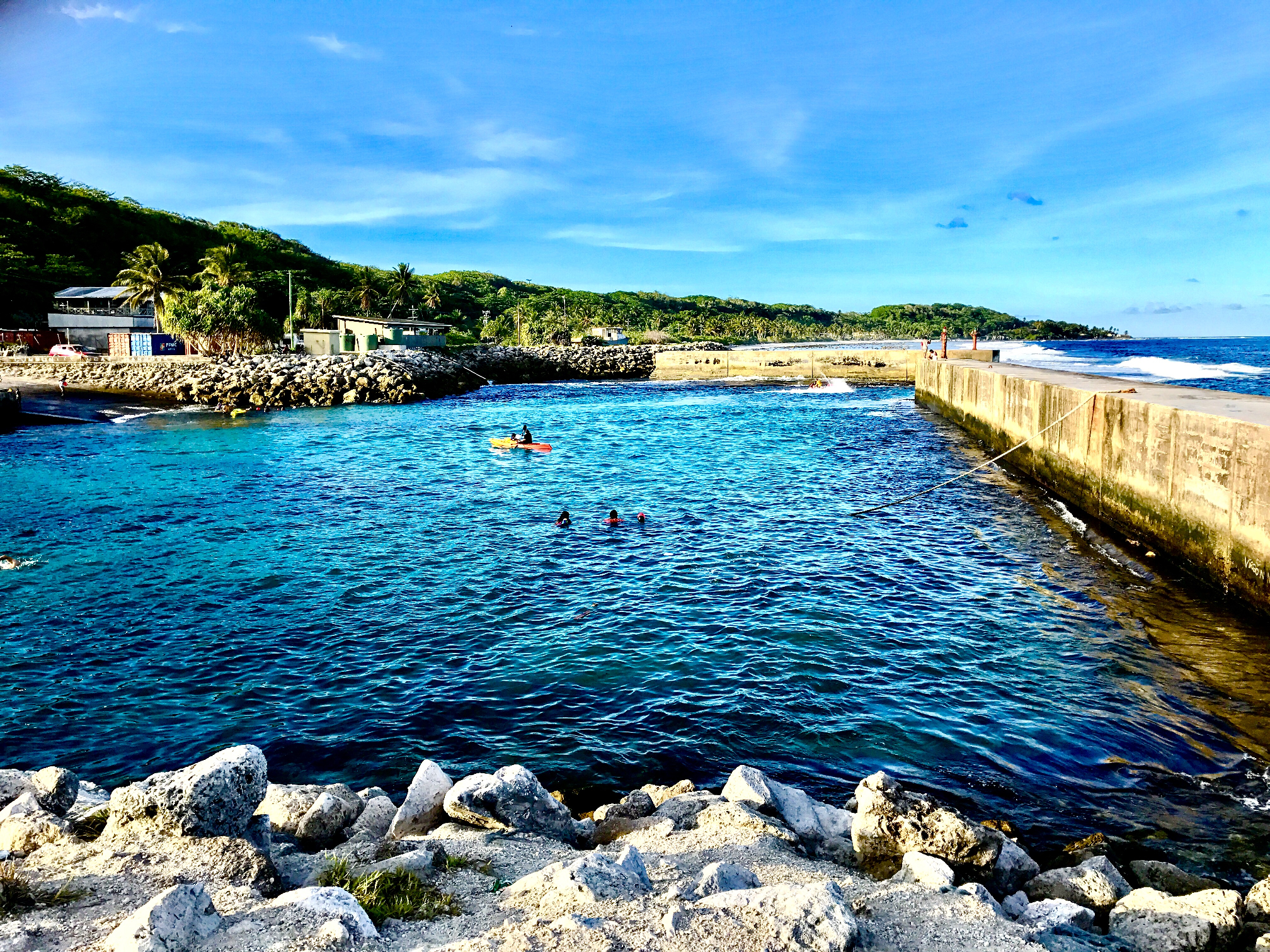
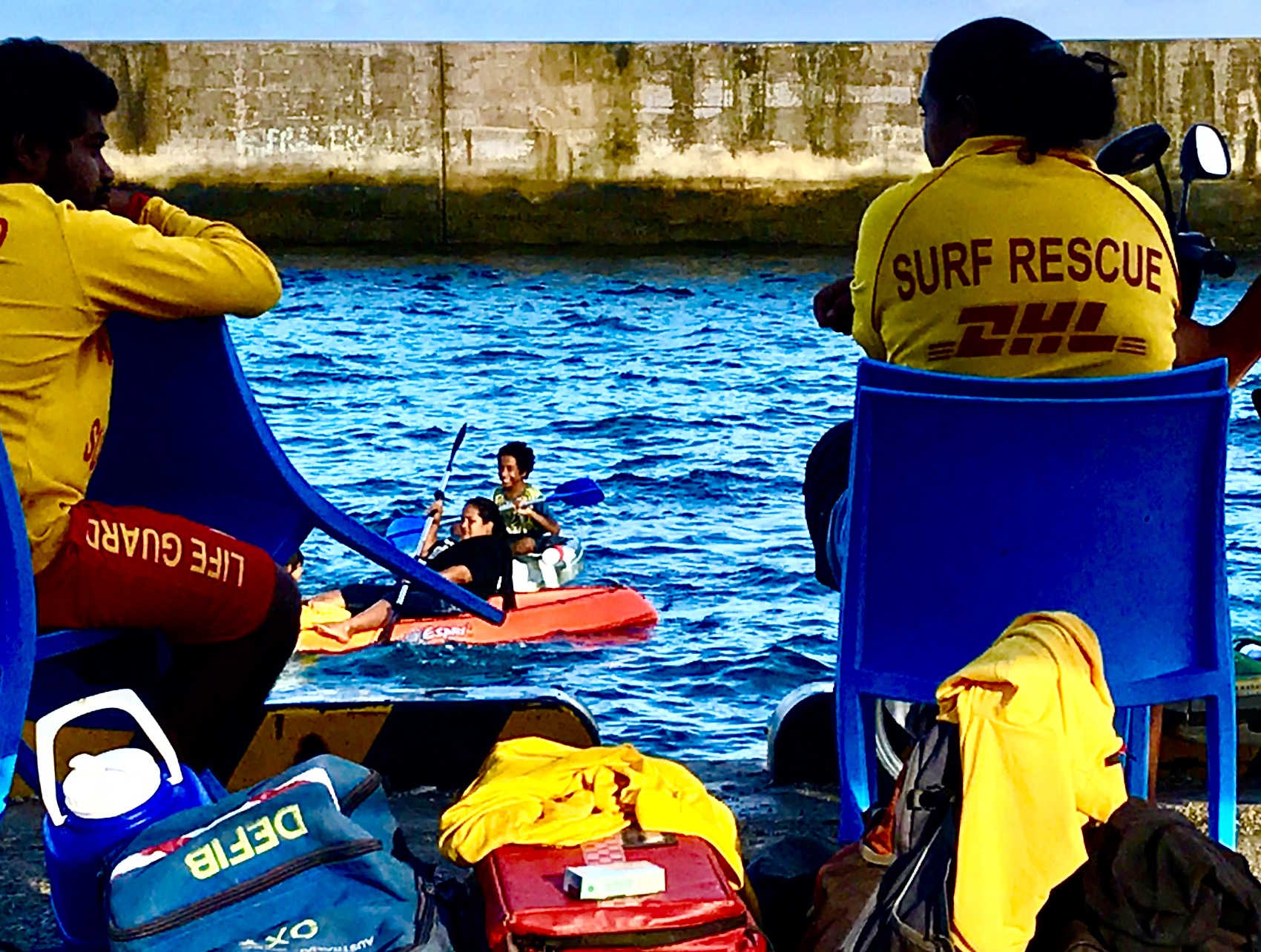
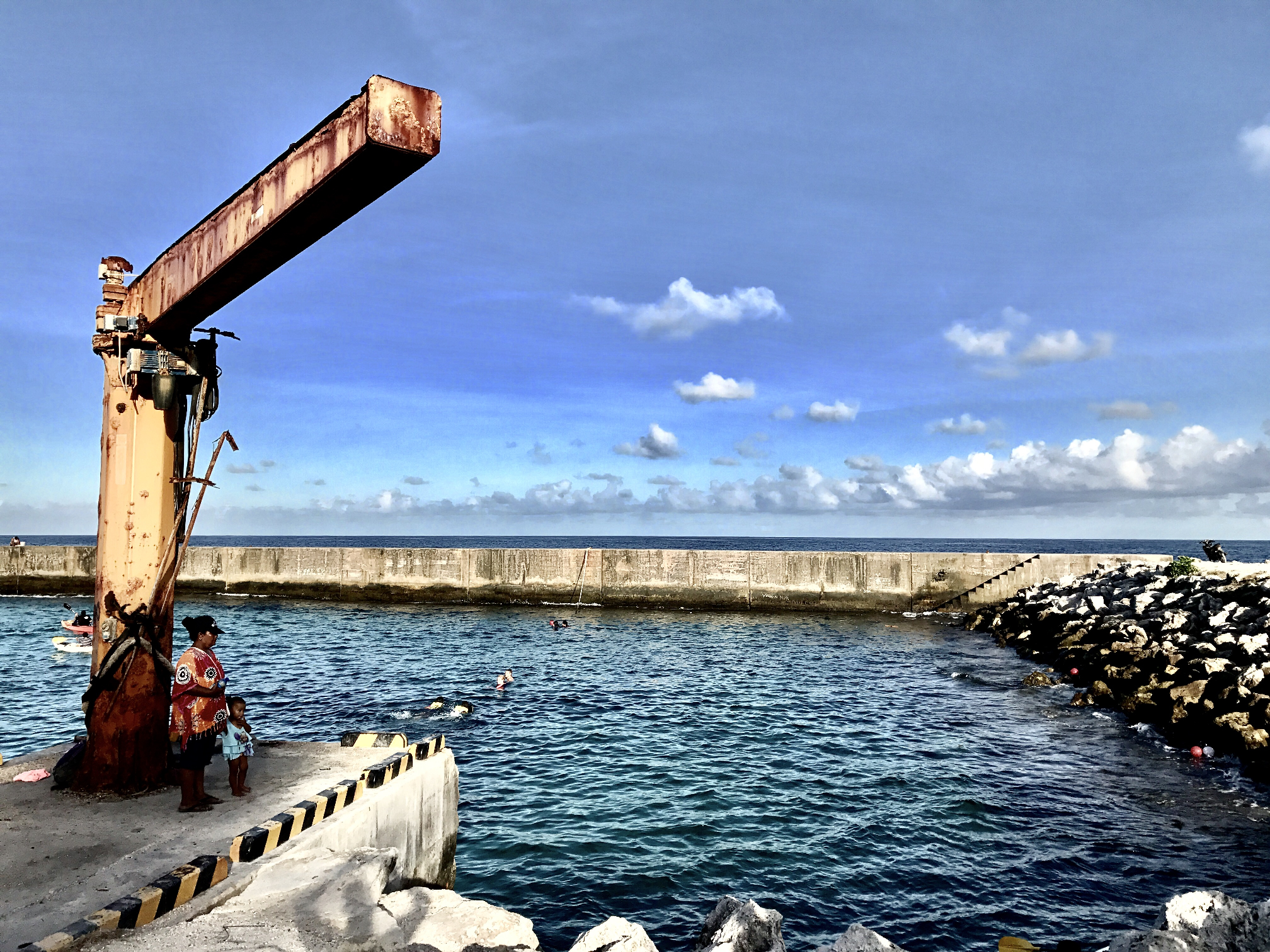
What was most amazing was that I indeed was the only tourist. The area wasn’t spoiled by thousands of douchebags wearing trucker hats and taking duckface selfies. No Starbucks and Louie Vuitton bags. Just people living life. It was just me. And the locals.
And the locals were such beautiful people. Two Nauruan kids saw me taking a selfie and asked if they could join in. I had a trunk full of toys and I wanted to just start handing them out, but I knew the refugees might need them just a little more.
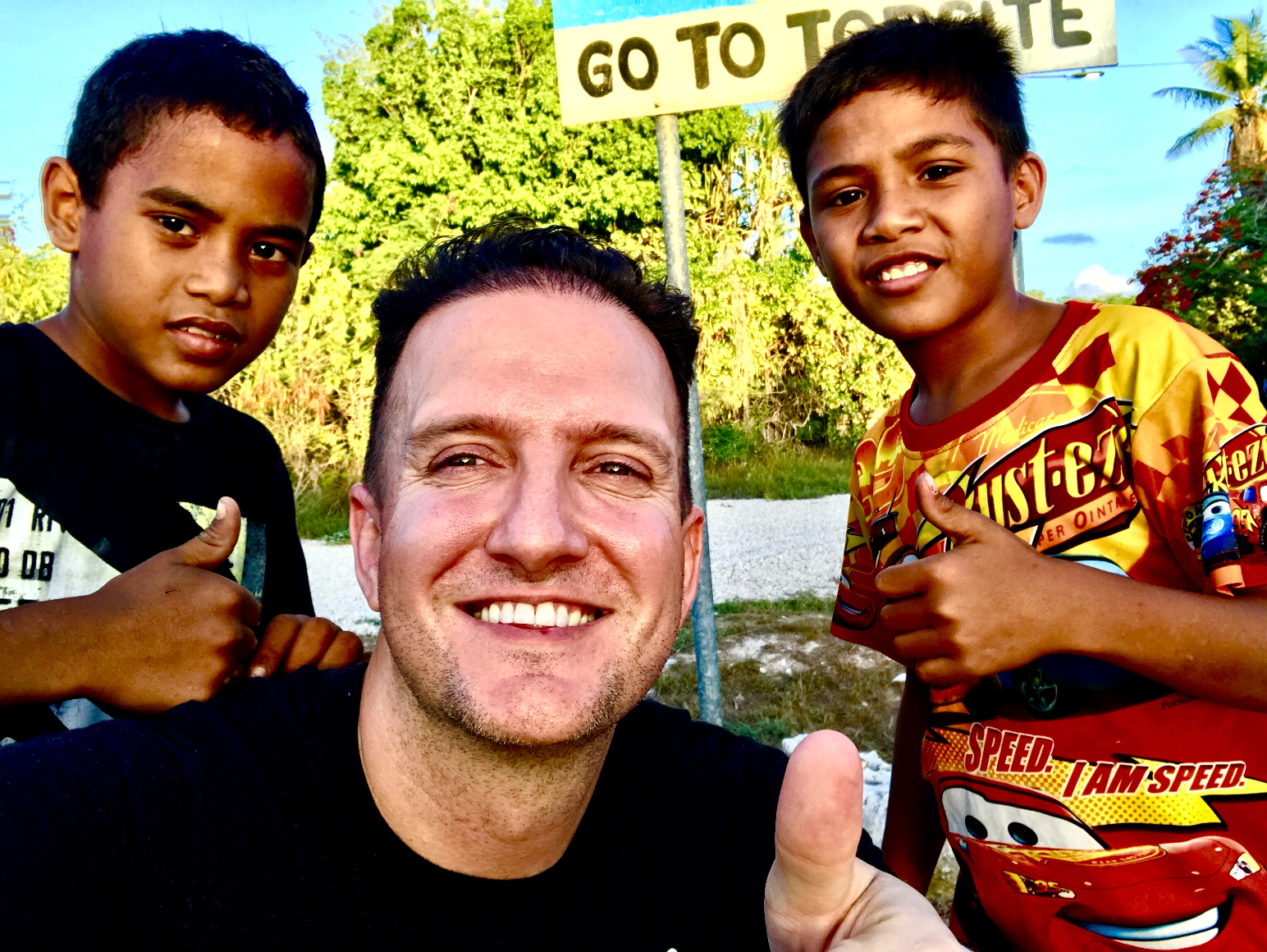
I saw two gringos walking down the street with armband IDs—I recognized the badges from a gentleman on my flight that was wearing one. The IDs identified the people as officers at the refugee camp. I pulled over and asked them if they worked on the island. They were a little stand offish–almost defensive–when I asked if they worked with the refugees. I very respectfully told them I was a tourist and had some toys I’d like to deliver to the refugee children and asked for their advice. They told me I should talk to the Connect office in the Anibare district. I didn’t feel they were particularly fond that I was here and asking about the refugees, so I thanked them and I was on my way. I later found out that Connect was a foreign and independent social services organization, operating on the island to help the refugees and provide them with support and various services.
I couldn’t quite figure out the whole vibe on this refugee thing. At times the island felt like some secret Area 52 scene, where outsiders who asked about the situation might suddenly disappear. But on the other hand, I had heard that the refugees were free to move about the island, so maybe it wasn’t so secretive. When I was booking the trip, I did read that Australians and New Zealanders were no longer allowed to visit the country, and the fee for a journalist visa was a staggering $8,000! Something wasn’t right.
I had fun poking around the little stores. The first one was a gas station/mini market, owned by a Chinese man named Cao. He knew very little English, but enough to understand that I needed a power outlet adapter and to tell me he was from China when I asked.
The second store I visited was Capelle & Partners. This is what department stores in 1948 must have looked like; just the bare basics, with wooden, hand-painted signs designating which products were located in which aisles. I bought mosquito repellent and a big can of bug spray to combat any unwelcome visitors in my hotel room. (I ended up seeing one spider and when I tried to hit it with a shoe, it “flew” away! Oh hell no…I needed some ammo!)
Nauru Nights
There were dozens of restaurants all over the island that were actual houses and shacks. I would have loved to say that I was brave enough to try one of them, but alas, I opted to stop in at a place that was probably the nicest in town: The Bay Restaurant. The manager shook my hand and welcomed me to Nauru and I threw down an amazing curry lamb plate with an Australian Pure Blonde beer to wash it down.
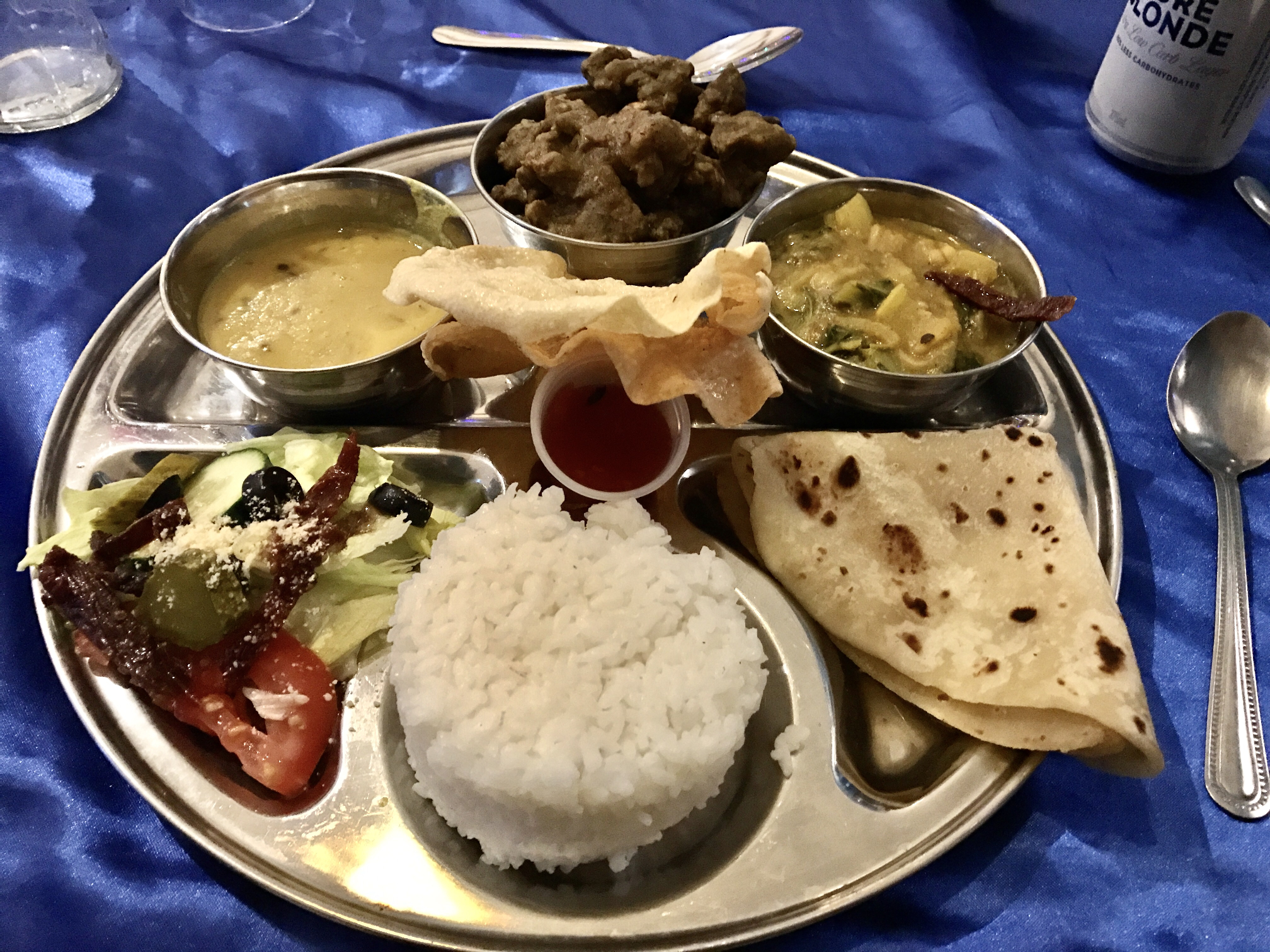
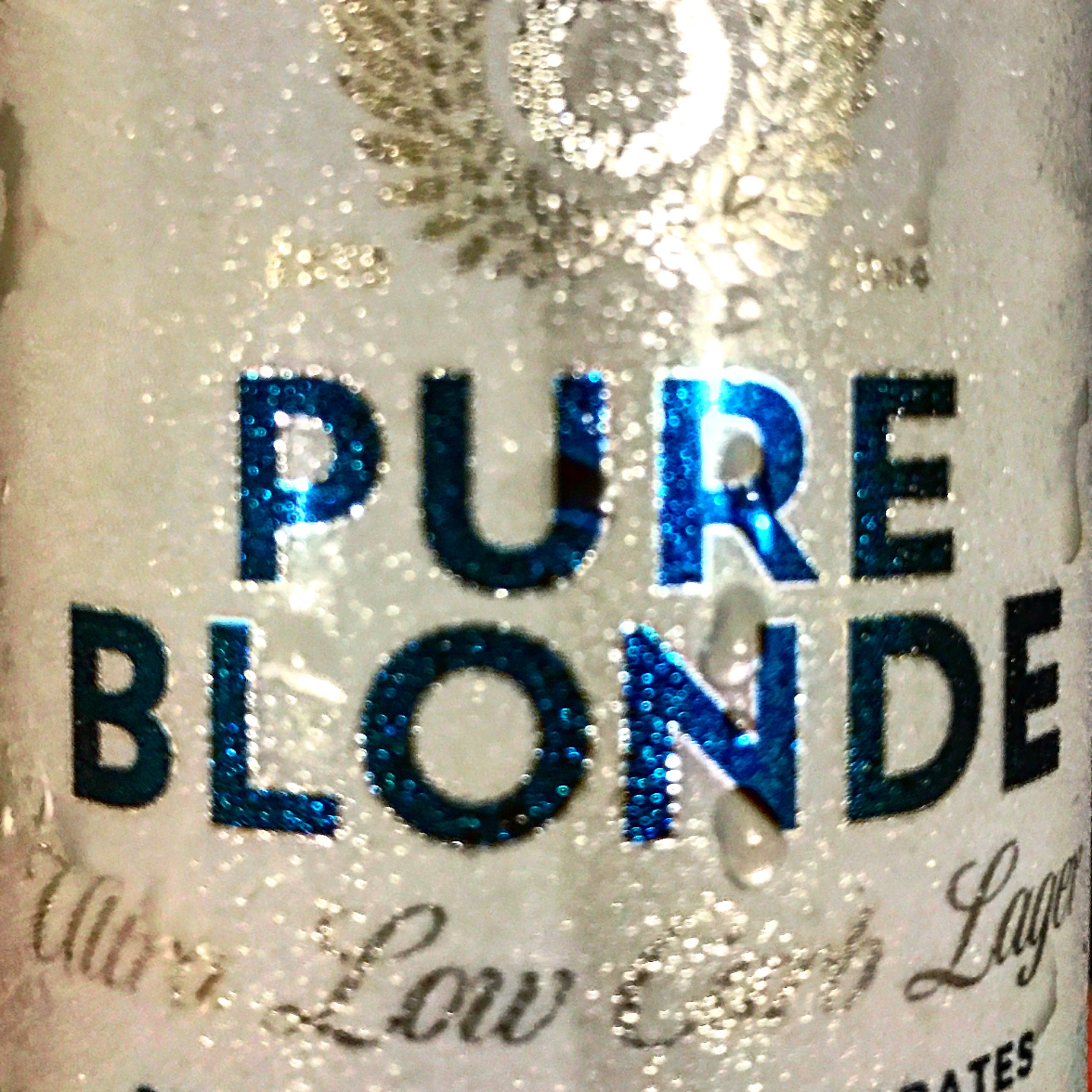
The highlight of the evening was bumping into one of the locals at a bar after dinner. Cletus was a dark skinned, jolly giant. He must have been 350+ pounds and one of the gentlest souls you could ever know—straight out of a Disney movie (I’m thinking of the character “Maui” in Moana). He was enchanted that I was from California and soon worked up the courage to ask (very shyly and respectfully) if he could ask me a question about America. I said, “Of course,” knowing this would then allow me to quiz him about Nauru. His first question was about Donald Trump, and from then on Cletus became my BFF in Nauru. I showed him my picture with Bruno Mars, but he said he didn’t know who that was. He did however know who Jennifer Lopez and Justin “Buy-Berr” were. So funny he calls him Justin Buy-Berr.
We chatted the entire night. I taught him about lowriders and tacos, and he answered all of my questions (I had a ton) about Nauru, its people, and the new visitors—the refugees. Turned out he used to work as a security guard at the refugee camp and answered most all my curiosities. He confirmed that the refugees were free to travel about the island. Many of them even owned and operated businesses on the island. He noted that some of the refugees even partnered up with local Nauruans and procreated. It was all so interesting. Throughout the evening he discretely pointed out who in the bar were refugees: a handful of patrons and even an employee. Finally, I asked if it would be okay to approach one of the refugees—a young man—and introduce myself. Cletus approved.
Adnan was an early twenty-something refugee from Iran. I didn’t ask specifics, just introduced myself, and told him I had some toys for the refugee children and asked if he would help me get them into the right hands. We set a time to meet the next night, at The Bay Restaurant. He was dressed nice, and even had a mobile phone. Now I had more questions then ever. They’d have to wait.
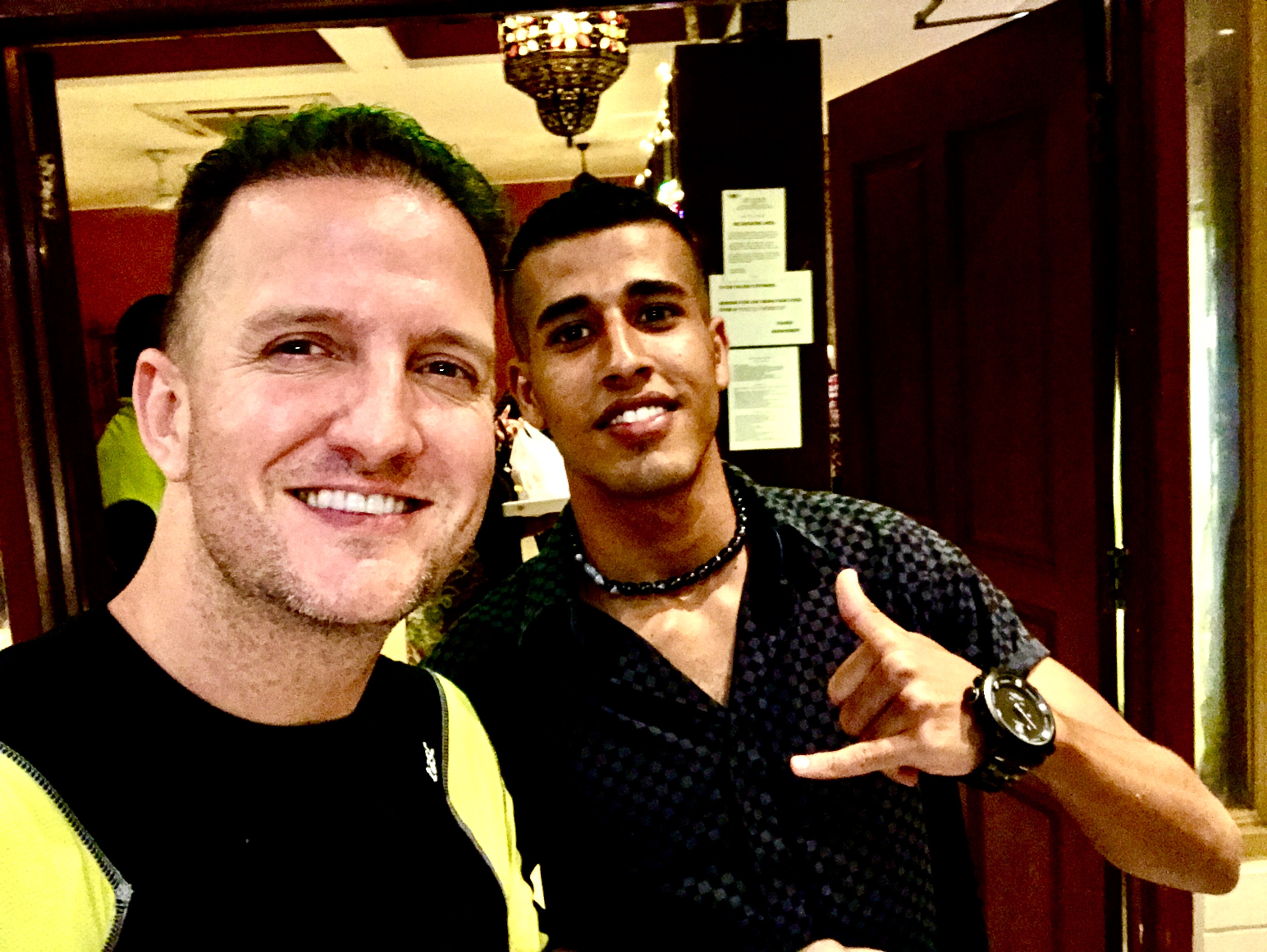
Against my better judgment and lifetime knowledge that you’re never supposed to give rides to strangers, I gave Cletus a ride home that night. During our convo, I had asked him where the island’s only radio station was, and he offered to show me when he finished work—and also asked if I could drop him off at his house after. How could I say no?
At 10 O’clock I settled up with the restaurant and Cletus and I were off to see where the radio station was located. Across from the airport, we drove down a narrow, gravel alley, between a primary school and a government office, before we reached Radio Nauru FM 105. I’d attempt to tour the station the next day; tonight I just wanted to see where it was located. I would’ve never found it on my own.
I successfully dropped Cletus off at his house without getting murdered, so that was cool. Joking aside, he’s a really cool dude, and asked me not to use his name if I wrote about him…hence the “Cletus” fictitious name. He shared a ton, but talked quietly and asked not to be identified–as if he wasn’t supposed to be giving this info to an “outsider.”
Driving back to my hotel, I was surprised that most of the Chinese stores were open—doors open and insides lit up. The whole “Chinese store” thing peaked my curiosity. Why didn’t the Nauruans own most of the stores? How long have the Chinese been here, and how did they find Nauru? All very fascinating to me.
I arrived back at the Menen and had a good night’s sleep, though my mind was racing from everything I took in that first day in Nauru.
Day Number Two
The next day I was up and at ‘em and out the door. This was my only full day in Nauru and I didn’t want to miss anything. I was on the hunt for a belt (my only pair of shorts on this trip kept falling down), snorkel gear (I thought I’d take a plunge in Anibare Bay) and I needed a car-USB charger, to keep my iPhone on. It had died last night, just as I was about the capture the most amazing sunset ever; with silhouettes of kids playing on the coral. It was an amazing scene and I missed capturing it.
The first stop was the biggest plaza on the island, where a supermarket and the island’s only bank and post office were located. It was also the country’s “civic center” and there was a Chinese embassy on the upper level. All so random!
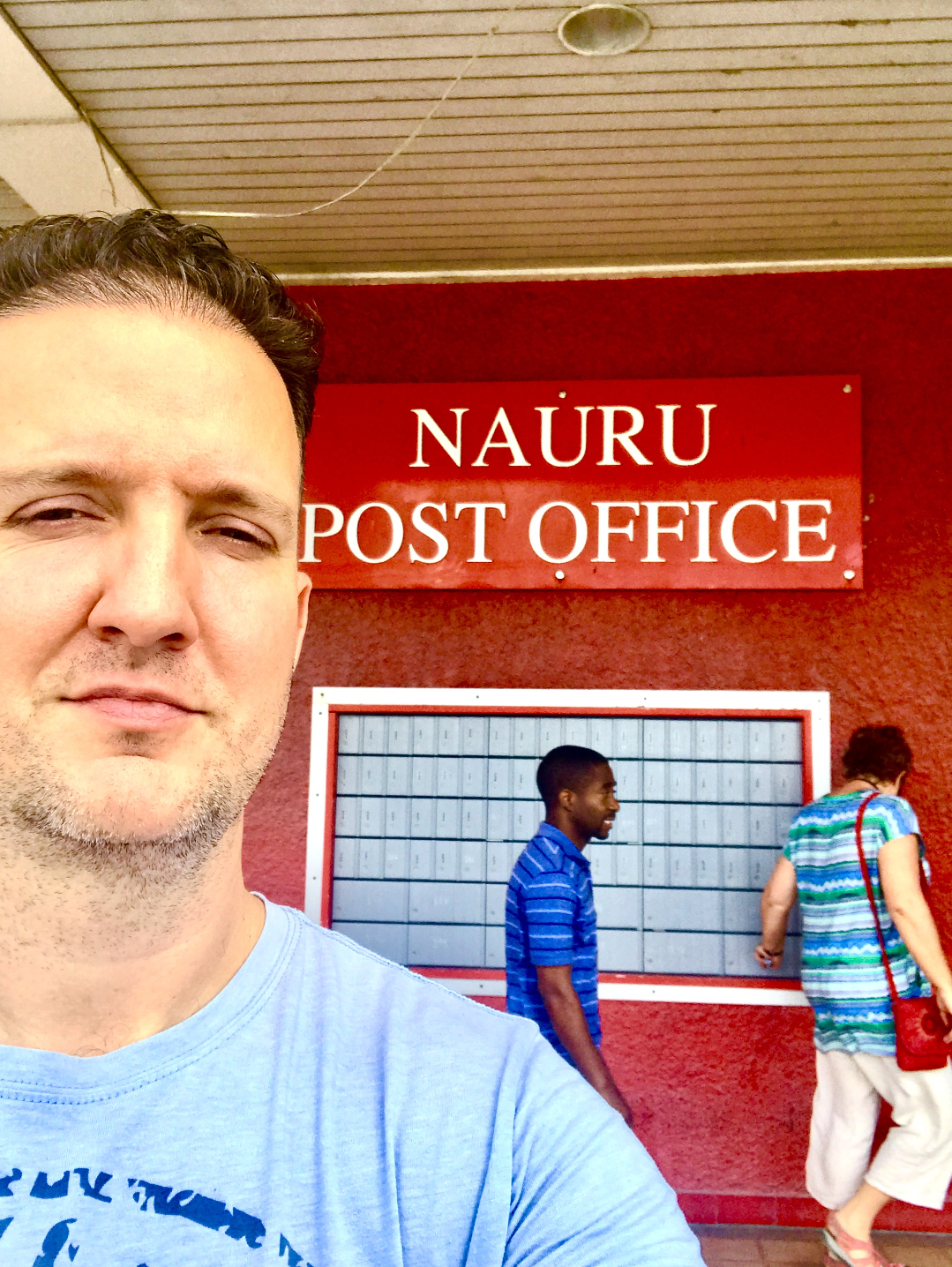
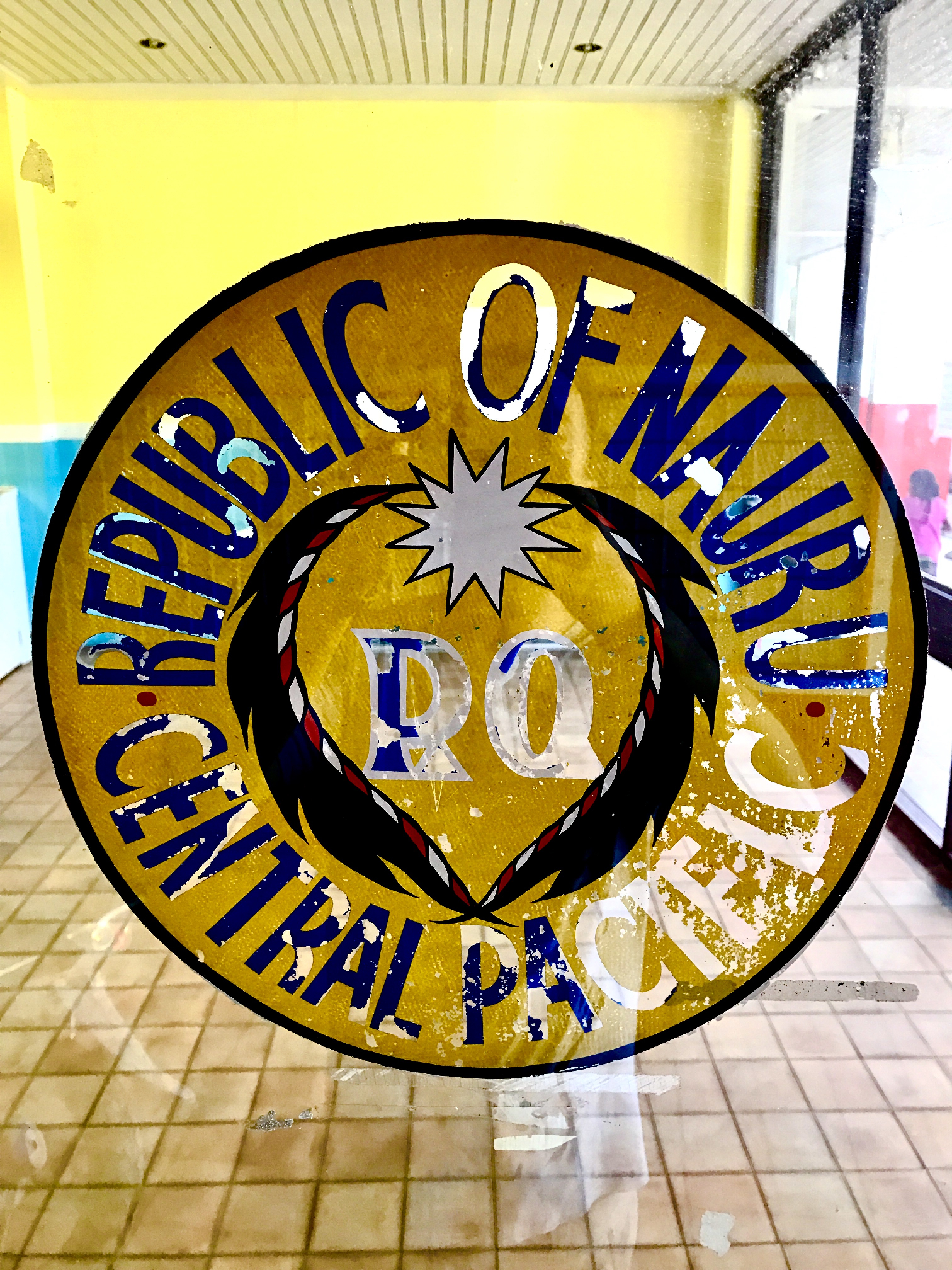
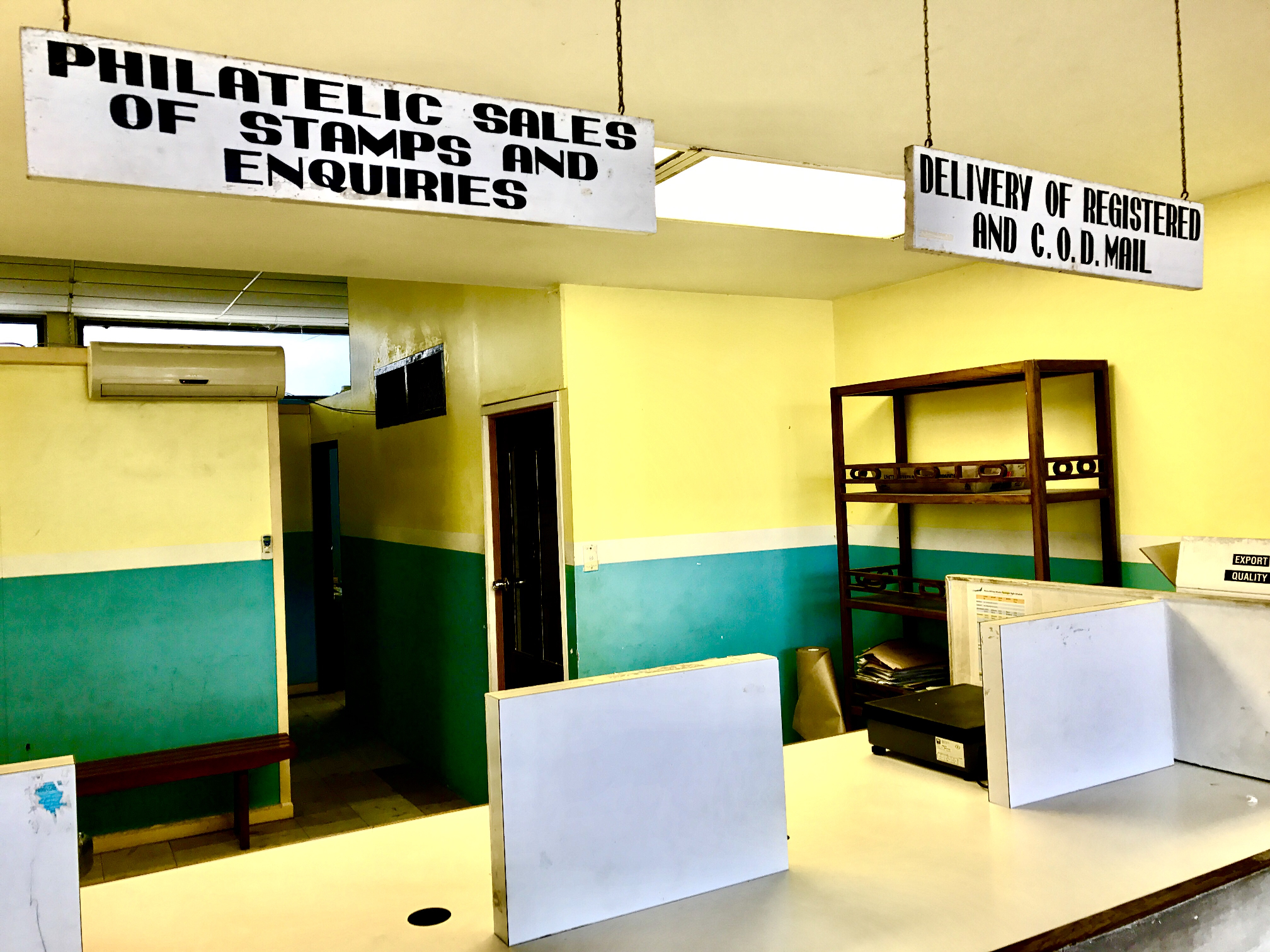
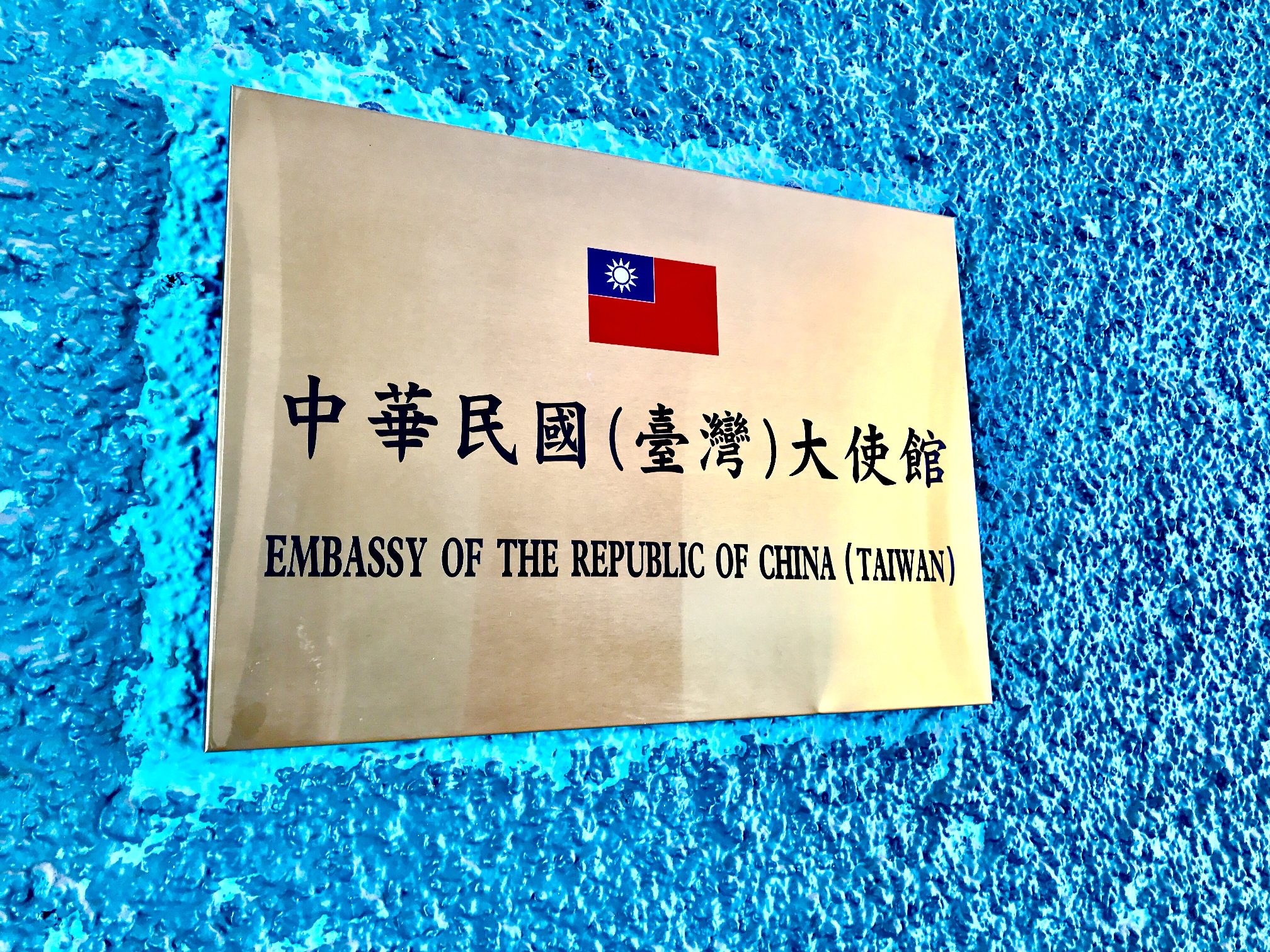
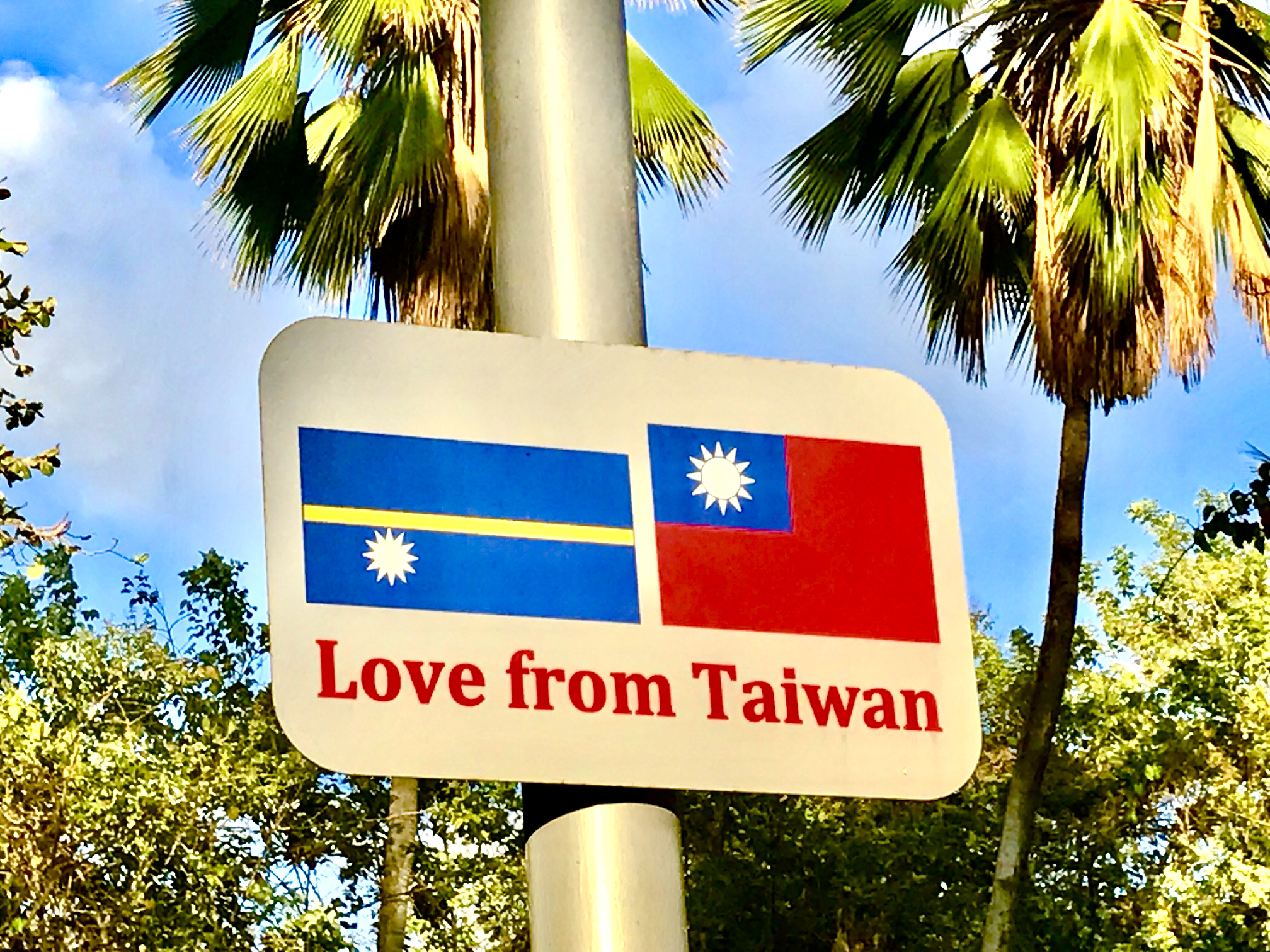
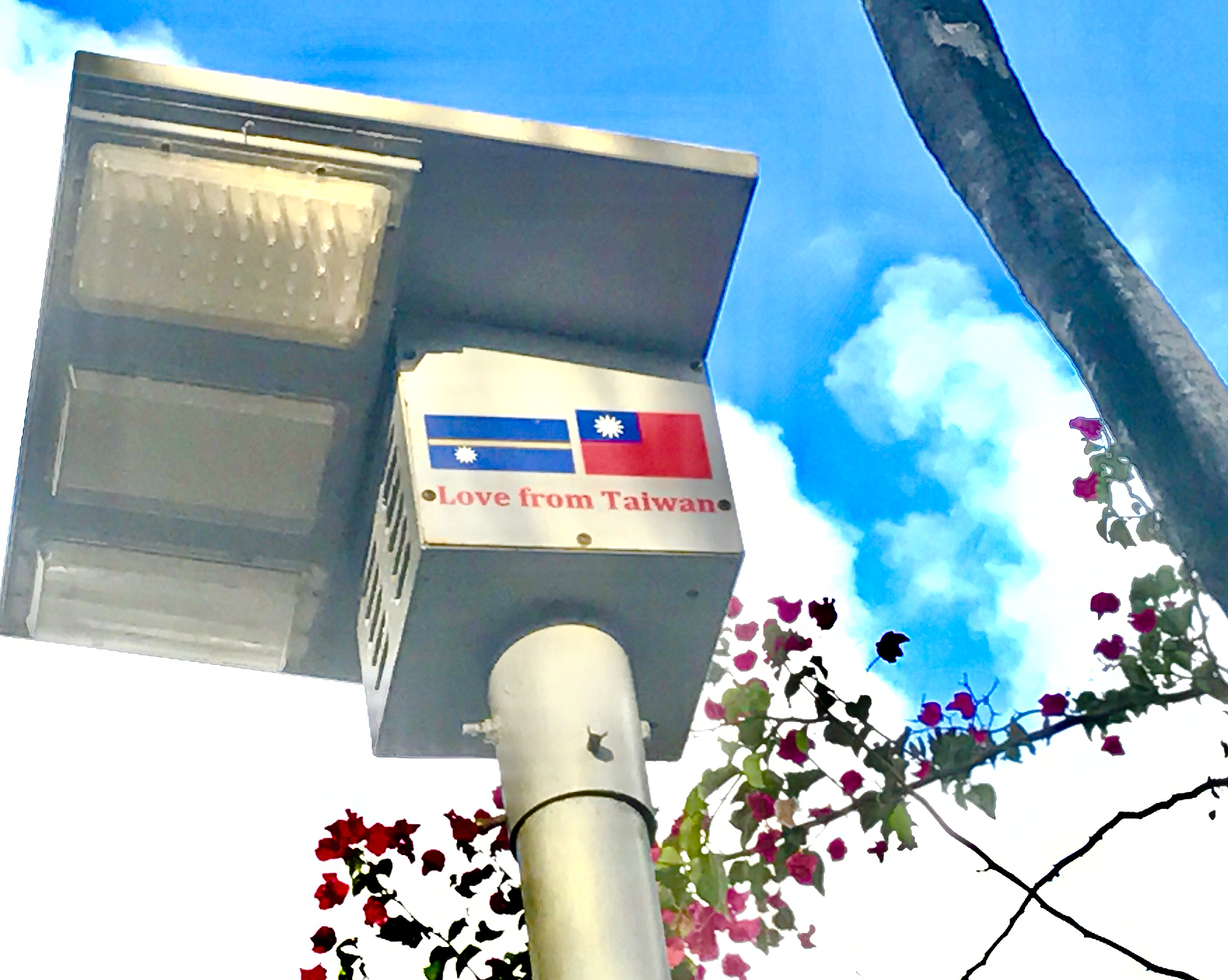
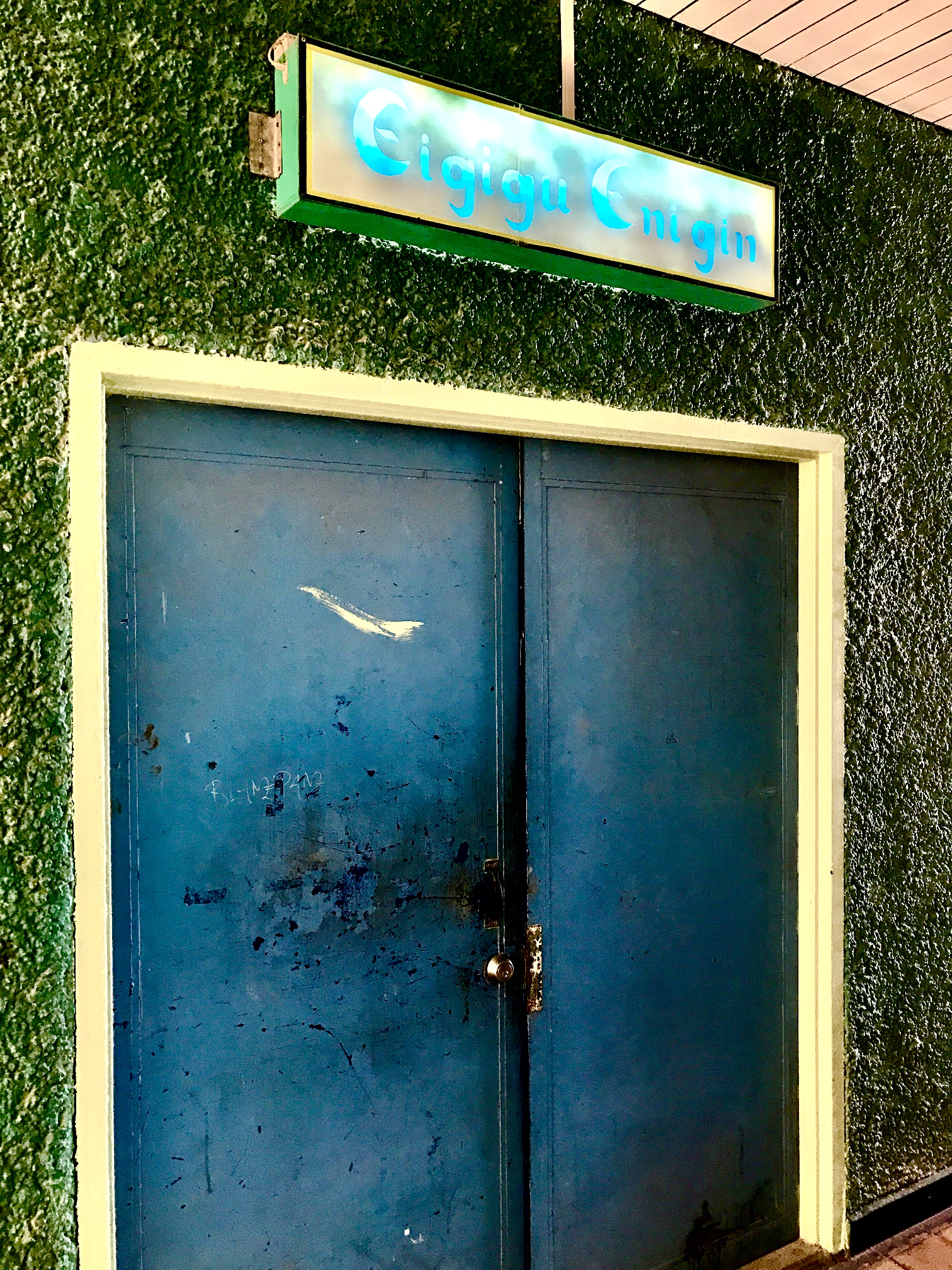
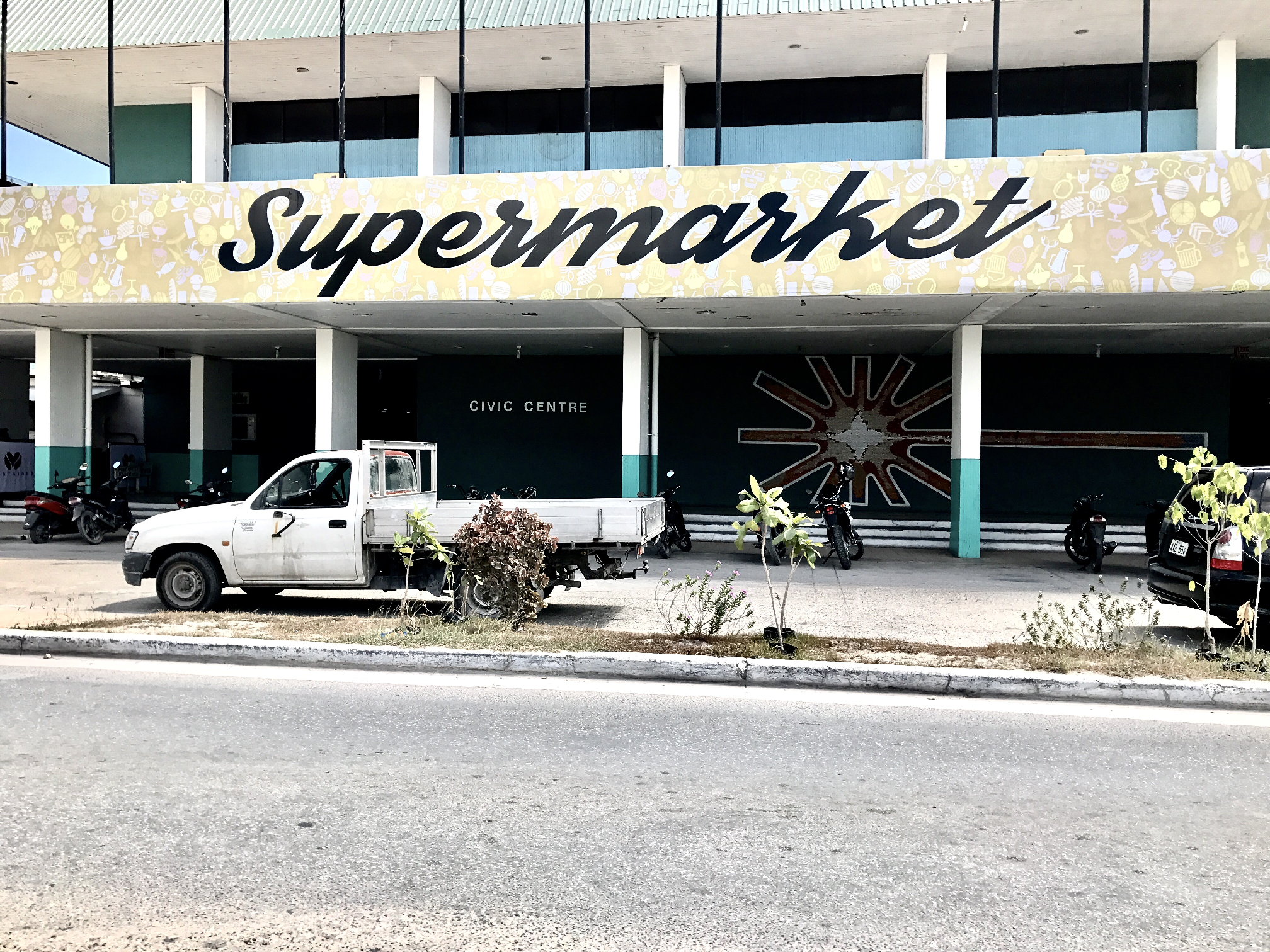
I stopped in the post office to buy some postcards before taking a seat at The Container Café, which I mentioned earlier. I had a great cappuccino and some banana bread while observing a few locals. To the right of me was an Australian Federal Police officer, having coffee with a local Nauruan policeman. There was a local couple and their small child at another table. I was halfway through my coffee when I met…
(I WAS ASKED TO REMOVE THIS PARAGRAPH BY THE PERSON WHOM IT WAS ABOUT–FOR RESPECT TO THEIR PRIVACY, THIS ENTIRE PARAGRAPH HAS BEEN DELETED BY ME)
…I browsed the supermarket and a couple of other small shops in the plaza before leaving to continue my expedition, this time into the island.

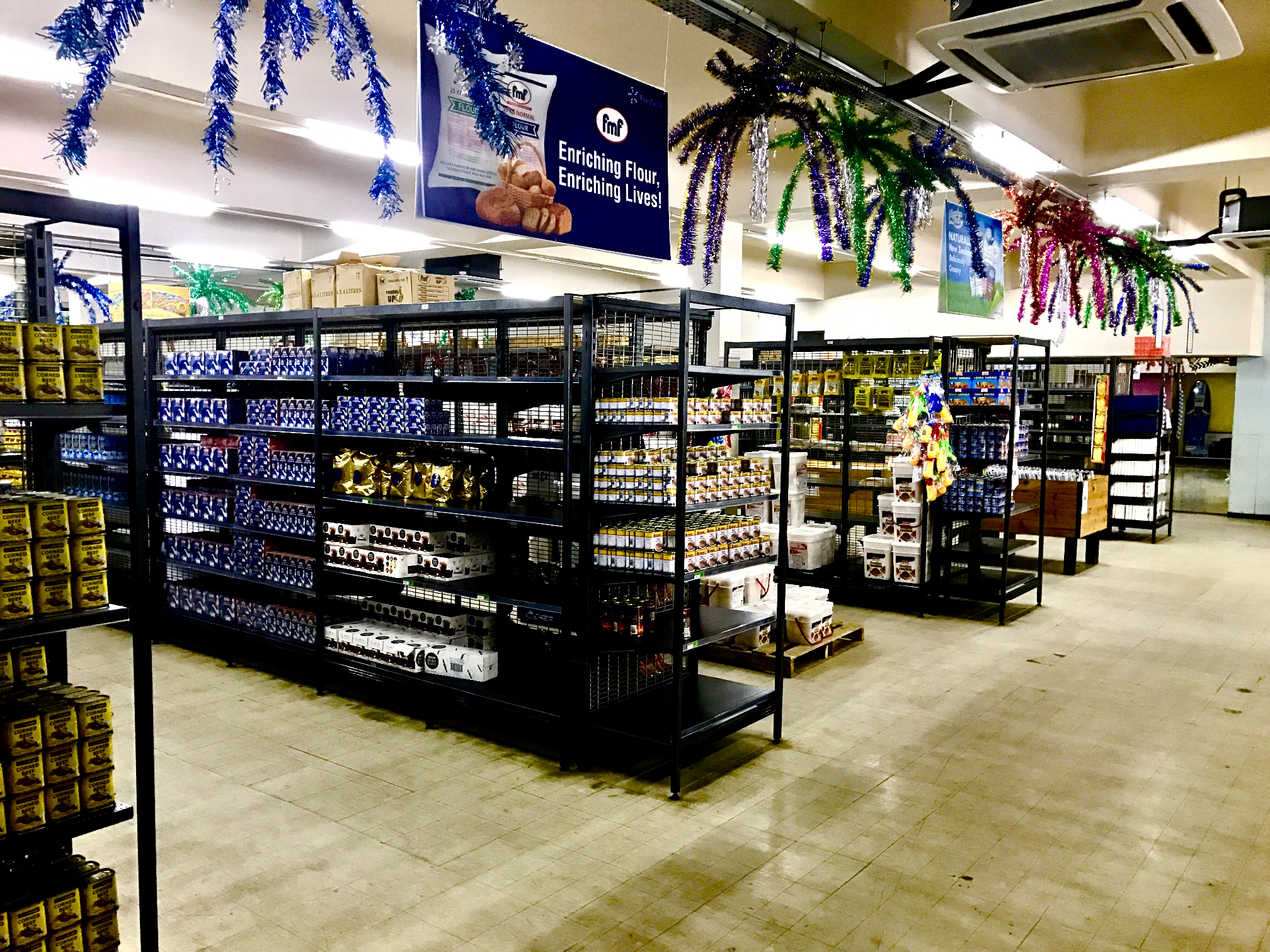
A local I’d met at the coffee shop had given me directions to the lagoon, which I found about five minutes later. I parked and walked the perimeter of the lagoon, taking lots of pictures and videos. A wild black pig ran across the street. I passed by children playing and a man with home goods set up in front of his house for sale. There were coconuts in the road and birds above. I stopped at another small Chinese store for a bottle of water before continuing on. It was an awesome, quiet and serene walk. But my pants kept falling down. I needed that belt.
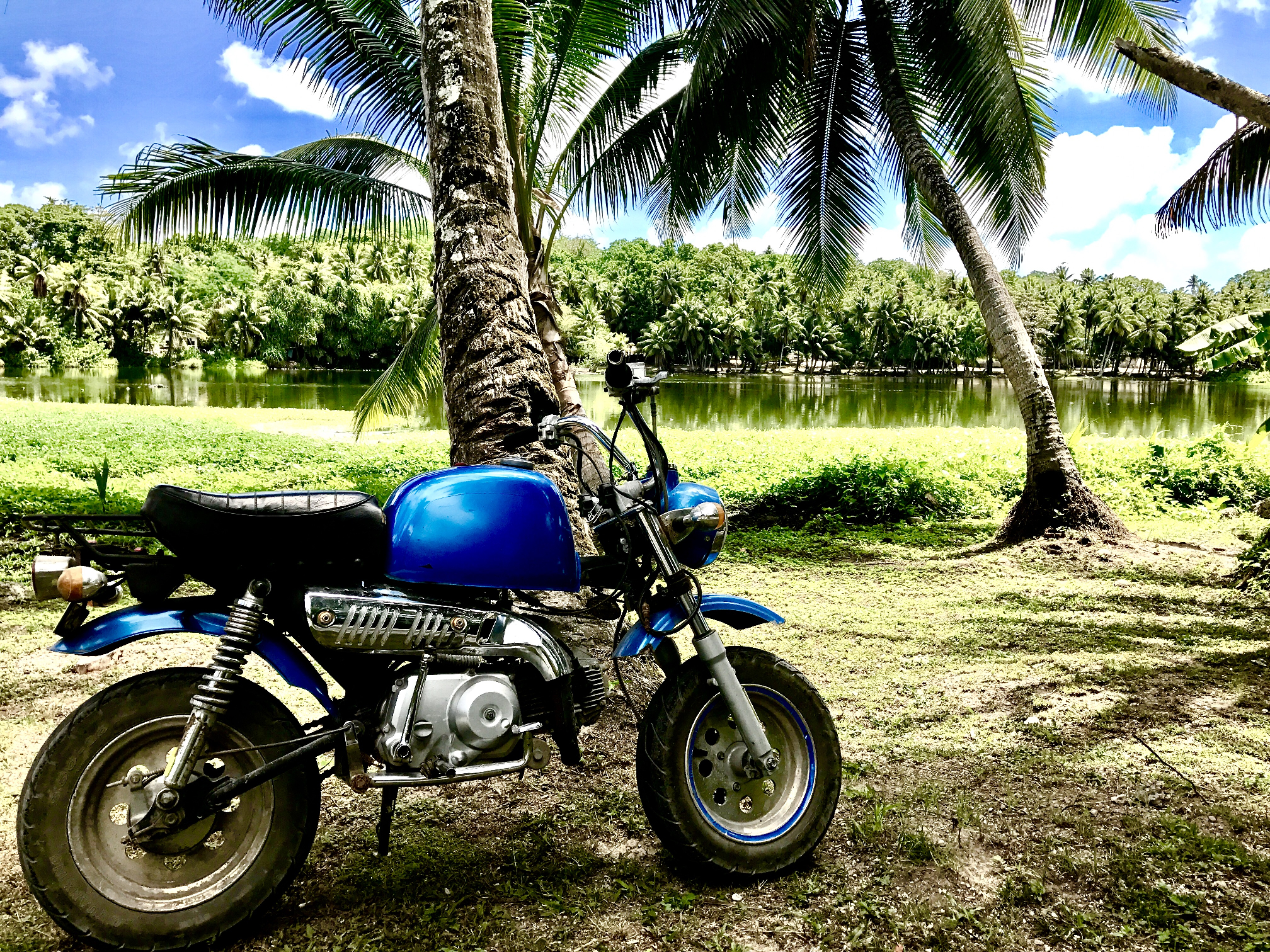
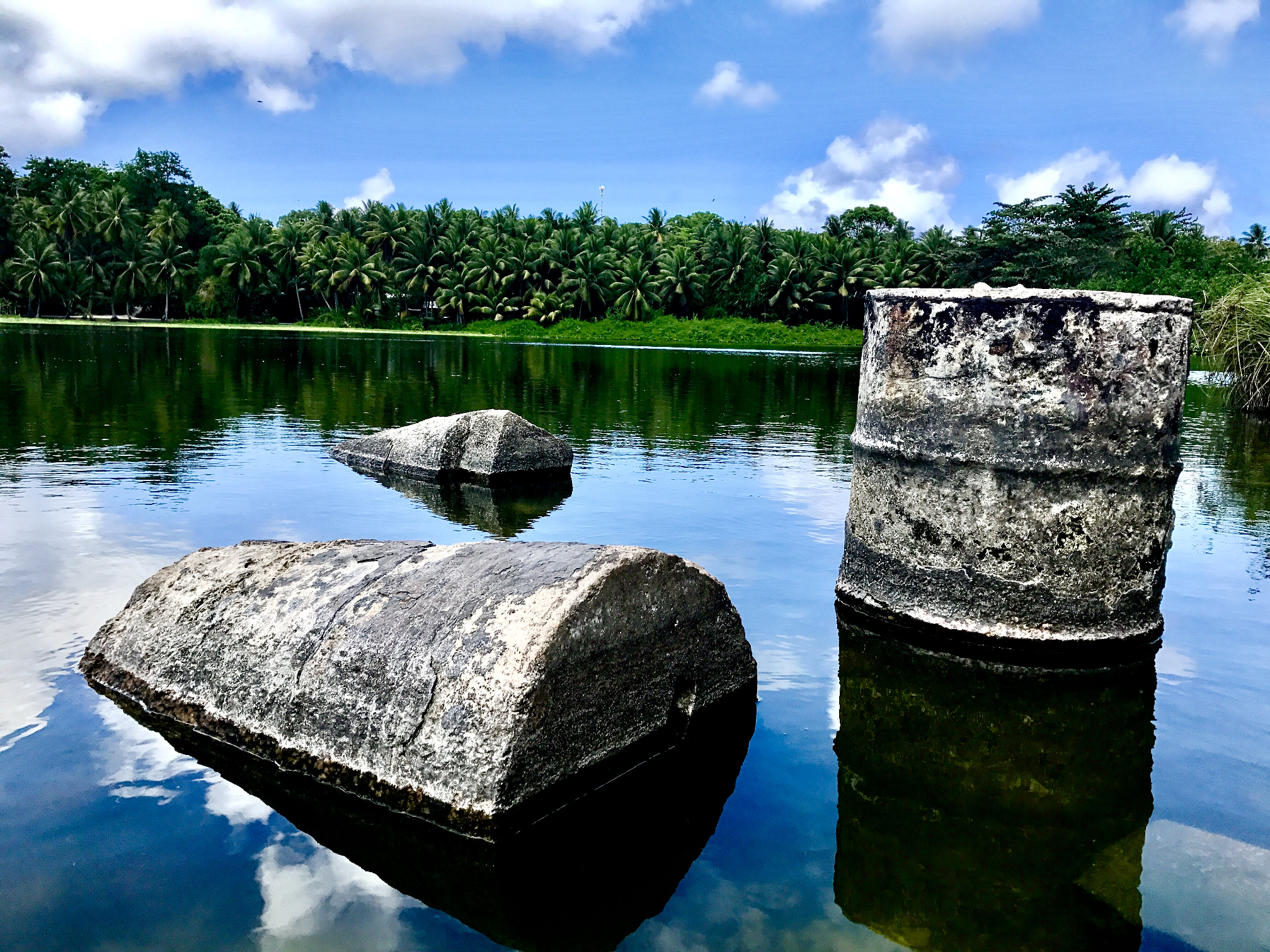
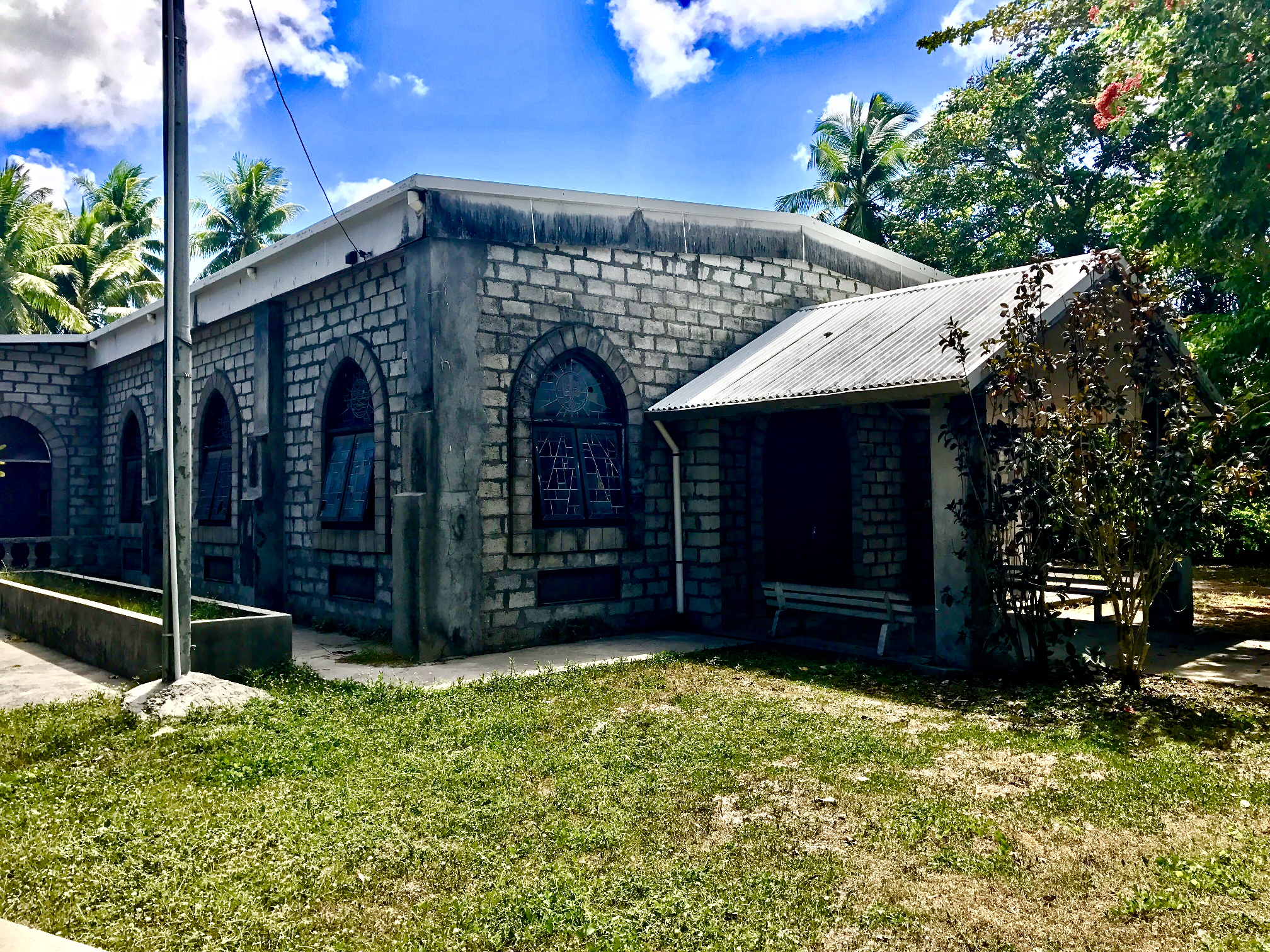
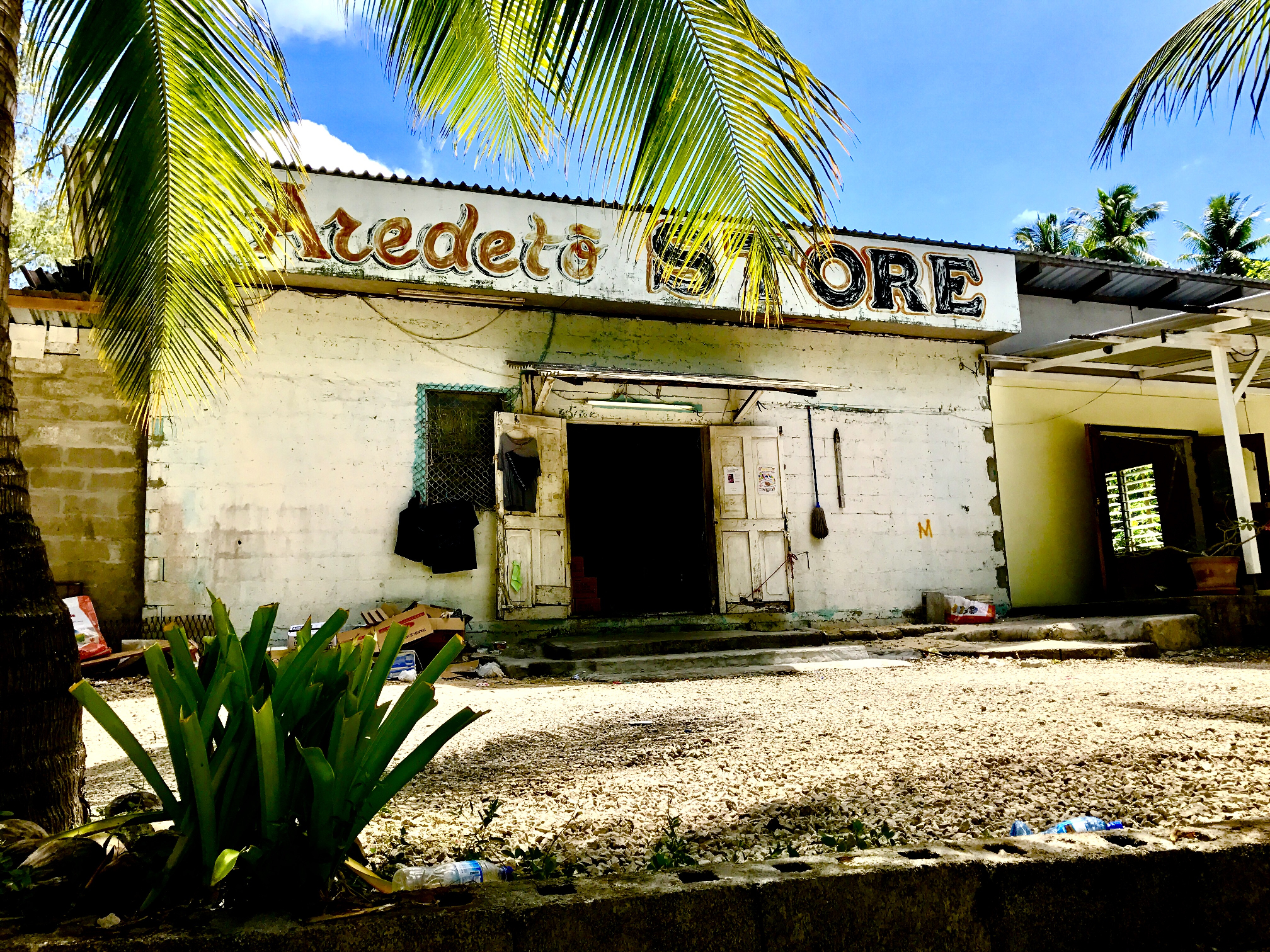
The Hills
Back in the car, I took a turn instead of heading back the to main road, and for the next 40 minutes enjoyed windy gravel roads that twisted and turned all throughout the interior of the island. I passed a lot of old mining equipment and a mine or two that was still in use. I discovered the island “dump,” and a “muster station” which I assumed to be the island’s highest point—the place to go in case of tsunami. I thought, Lord, don’t let me be here when a tsunami comes! One of the coolest things I saw was a giant phosphate rock, standing straight up like some kind of building, and almost completely taken over by vegetation; literally, a big, stone tree. It was like nothing I’d ever seen. I got lost for a bit, but then finally found my way back to the main gravel road.
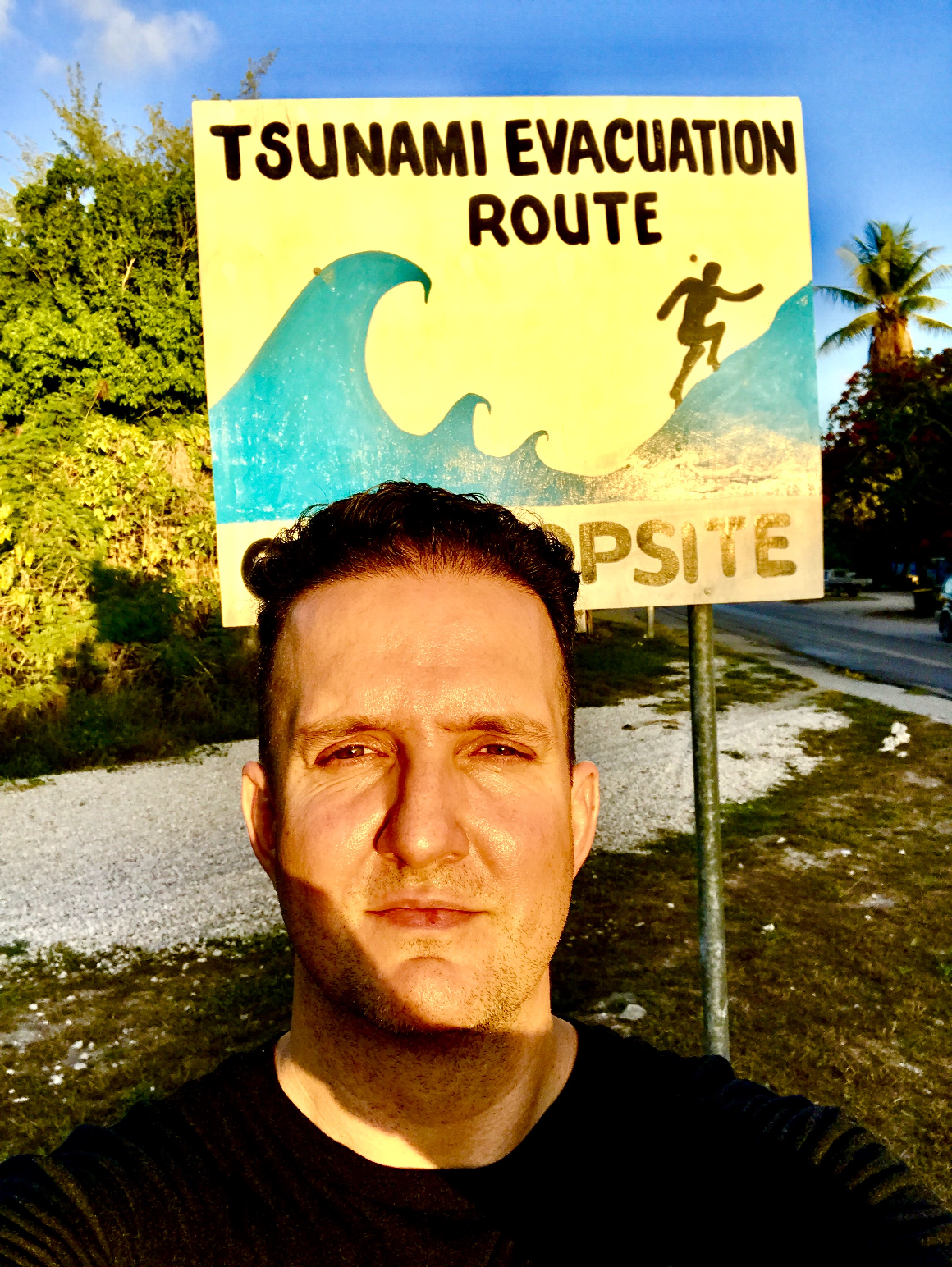
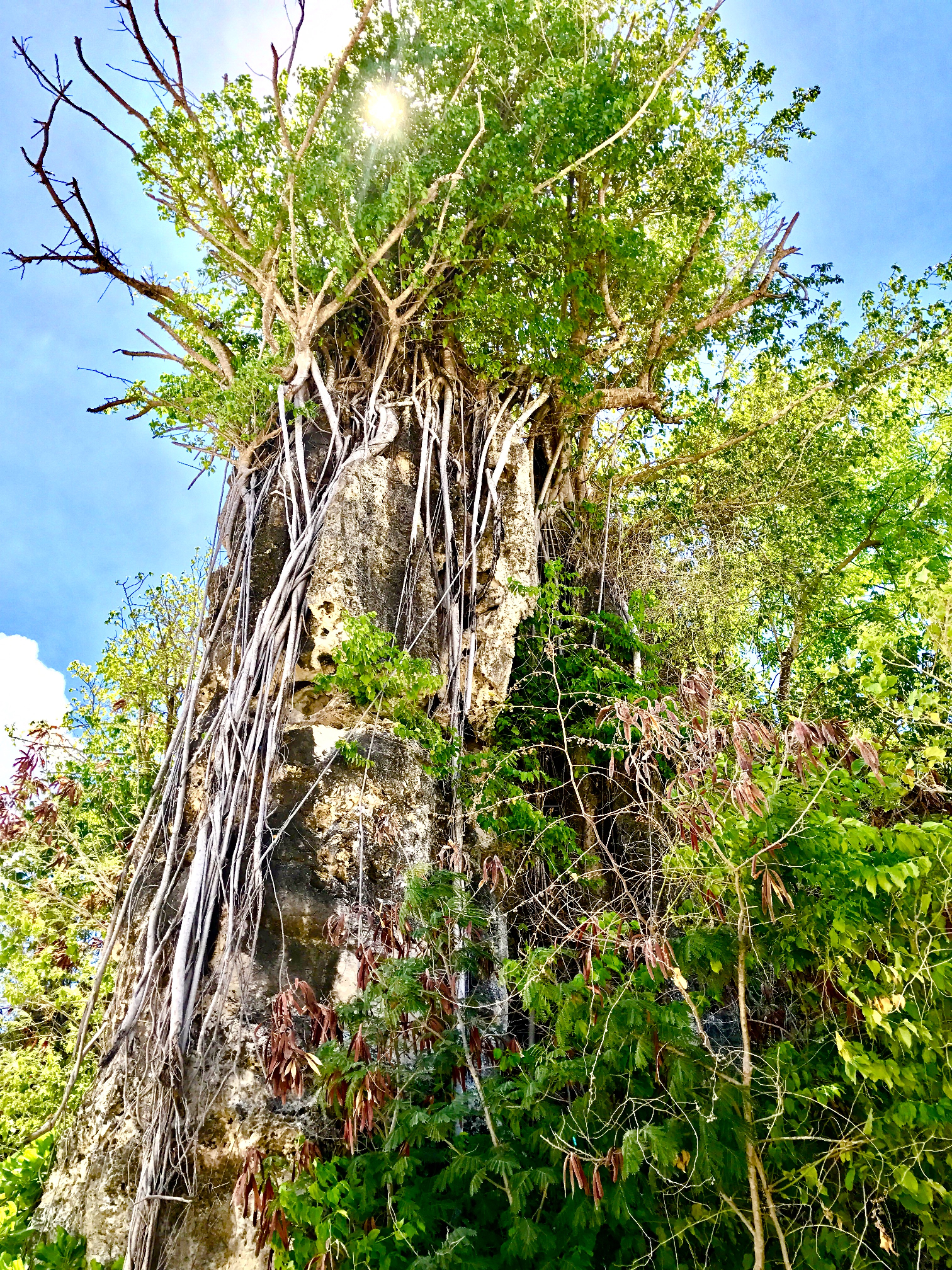
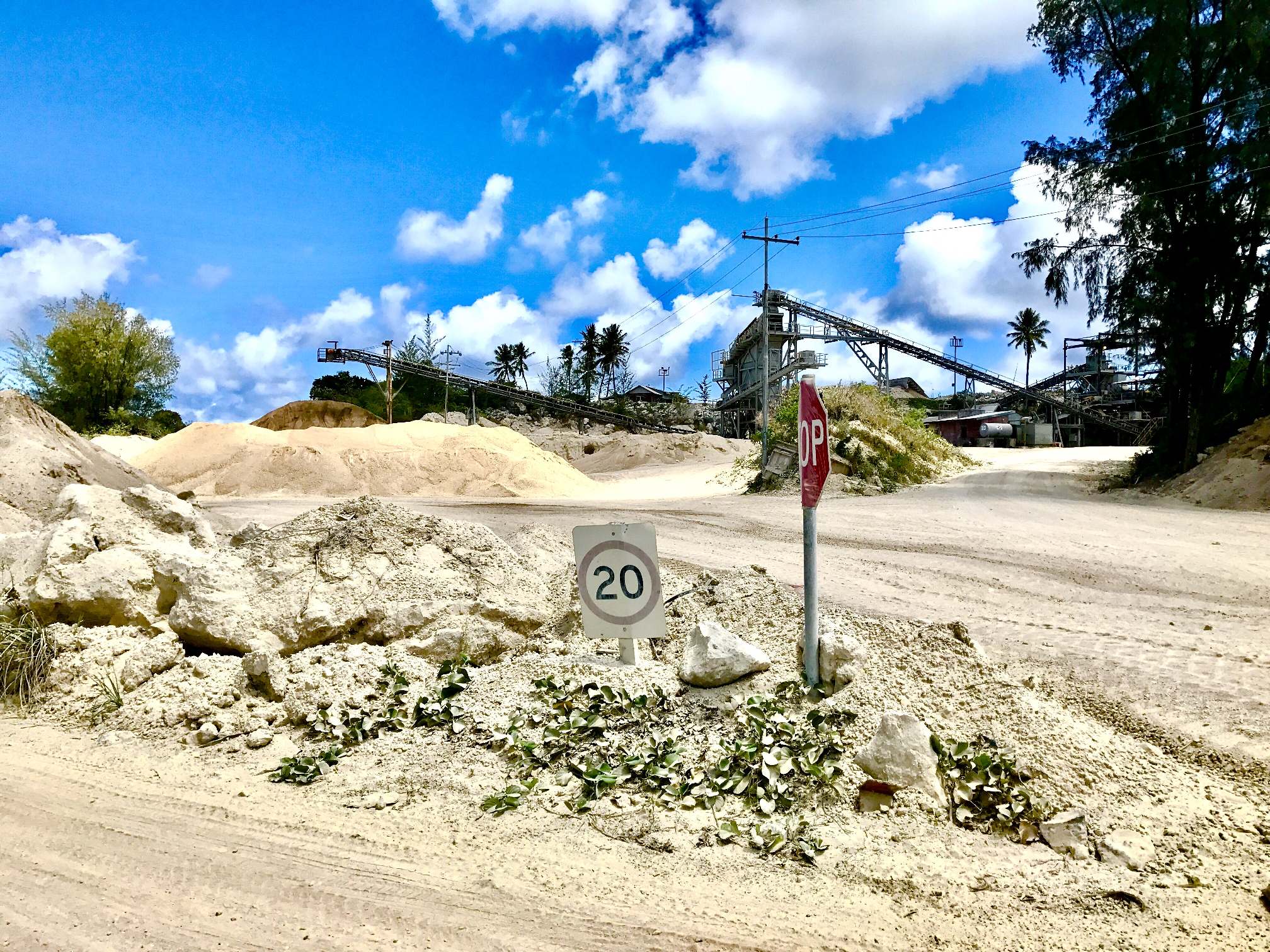
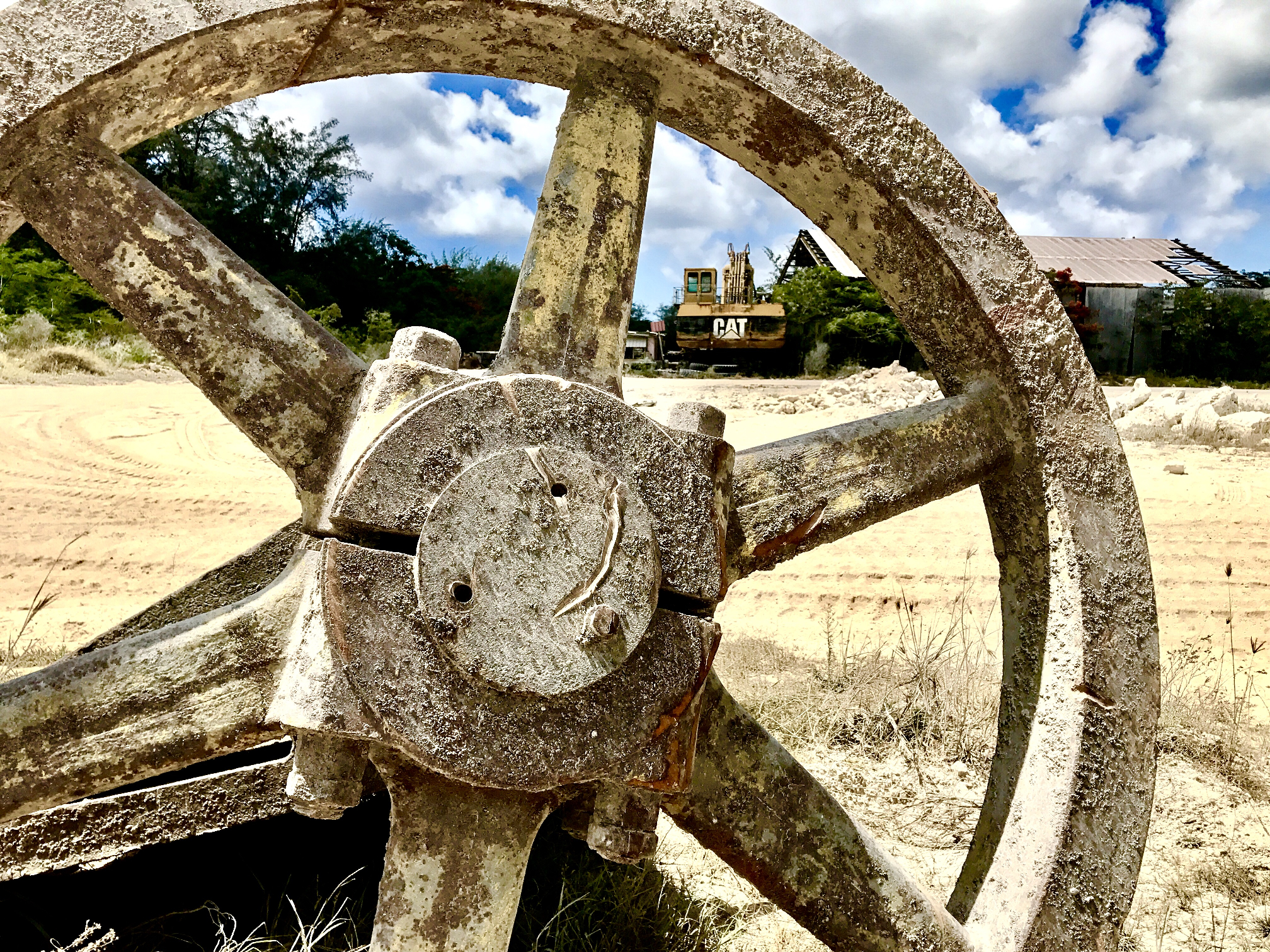
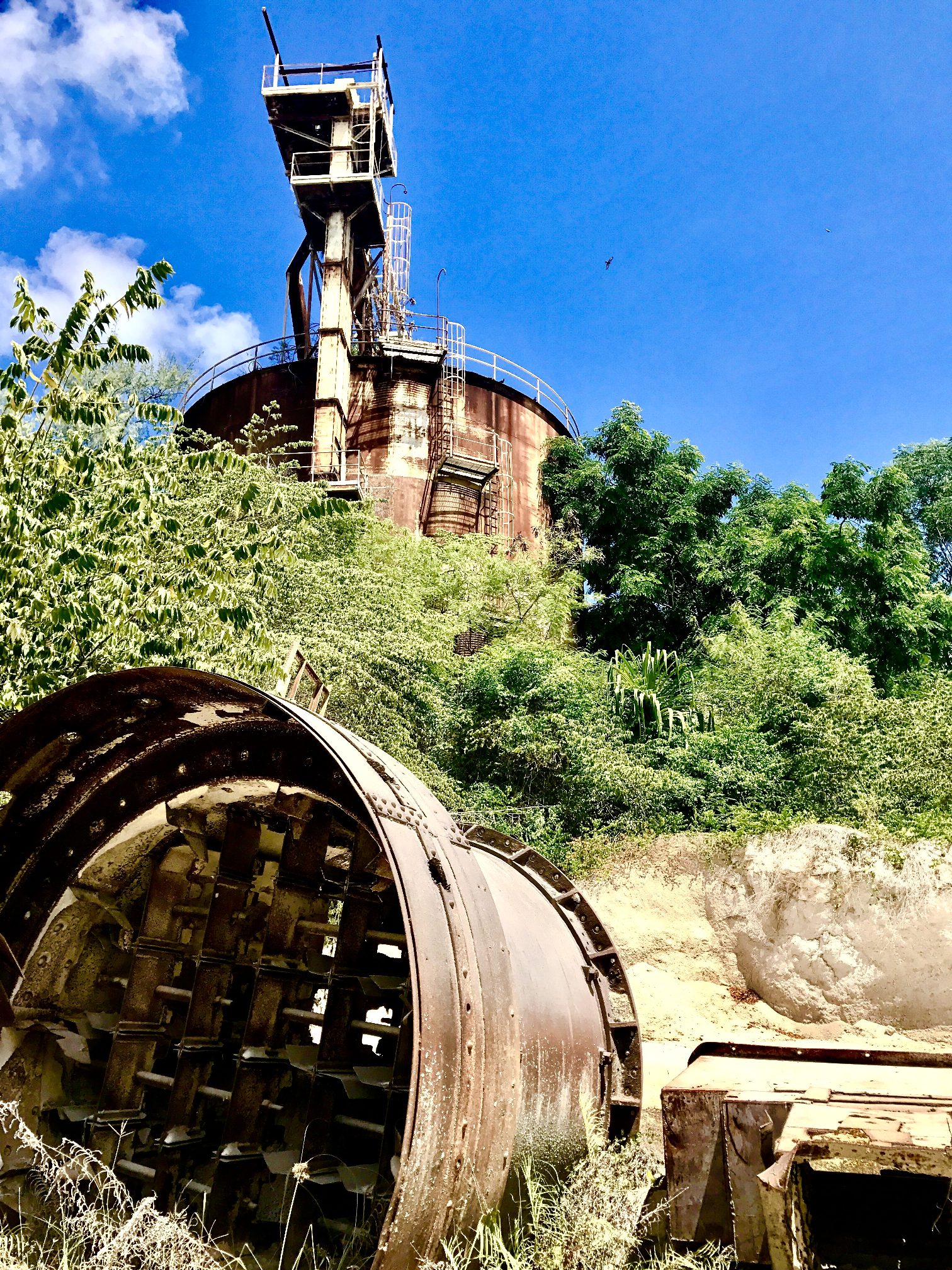
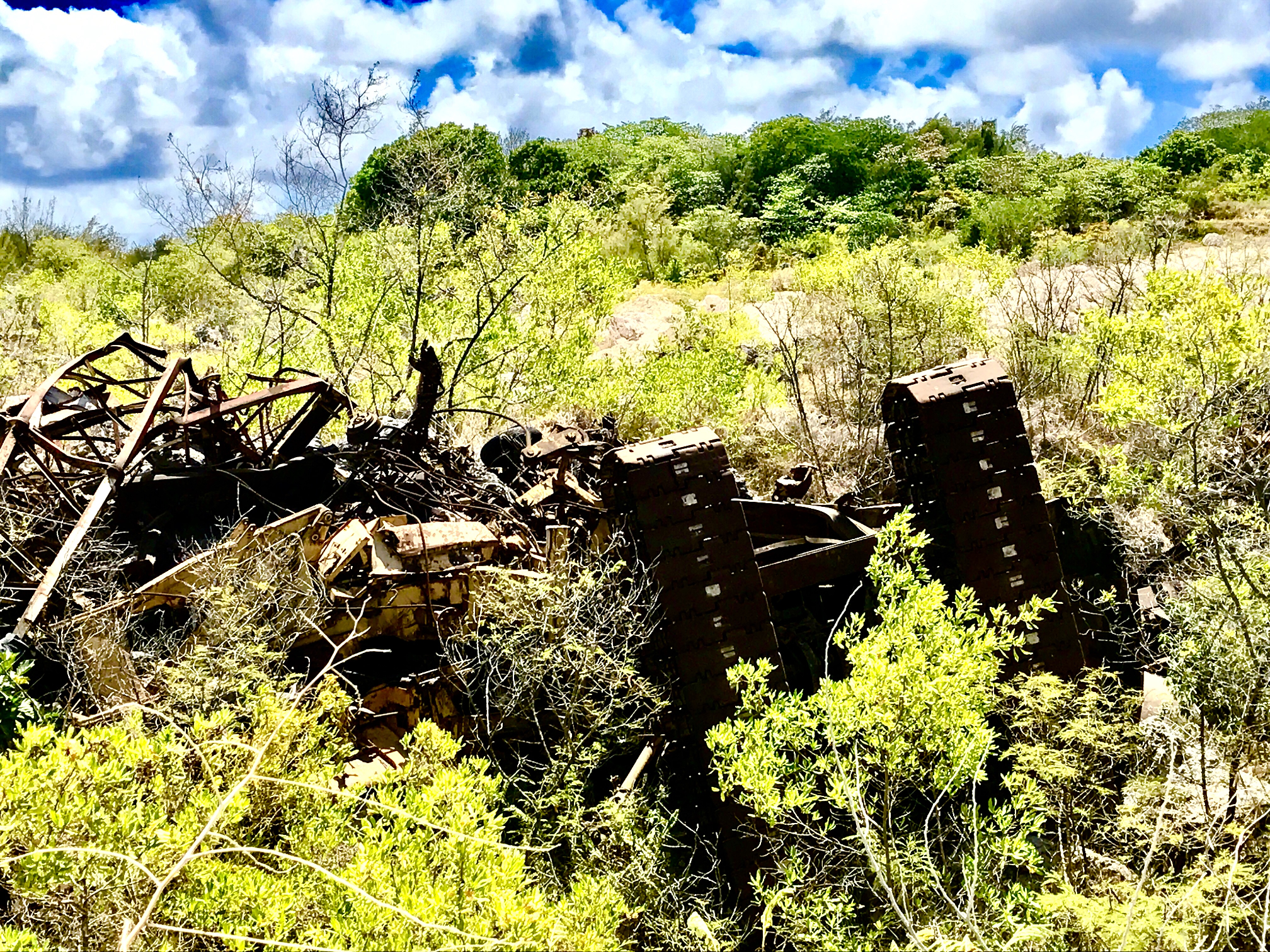
I was excited to finally stumble upon the infamous “refugee camp” that I’d heard so much about. It looked a lot like a military installation—walled off, with gates and guards on patrol. I parked and approached the guards to see if I could enter. I wasn’t surprised when they said no, but we had a nice chat and they seemed intrigued that I was an actual tourist, especially from somewhere so far away. Americans don’t come to Nauru. At the end of our conversation I even asked if I could just take a picture of the entrance—just the gate—and was denied.
If Loving You Is Wong…
It was back into town to find the stuff I needed. This time I hit the jackpot! Though probably one-fiftieth the size of the island’s supermarket, Mr. Wong’s store (named Caleb #2) seemed like it had everything. Every – thing! Crammed into one tiny room the size of a bedroom, Wong’s had anything you could ever need, from electronics, to generators, to clothes, tools, batteries, toys. Wong had it all; the most random sh*t you could imagine…including my new belt, a USB car charger, and even snorkel gear. Three for three…unbelievable!
Now that I could keep my pants up, it was time to head to the radio station. The folks at Nauru’s 105FM were nice enough to give me a tour of their facilities. Their office and studios were located right on the water; I was surprised the building had no windows to take advantage of the potential amazing views.
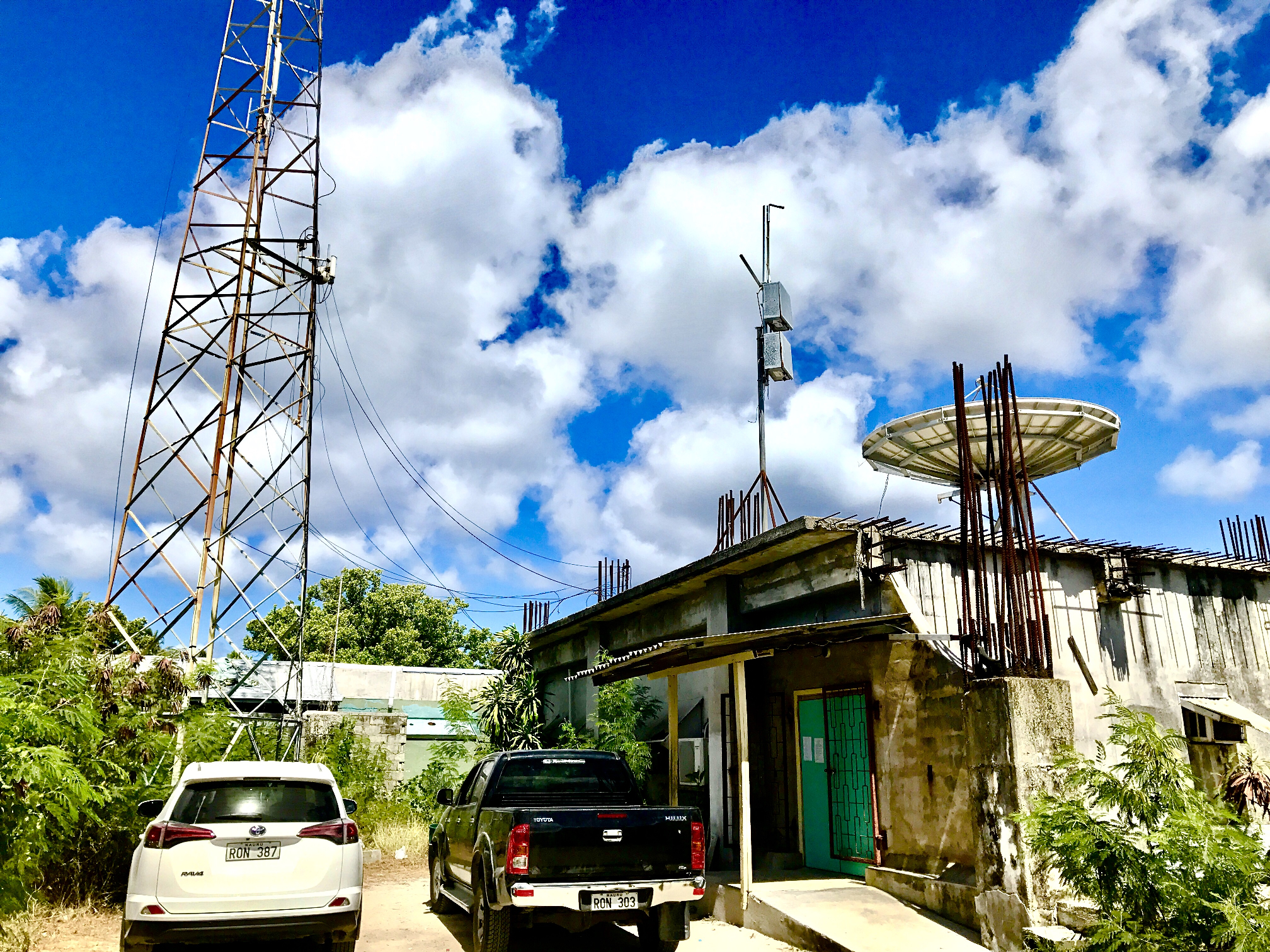
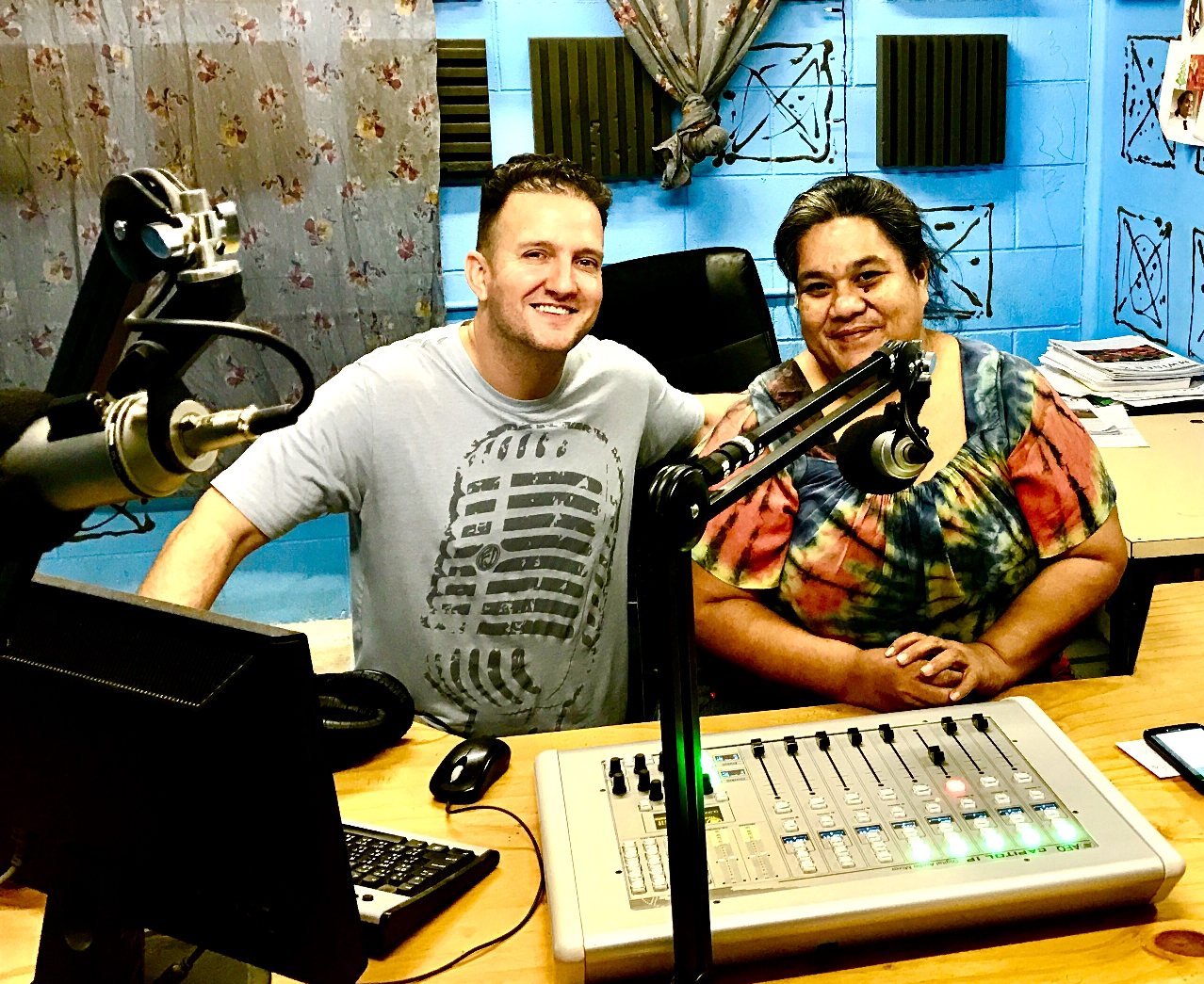
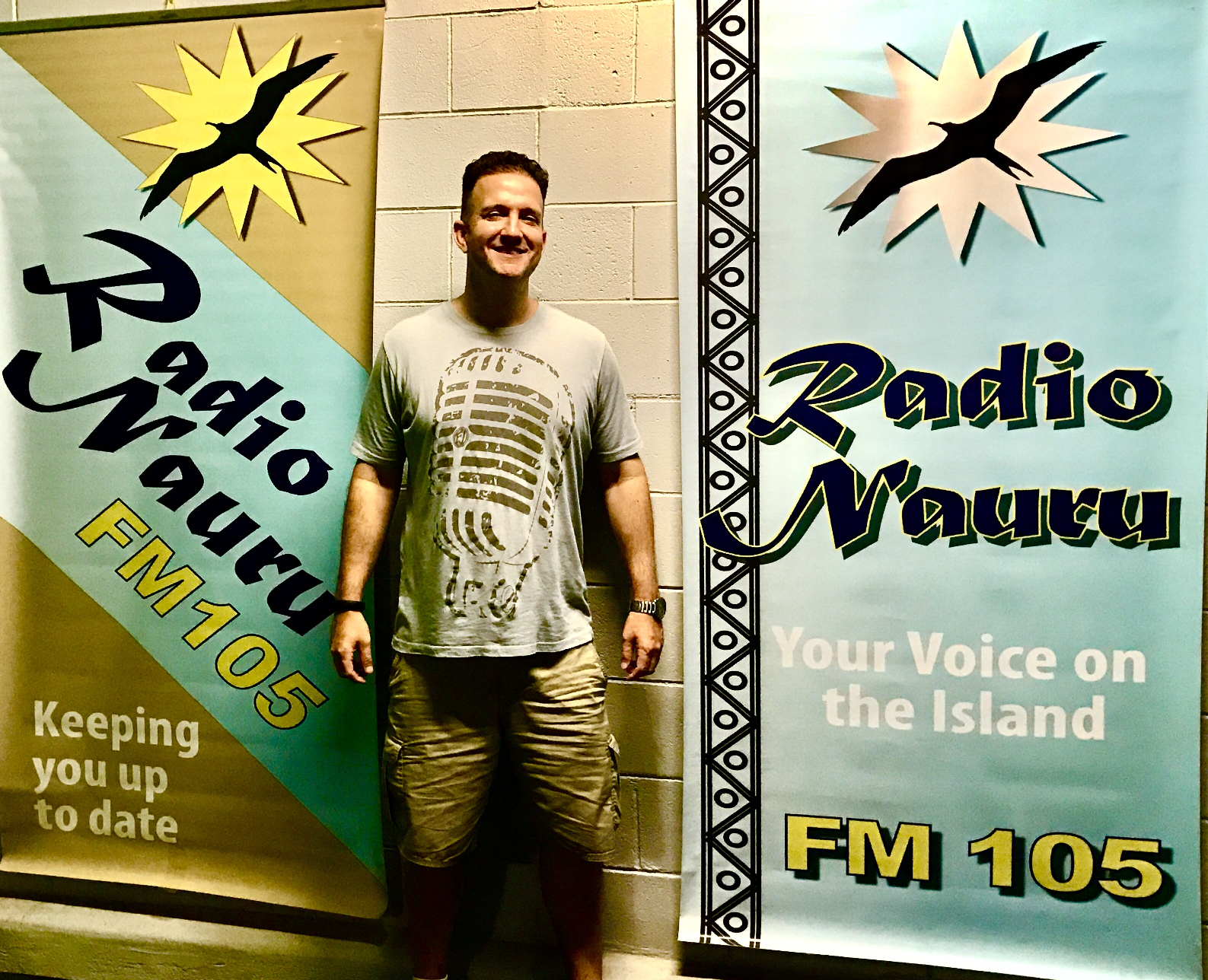
After my station drop in, I headed back to my hotel to change into my trunks but was blocked by an incoming plane. Yup, I said plane! Remember the tarmac I mentioned than ran across the actual street? Well Nauru Airlines had just arrived and now the barricades and stop signs were in place to stop any traffic from passing over the strip.
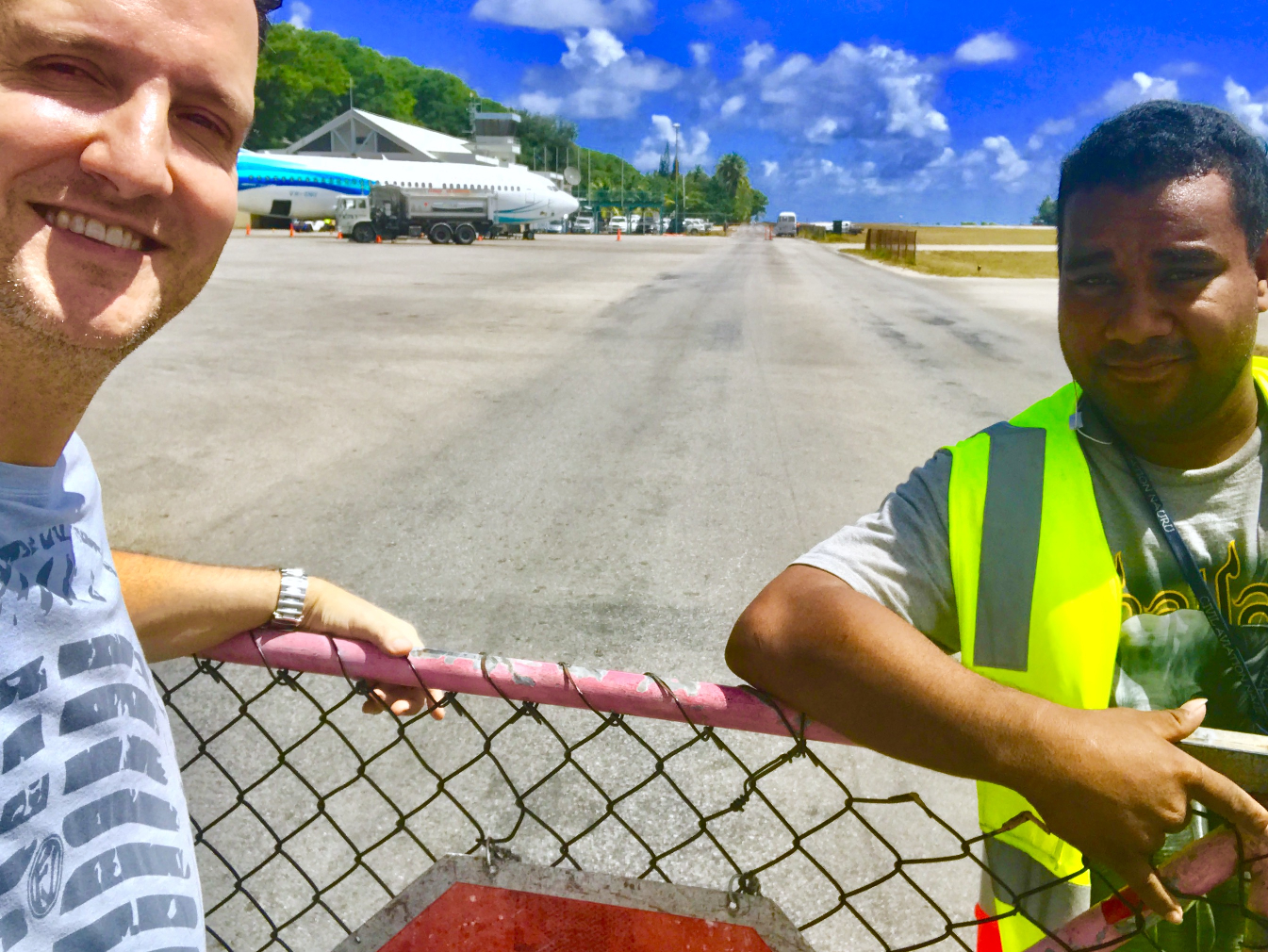
I turned around, not sure if I would go the long way back to the hotel, or just find food and wait out the street closure. I parked to take some snaps of an old yellow Land Rover when I noticed a couple guys laying down concrete for a new boat launch below me. I’d been on the island long enough now to tell apart the locals from the “visitors,” and the Arab cap on one of the guys’ heads gave his refugee status away. I approached slowly and struck up a convo. All three of these guys were from Burma. I found it interesting they did not refer to their country as its current name, Myanmar. I bet they have some incredible stories, but they were working and it didn’t seem like the right time to hang out long.
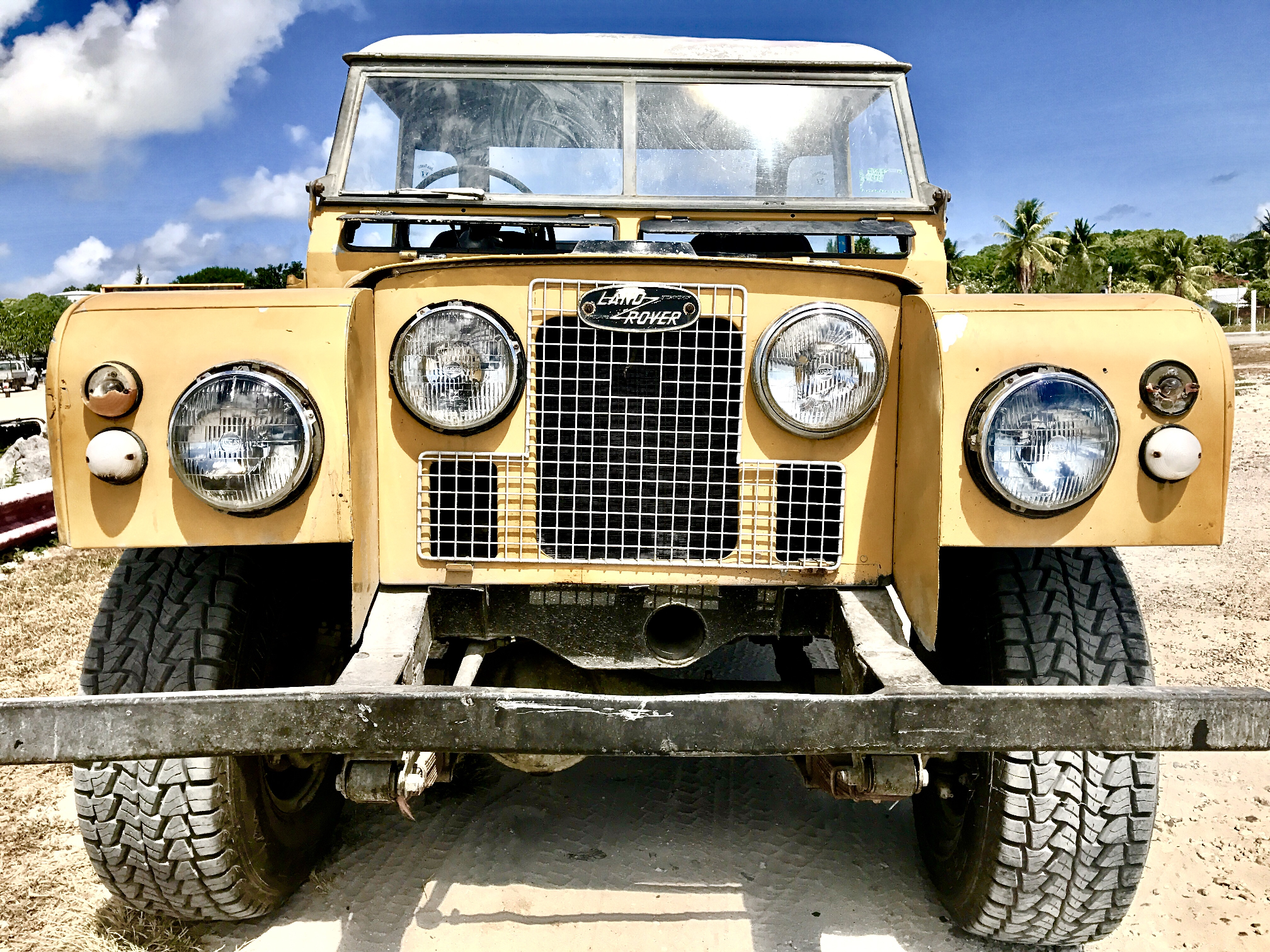
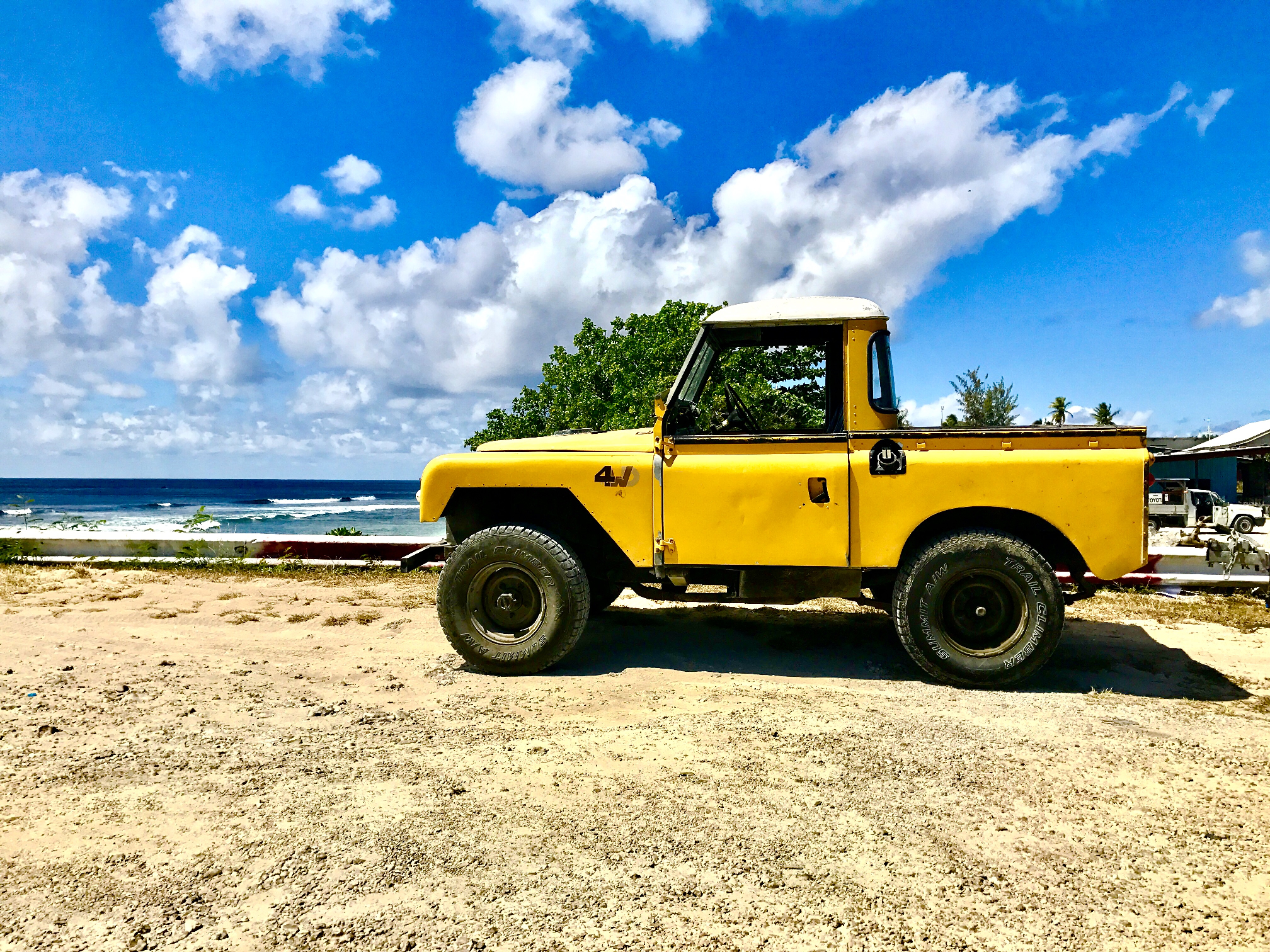
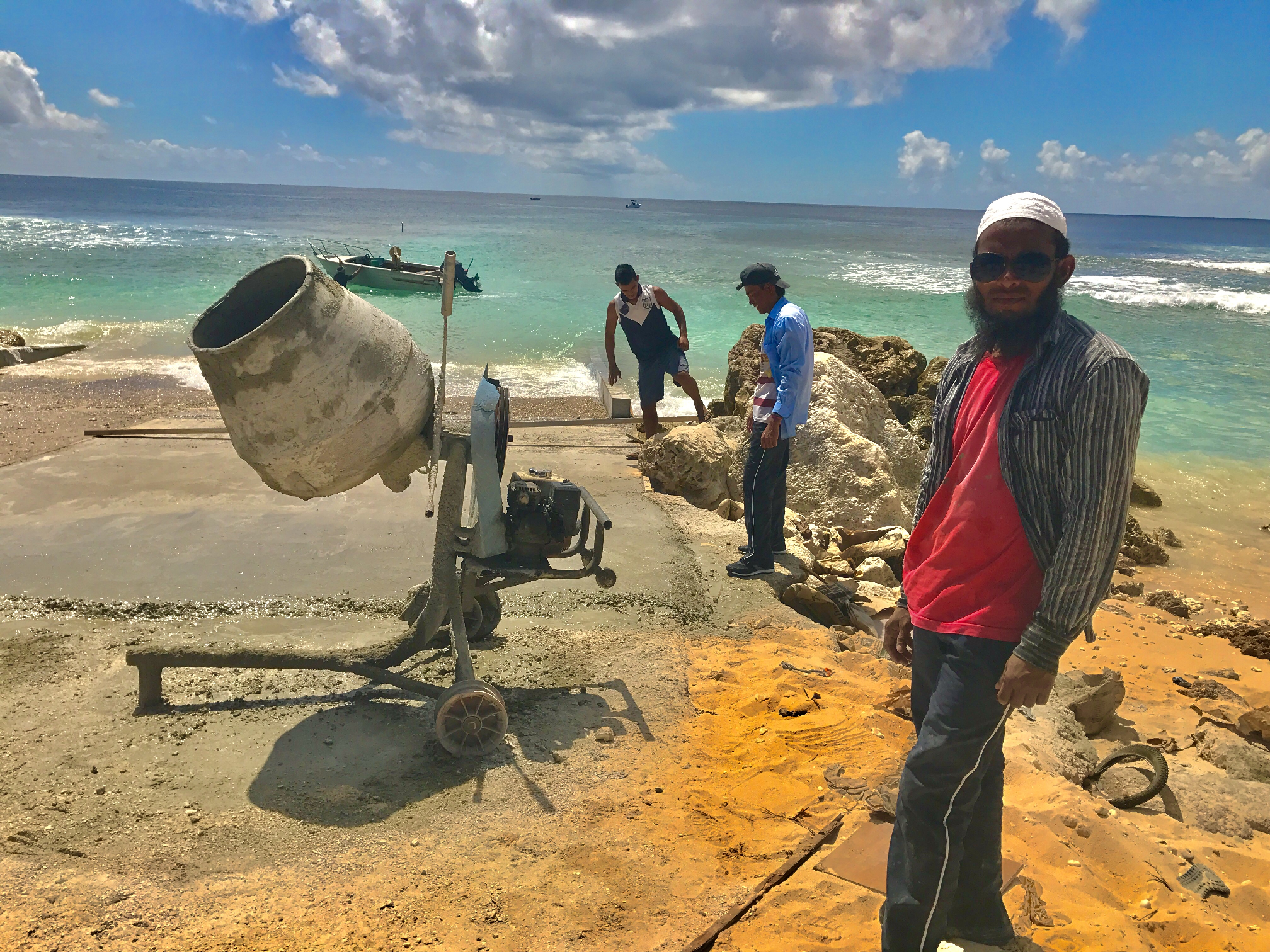
I continued exploring, since a check back at the airport proved the road was still closed. I’d bop around a little bit more and see if I could find any other interesting stuff. I did.
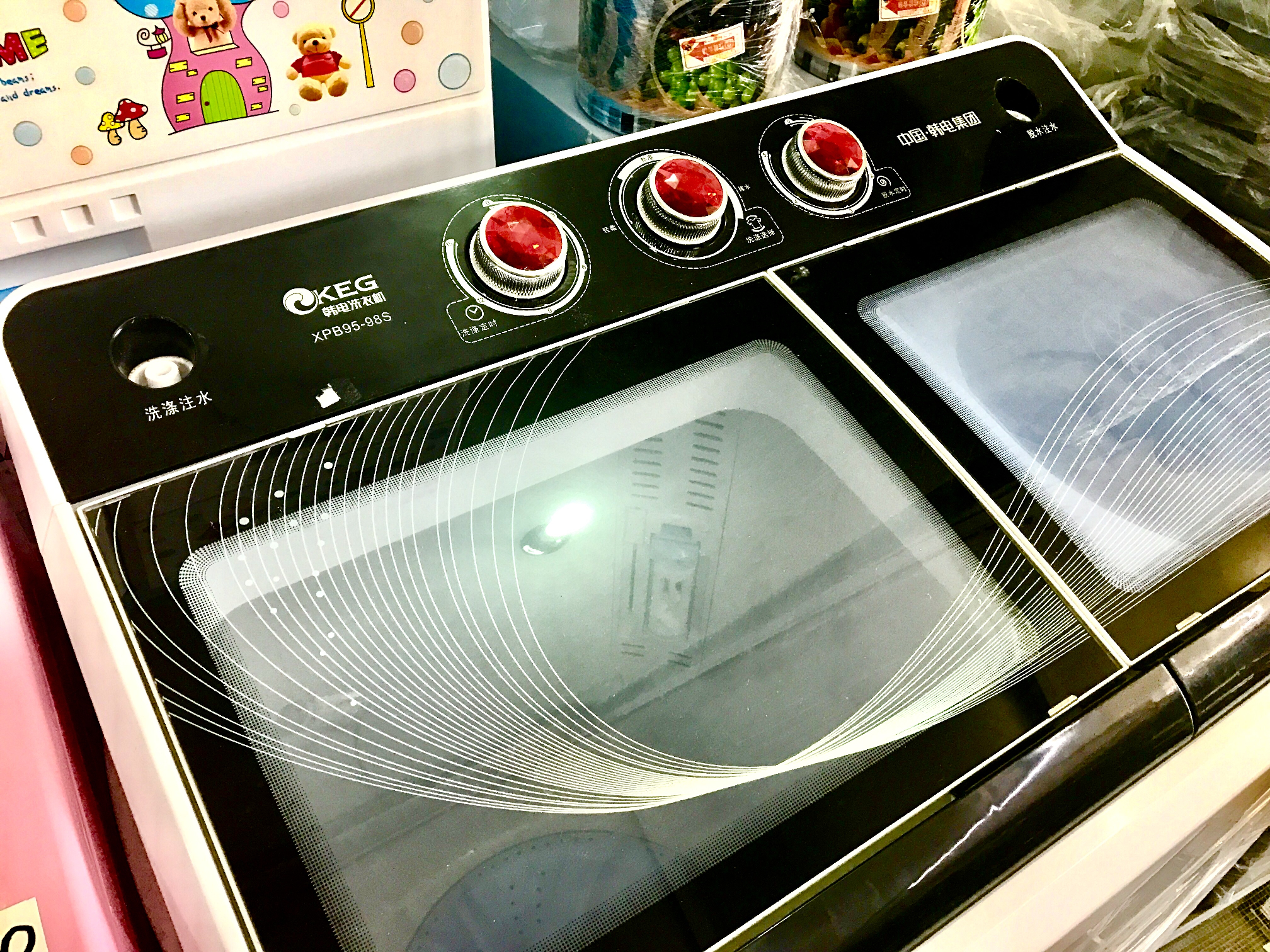
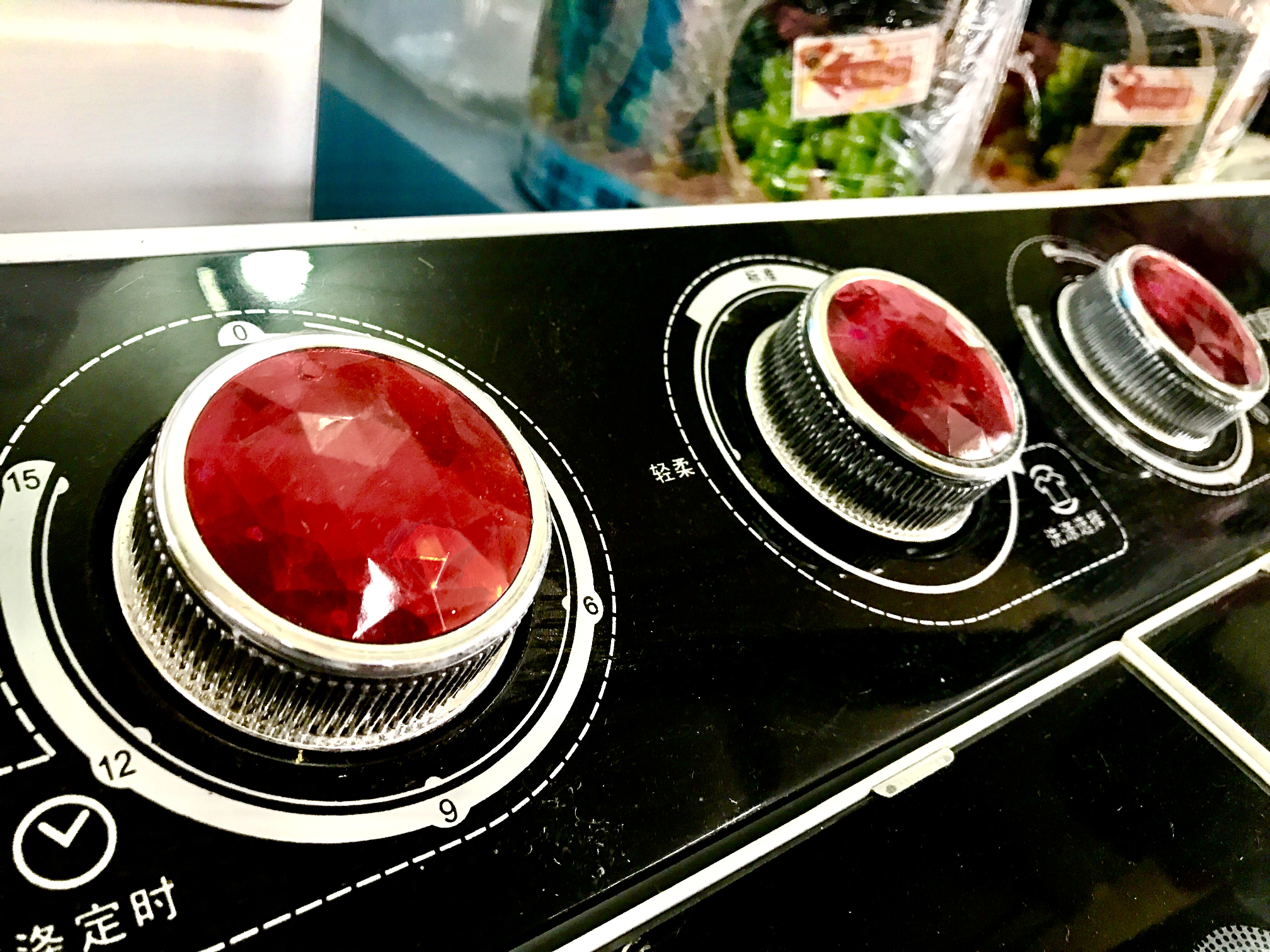
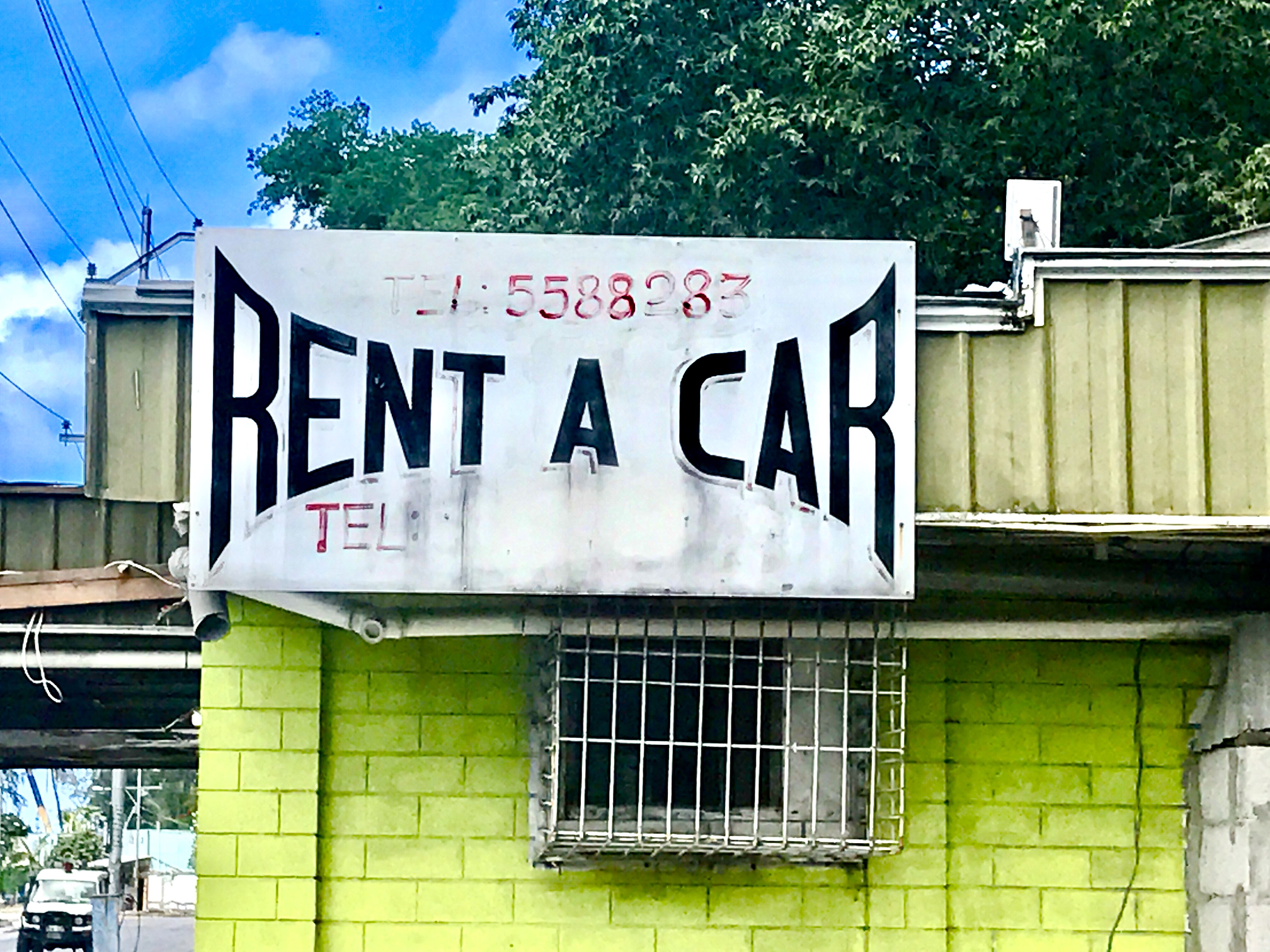
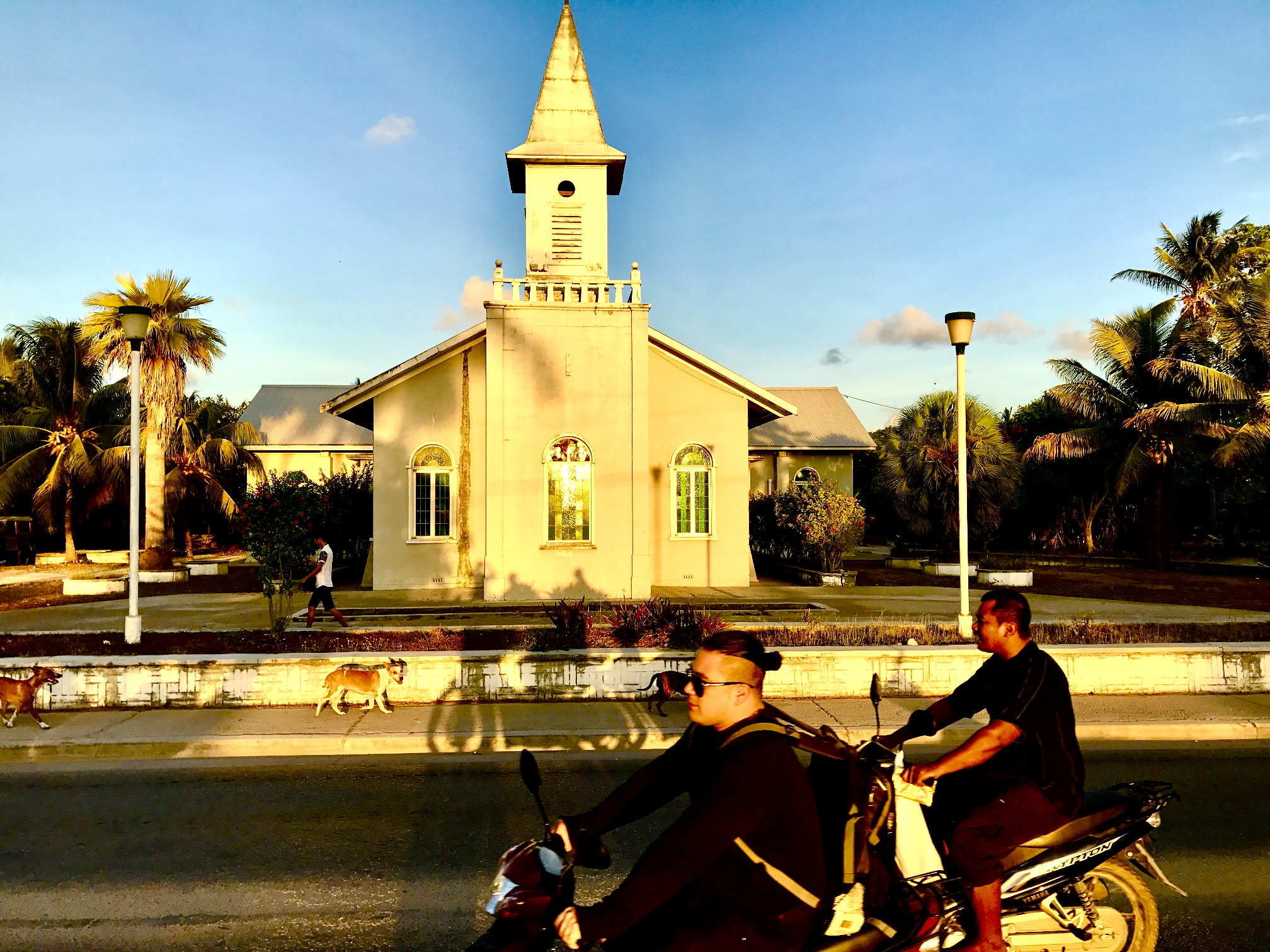
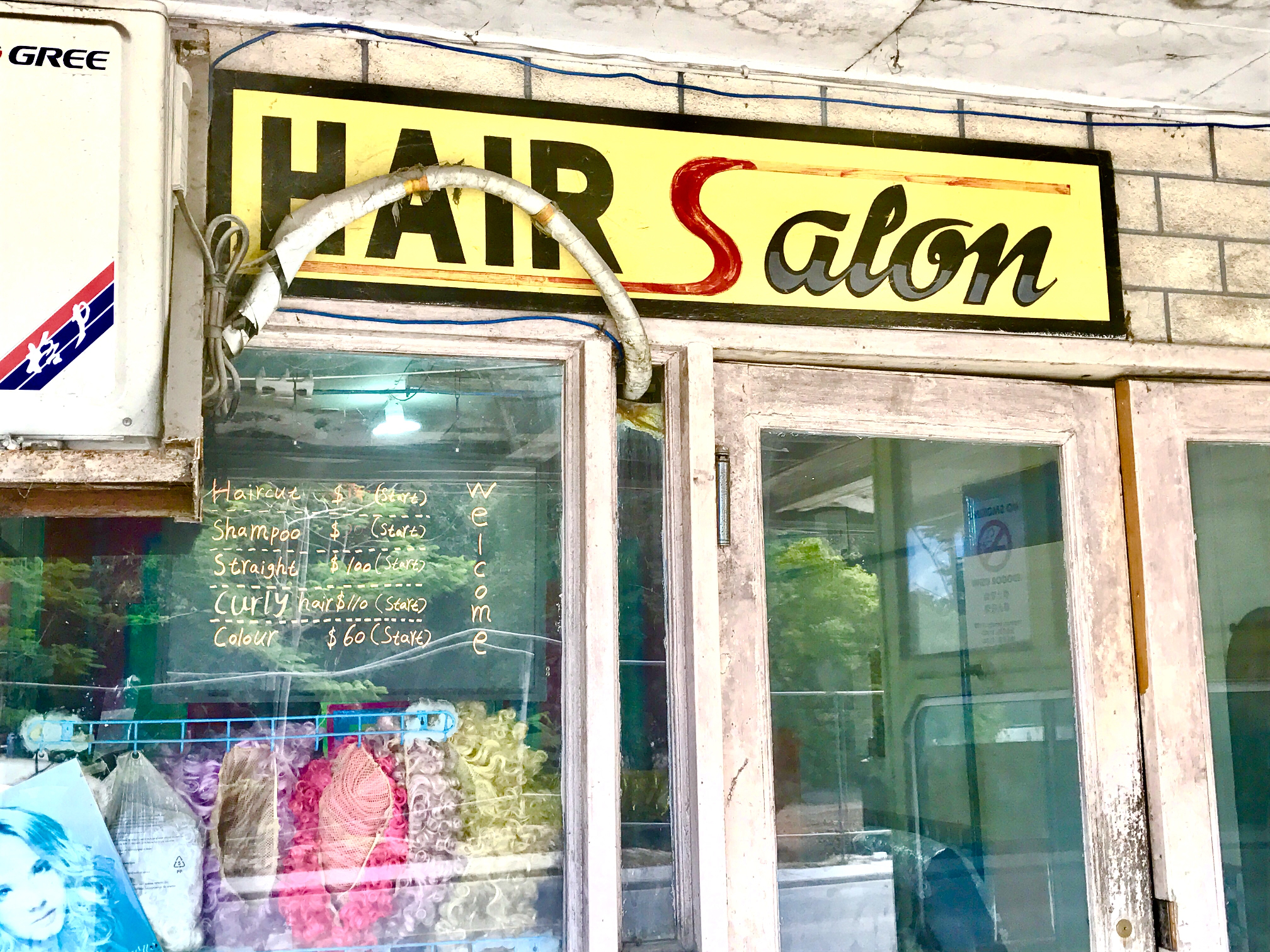
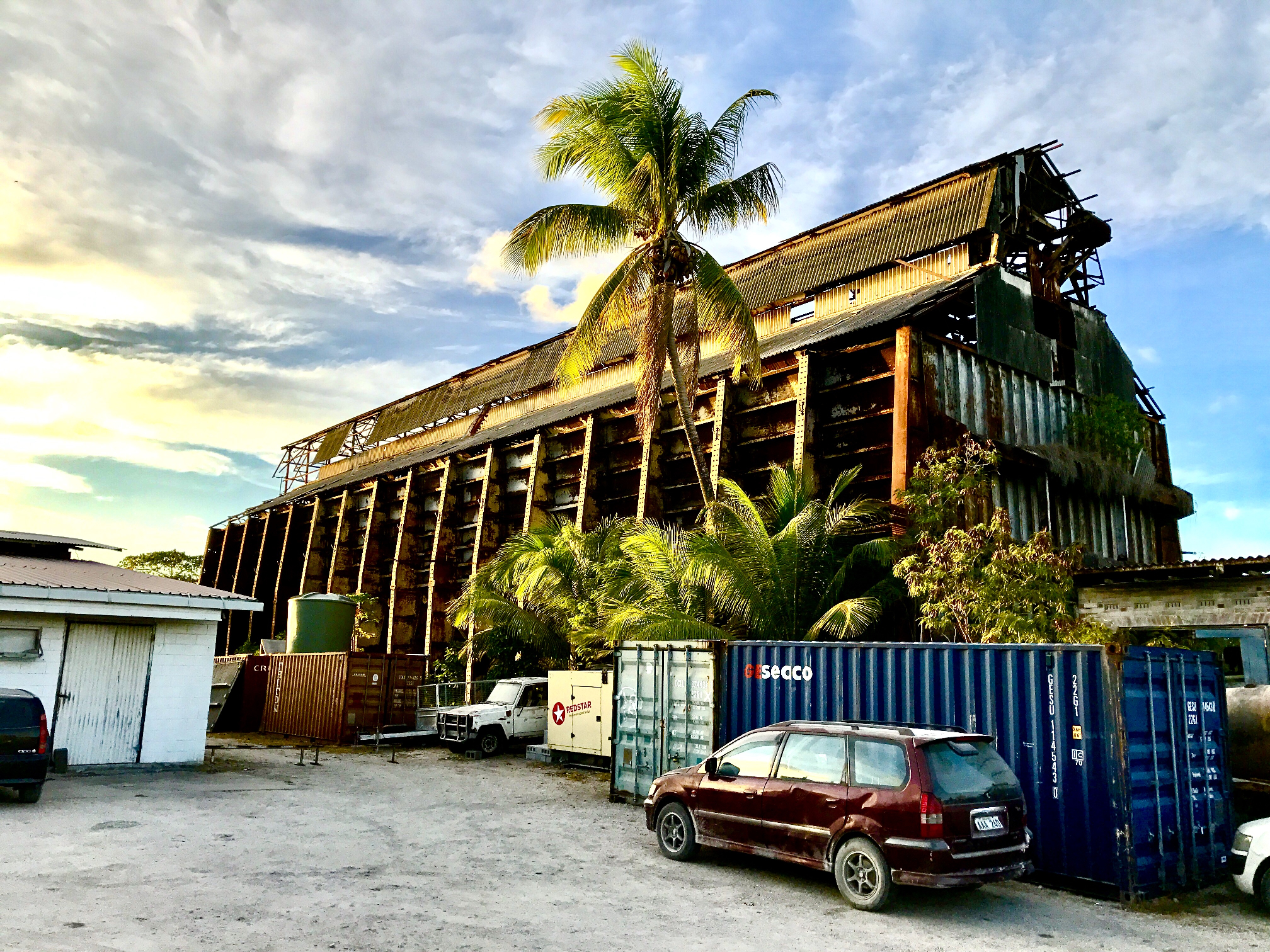
Taking the Plunge
Thanks to Mr. Wong, my pants were secure, my phone was charged, and I was ready to go snorkeling. Most of the beaches I saw in Nauru were full of those phosphate rock death spikes, and pretty desolate; and this wasn’t the way I wanted to die…so I decided to take a dip with the others, back at the Anibare Boat Harbor. Plus, they had lifeguards there if I got into trouble!
The water felt great, but was a little rough that day to snorkel for long. I did spy a few amazing tropical fish, but the word on the street is that you have to swim outside the harbor to see the good stuff. It was just a little bit too rough to do that today.
I did feel really good when I saw some kids use my mask and snorkel. I was done with it, and had set it on the concrete stairs. I witnessed a little girl and boy–must have been 5 or 6–sneak up to it, grab it, try it on, and then have so much fun playing in the water with it. Maybe it was their first time actually “snorkeling,” I’d like to think that. Needless to say, I left without my mask and snorkel. 🙂
I grabbed a beer at The Bay Restaurant in hopes to grab a good Wi-Fi connection and check in at home, but no luck. Wi-Fi on the island was sparse, and where it was offered, it didn’t work half the time. Very frustrating for a Facebook addict like me; I wanted to post my pictures from this incredible island as the trip progressed; but I reckon the lack of internet access helped me stay off the phone and enjoy my time here more. I sipped my cerveza and let the warm breeze dry me off.
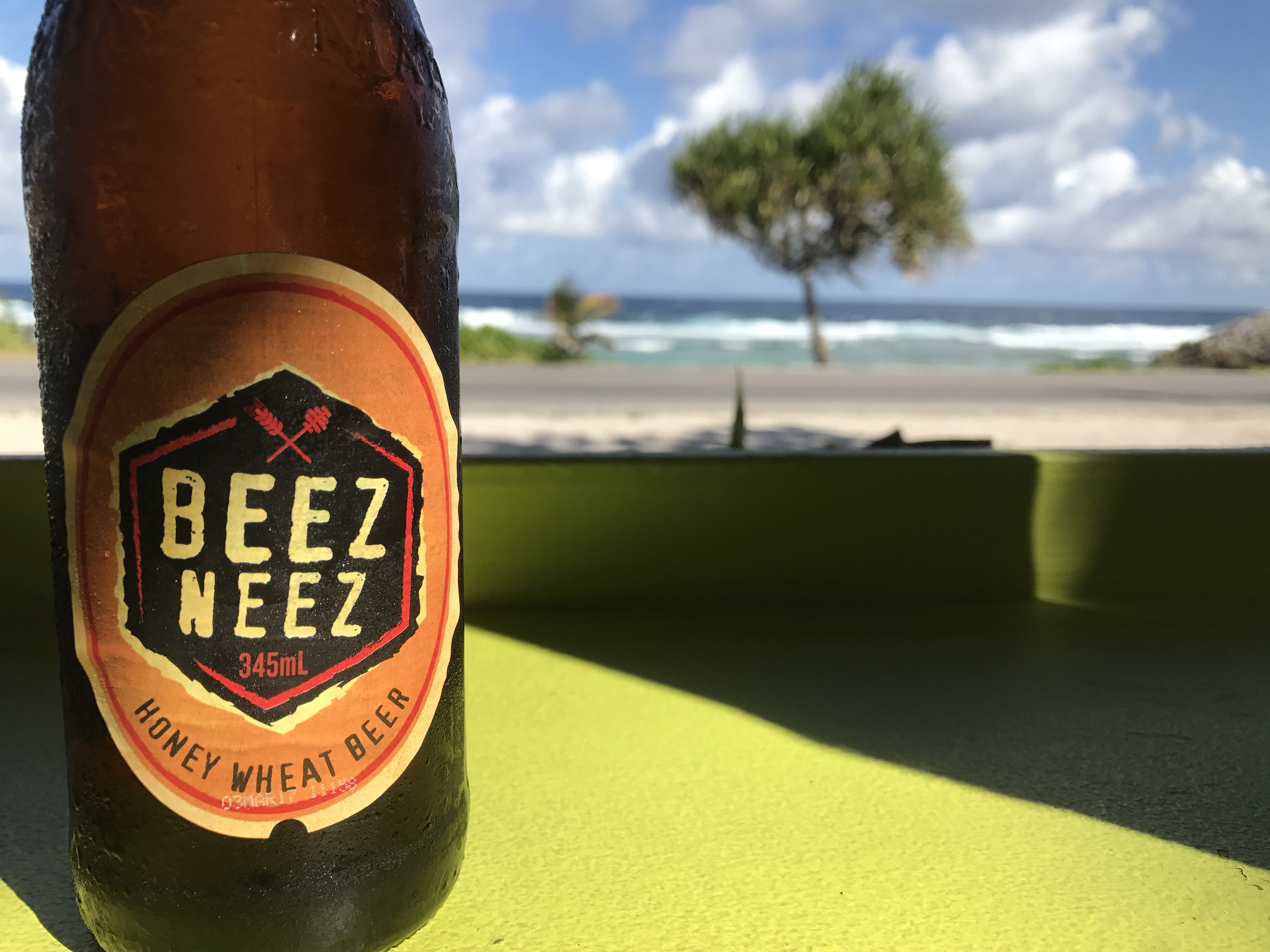
Stuck in a Japanese Prison
Never in my wildest dreams did I ever imagine that I would be trapped in a Japanese prison, but it actually happened.
I got together with some ex-pats that I met earlier in the day. We jumped into someone’s car, and headed to begin our adventure. We were off to see what remained of Japenese prisons, bunkers, a downed plane and a huge hilltop gun. The Japanese had control of the island from ’42 to ’45.
We pulled over a few minutes down the road, exited the vehicle and walked through a small opening of thick vegetation. I would have never found this place on my own, nor dared to venture in solo! We were immediately inside a jungle full of trees and those Tarzan-looking vines. The sun was already setting, and it was much darker inside the woods. A big black dog let us know that we were unwelcome.
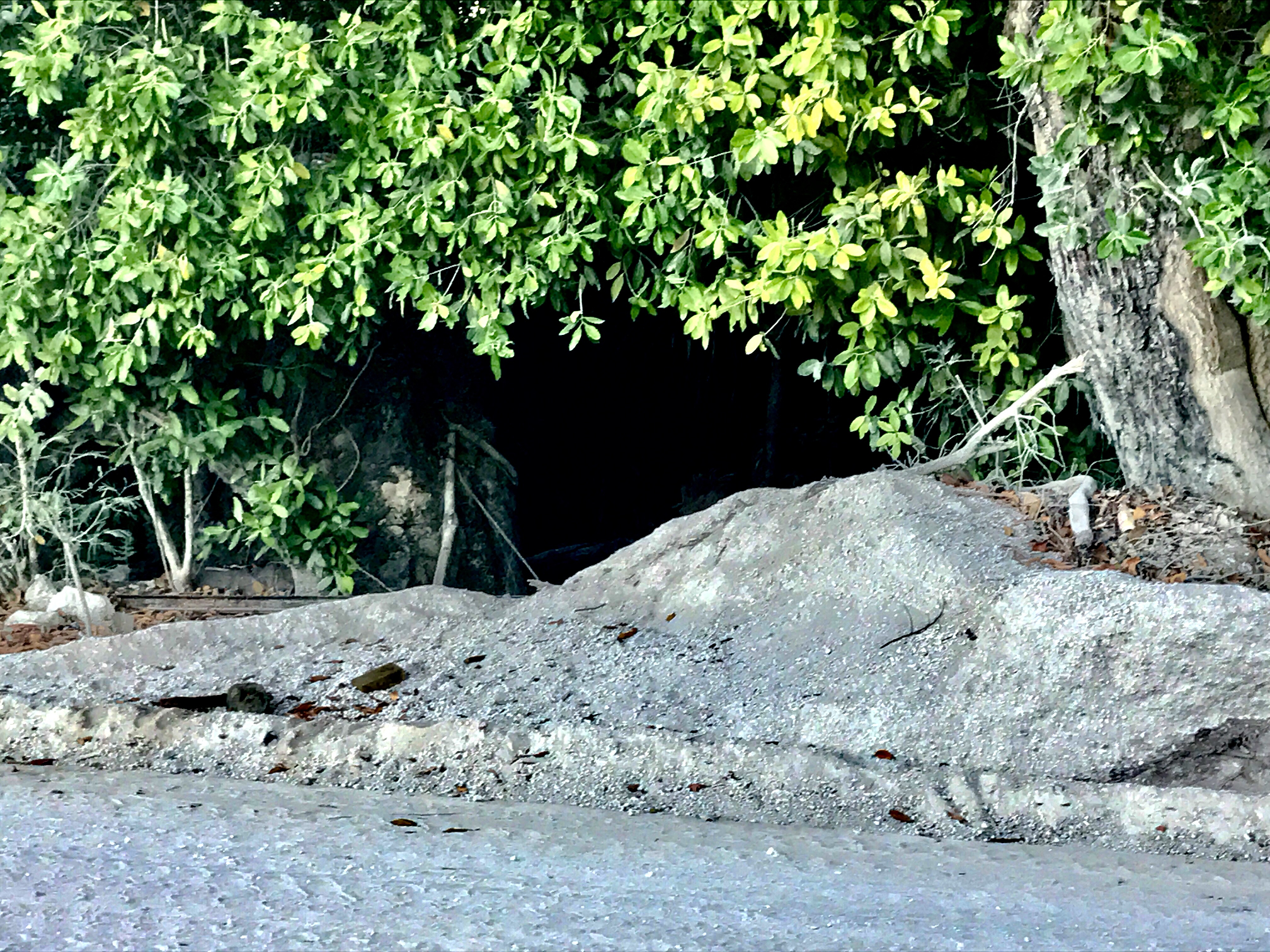
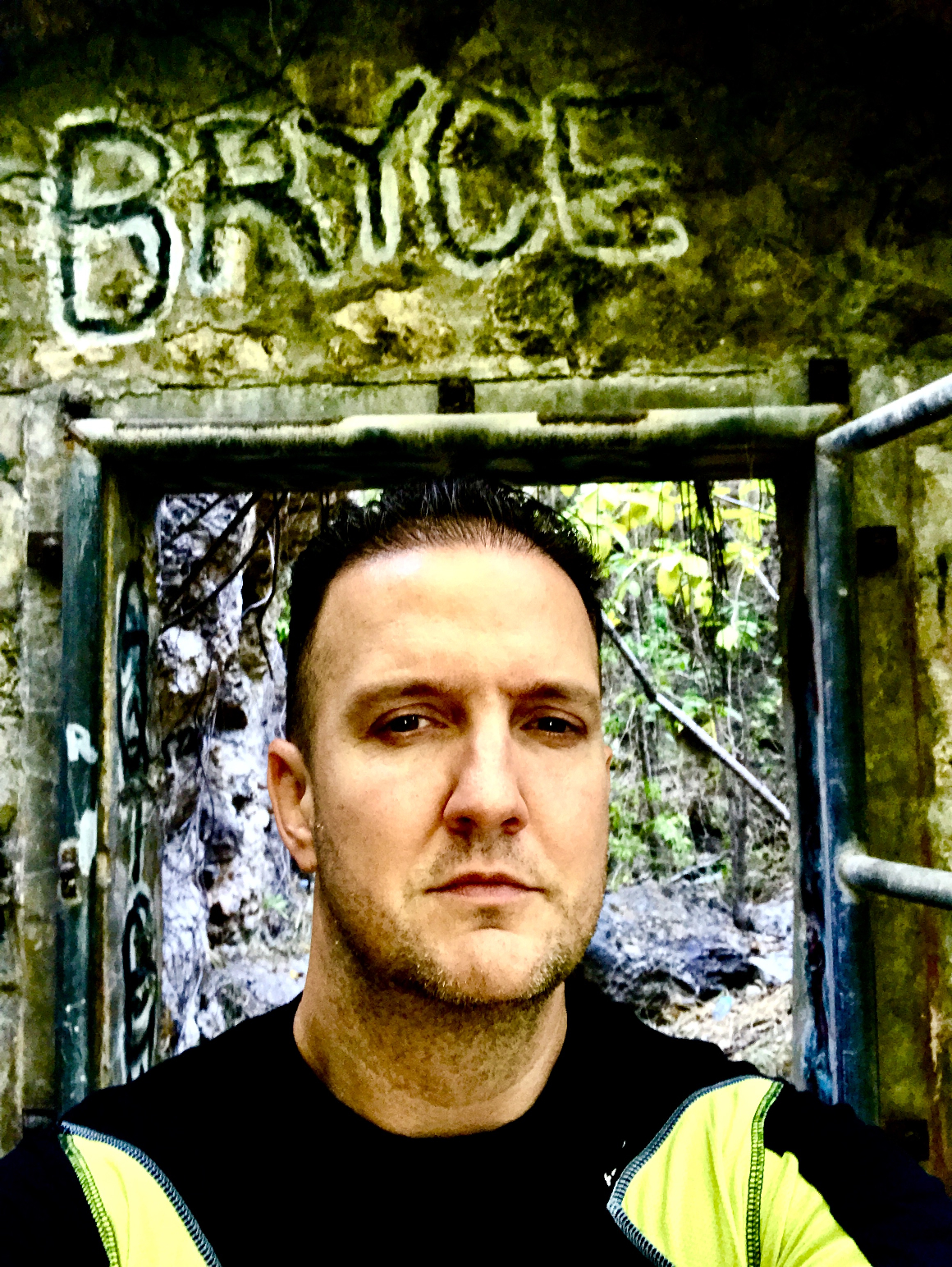
As we marched deeper into the woods, the dog followed, becoming more agitated with us the farther we walked. One of the girls explained the wild dog “situation” on the island, and that people on foot often carry big sticks to defend themselves from these crazy dogs, and I flash-backed to earlier in the afternoon when I thought it was odd seeing a guy jogging past The Bay Restaurant with a big stick in his hand. It all made sense now. And all of a sudden I was wondering why we didn’t have big sticks.
(I WAS ASKED TO REMOVE THIS PARAGRAPH BY THE PERSON WHOM IT WAS ABOUT–FOR RESPECT TO THEIR PRIVACY, THIS ENTIRE PARAGRAPH HAS BEEN DELETED BY ME)
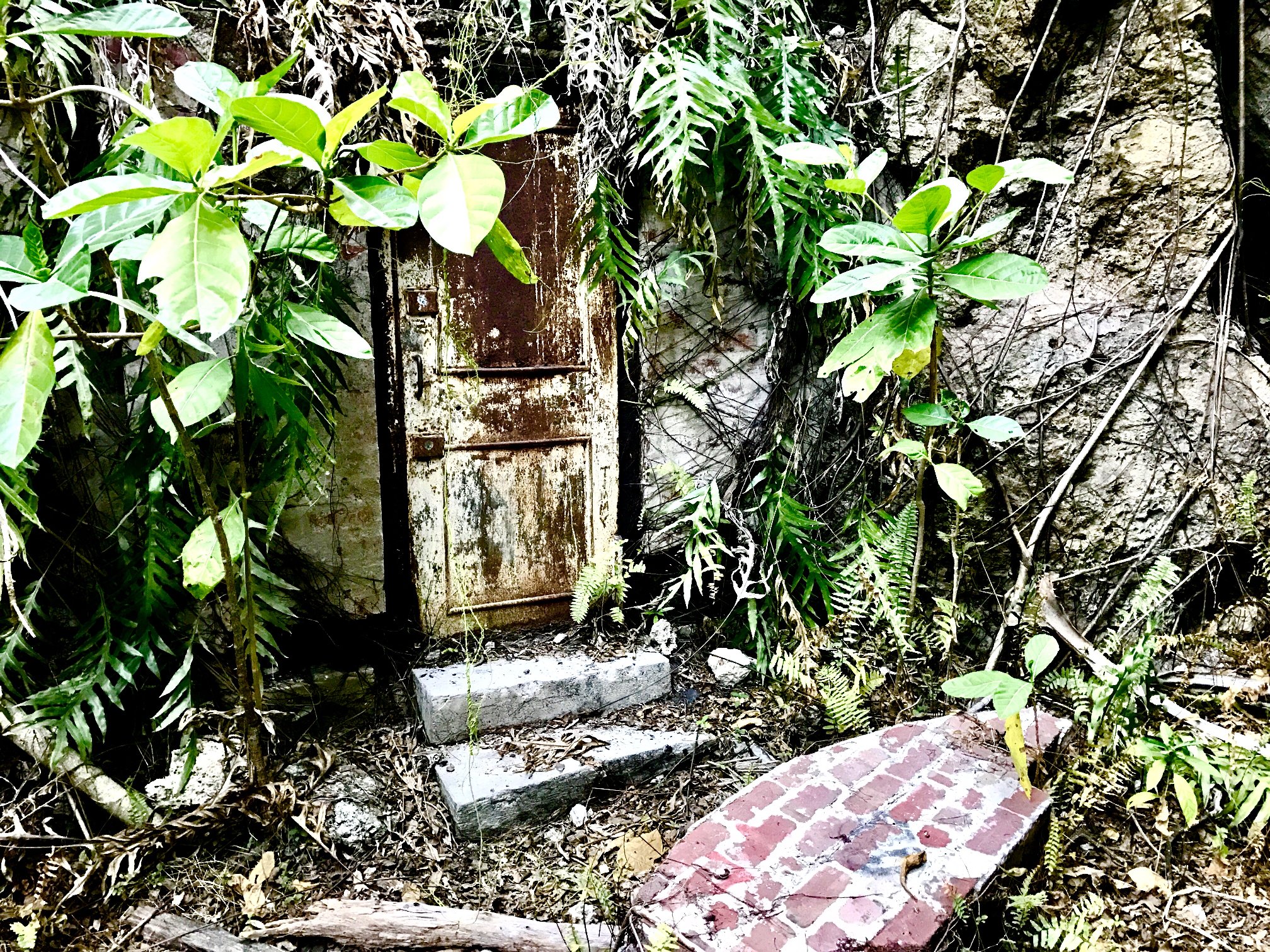
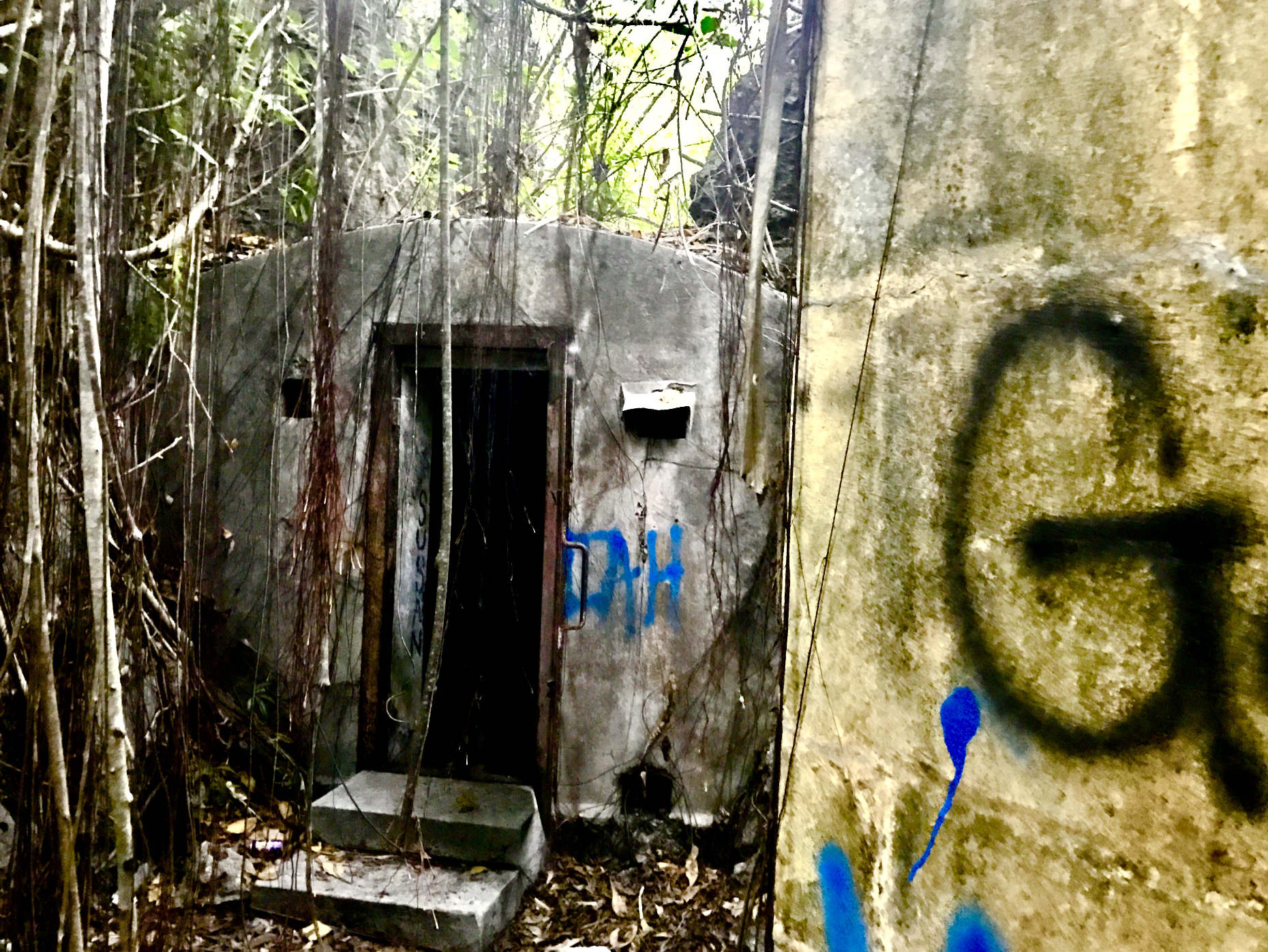
The dog started barking louder and louder, as we proceeded towards some these creepy old Japanese prisons cells. The growls, snarls and barks seemed very serious. But we couldn’t turn around; the dog was behind us and we were now boxed in by concrete walls. One of the girls grabbed a stick.
As the dog came up on our backs even closer, one of the girls turned and raised her stick at the dog, to scare it away. Instead of retreating, it attacked, lunging at her. She screamed and we all ran like hell, without hesitation, into a cell.
(VIDEO WAS DELETED BY REQUEST)
Relax, the dog is okay. But props to John–the local who drove us there–who finally came to rescue us. He doesn’t mess around. He led us out of the cell and when the dog stepped up, John nailed his heiny with a rock. That dog was outta there! Turned out it was only trying to protect its pups. We discovered the litter, later, behind one of the cells.
We continued the hike, deep into the jungle of phosphate and vines, through cracks, crevices and holes, over rocks, and up and down hills. It was one of the most fun treks I’ve ever taken–so windy, so many ups and downs, and I can’t count how many times I had to “suck it in” to squeeze through rocks. I also could have died. It was pretty dangerous. Reminded me of Romancing the Stone.
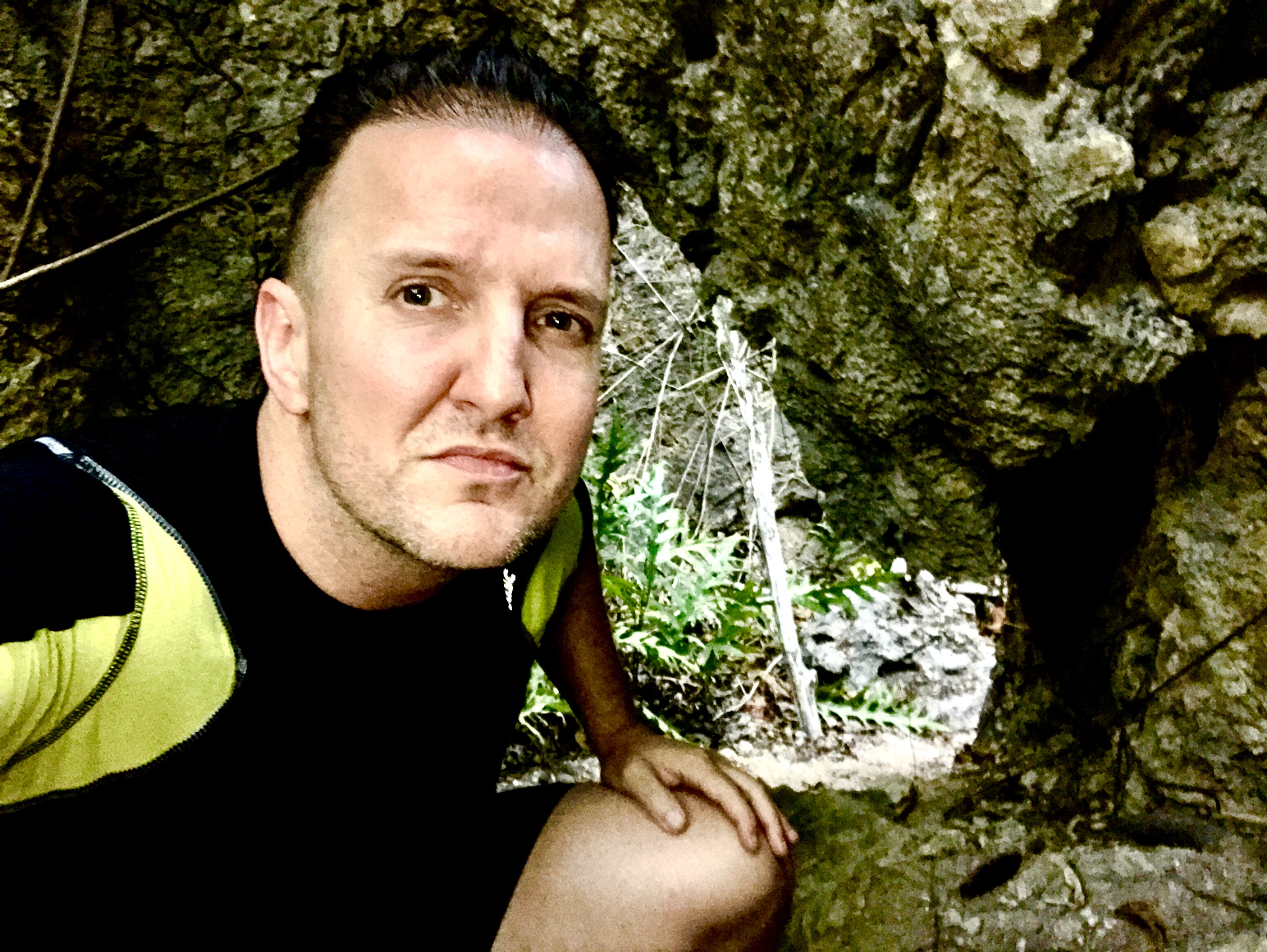
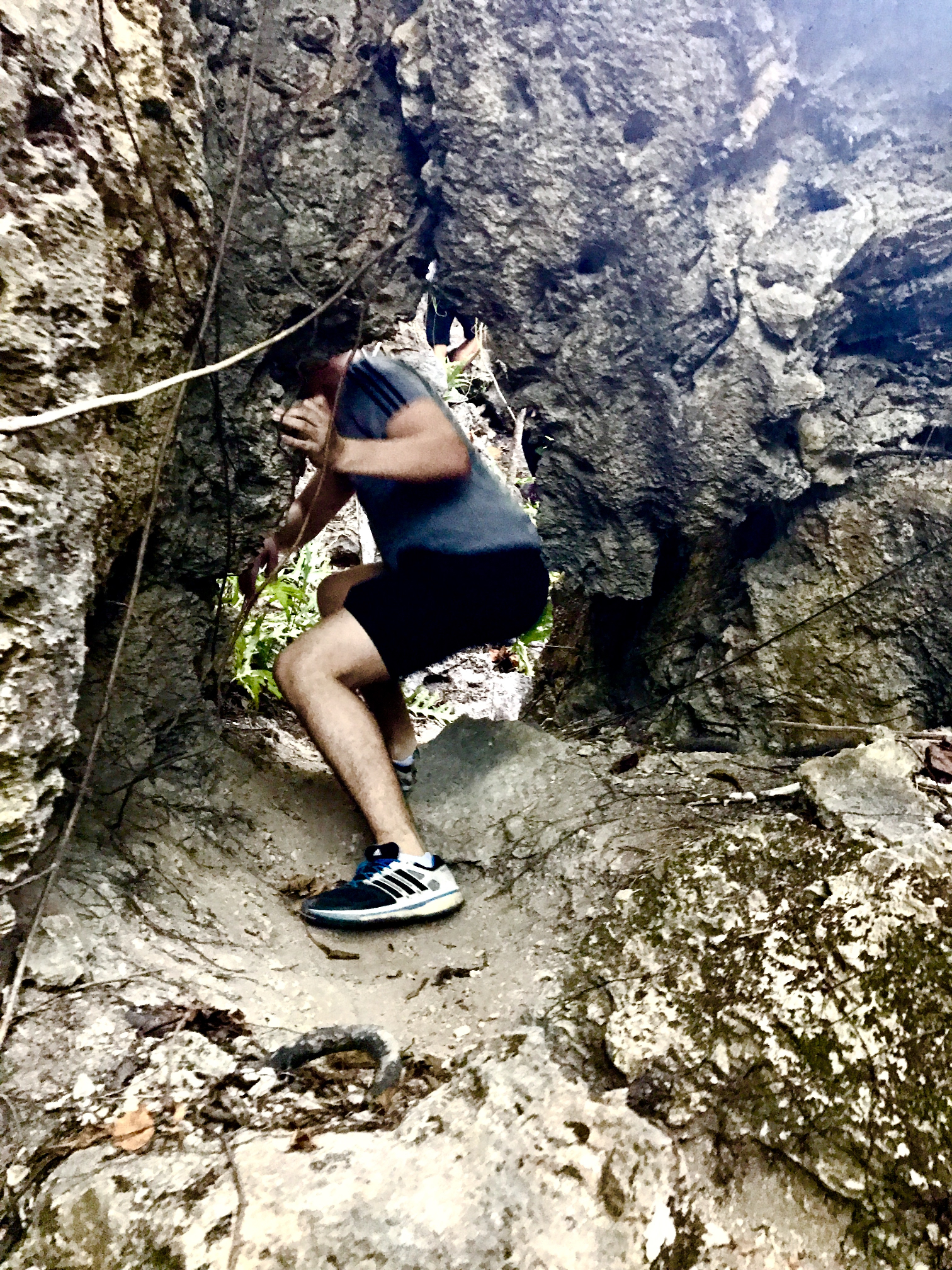
About five or ten minutes into the hike came the airplane wreckage. I couldn’t believe it was still there, from World War II! It was like stepping back into time! I saw wings, engines, all kinds of various parts, still just laying there like it happened yesterday. Crazy!
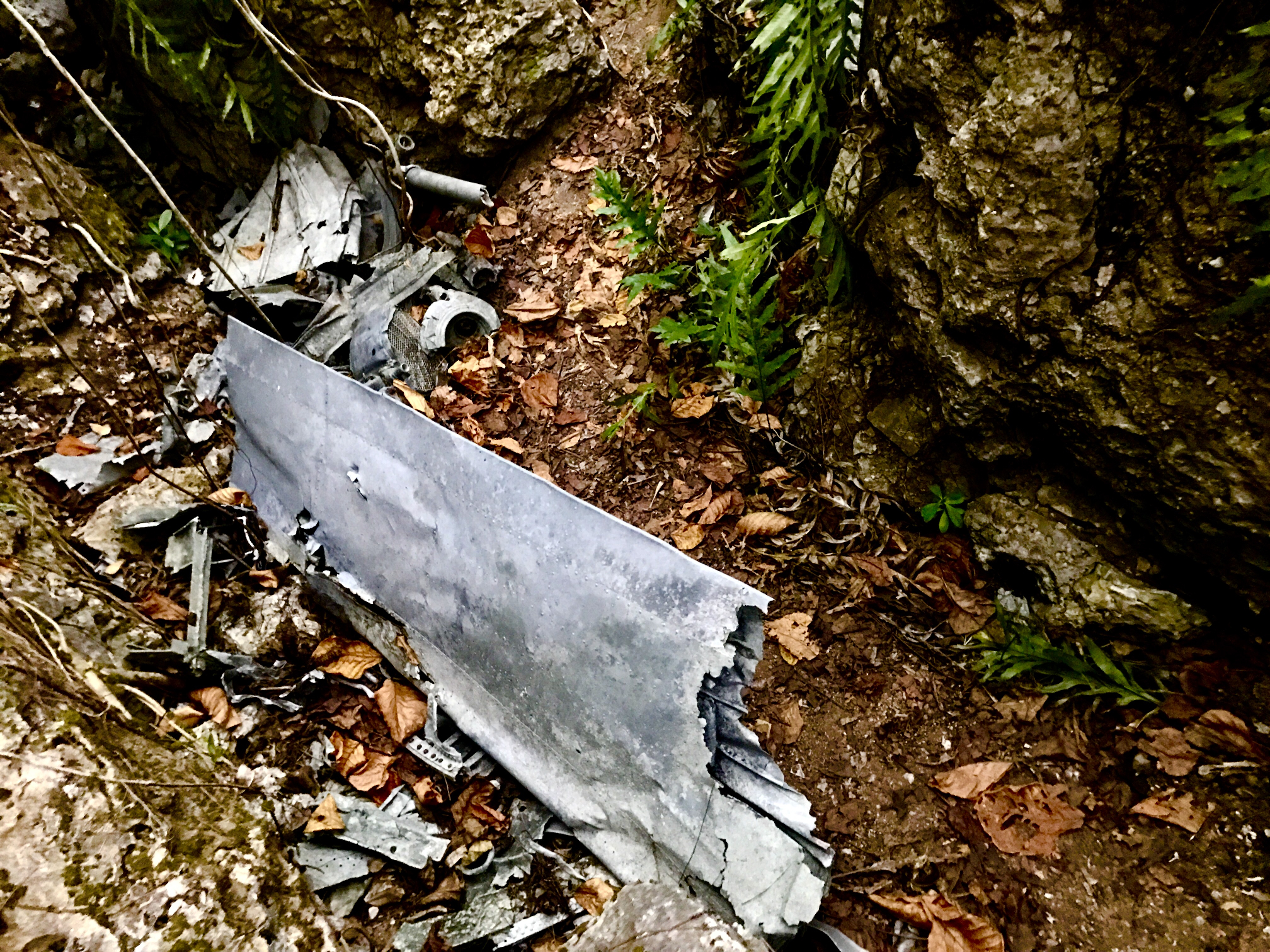
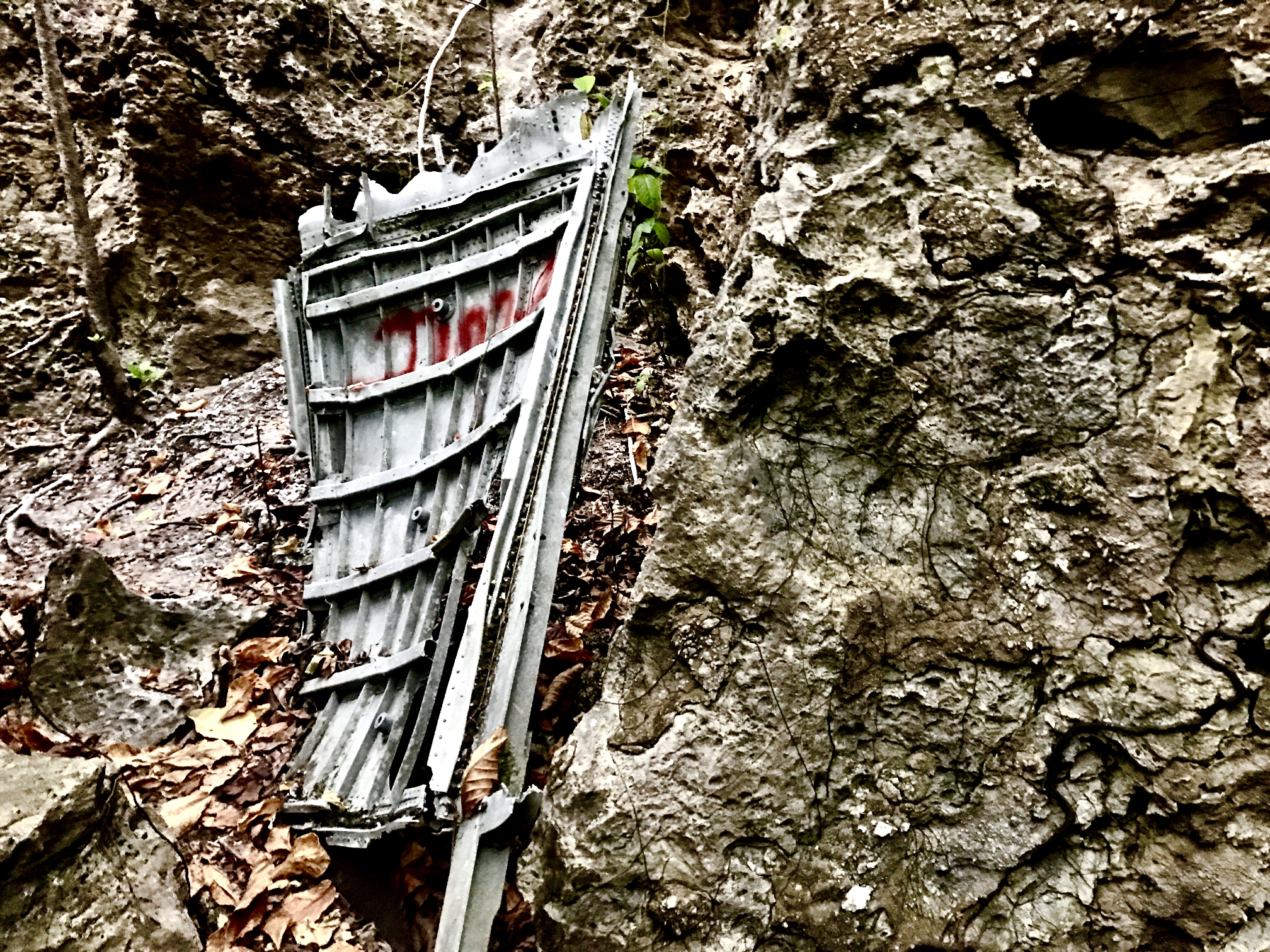
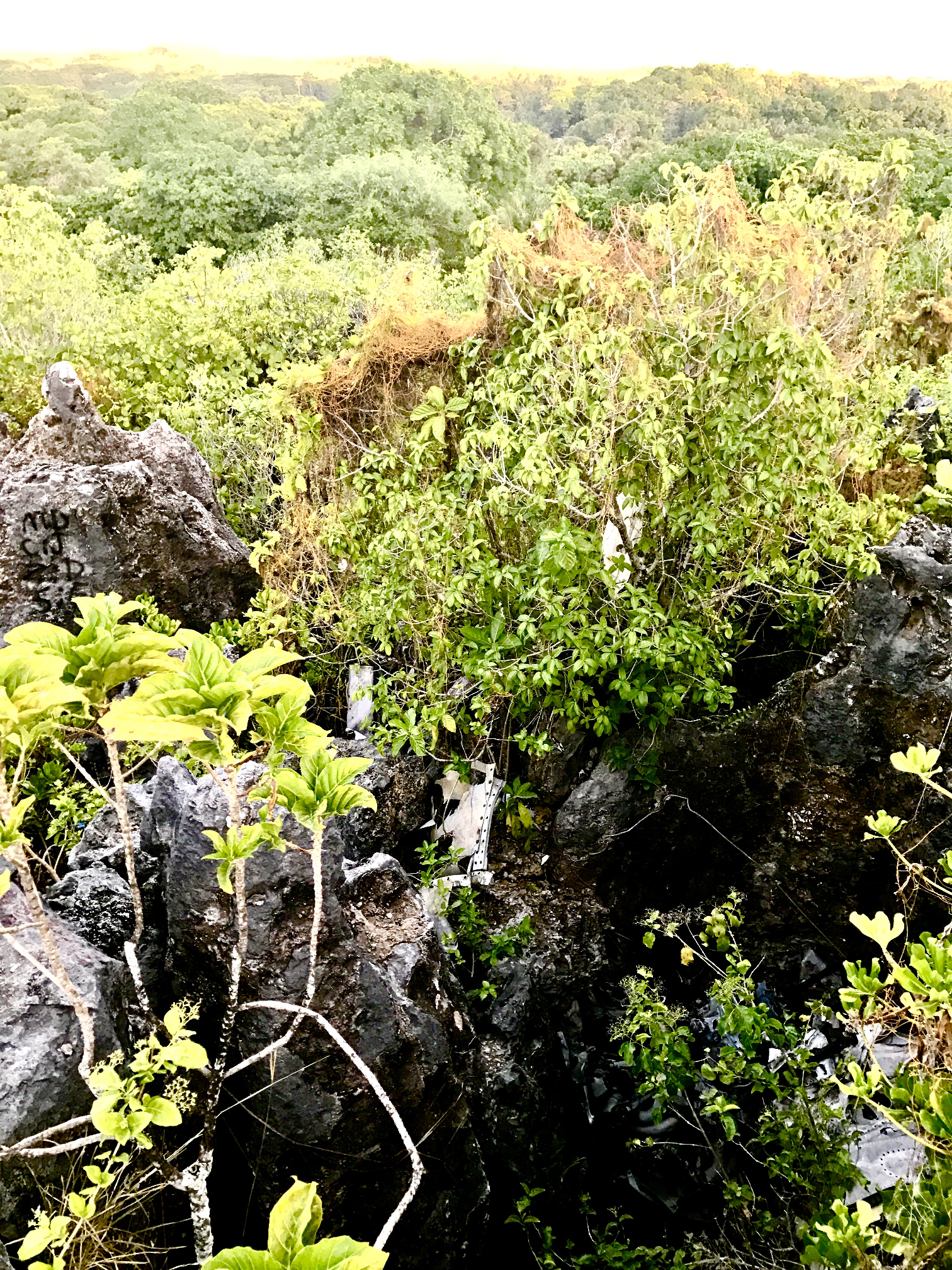
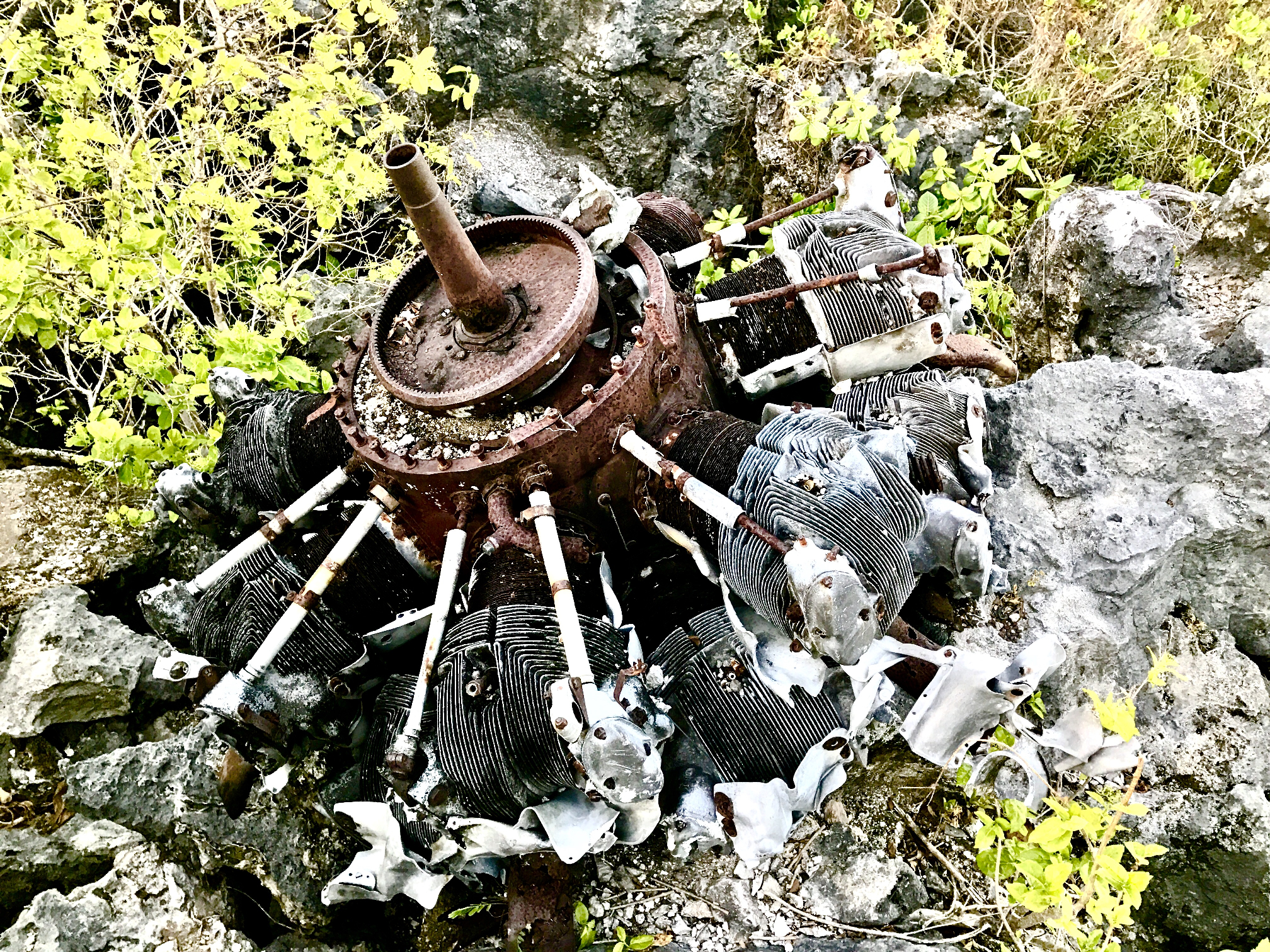
We finally reached the top; a peak with a giant, rusted anti-aircraft gun. So awesome! This is what boys dream of finding! The thing cooler would have been if I could have still shot it, but climbing up on it was pretty darn awesome too! We took selfies, watched an awesome sunset, and laughed about “the dog incident.”
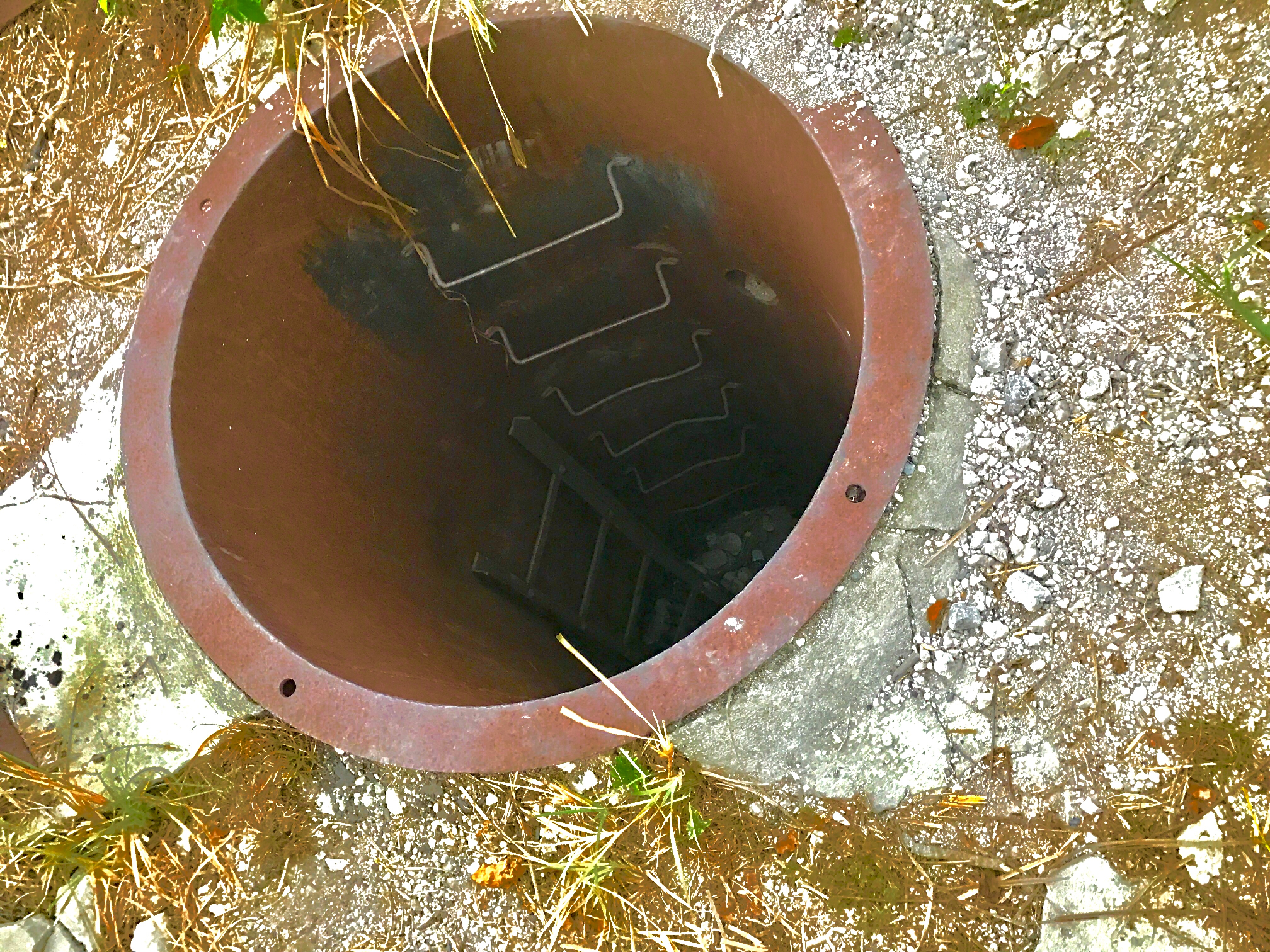
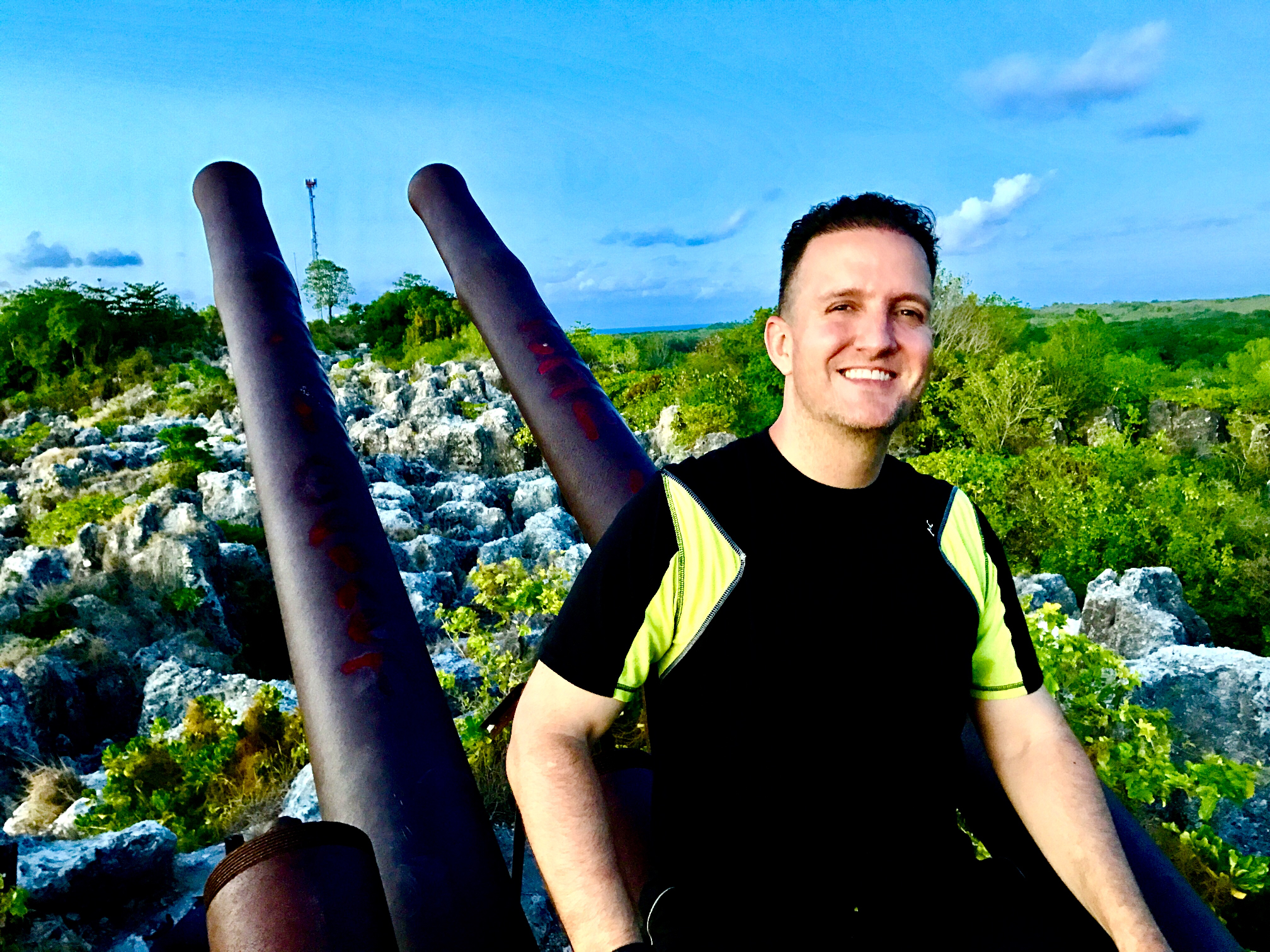
We escaped the jungle just as it was getting dark and cruised back to the hotel for some beers.
We parted ways for dinner; I needed to bring the toys I promised to Adnan; we’d meet at The Bay Restaurant at 8.
Leaving the Menen Hotel, I was beside myself after a near collision with a scooter. To make it worse, on the bike was a man and his small child, seated in front of him, no helmet. It happened so fast. I think I’d become too confident in my left-hand-side-of-the-road-driving skills. I forgot that turning onto a road, into traffic, was backwards too. Without thinking, I pulled out of the Menen, onto the road, nearly clipping the scooter that was turning in. I was probably inches away from hitting them; so close I heard someone on the bike scream in fear. My life would have changed that night if I’d hit that bike. I would have probably seen the inside of a cell too, for I’d just downed a beer and had the empty can with me in the car–only because I couldn’t find a trash can. I wasn’t even buzzed, but the beer on my breath and the open container in the car would have sure been enough to sentence me. I doubt they had any fancy breathalyzer equipment on this island–they would have just assumed I was hammered. The far worse punishment would have been knowing I’d hurt a child. I pictured what might have happened if I would have made contact with that little scooter, and imagined that poor child being thrown in the air, and across the road. It was almost too much to bear. I wouldn’t have been able to live with myself.
I must have driven to The Bay Restaurant at five miles an hour after that near miss. I was shaking the whole way there, my heart was racing, and I had a pit in my stomach. I thanked God for watching over us.
The Interview
Adnan, the 19-year-old refugee from Iran, was there waiting for me, and seemed happy to see me. I asked him to join me at my table and bought him a drink while I scarfed down a pizza. I offered to buy him dinner, but he’d already eaten.
I was amazed at his story. He spent days on a rickety fishing boat, with 65 other people; sailing from Jakarta to Christmas Island to seek asylum from Australia. His father was in politics–the opposing side–and the whole family needed to get the hell outta Dodge to avoid persecution. Sadly, he arrived on land three days too late; Australia had just amended their refugee policy. He and the others would not be granted asylum, but rather shipped off to Nauru.
We must have chatted for an hour. I would’ve liked to have recorded the interview, but was a little nervous, since I knew journalists weren’t allowed on the island. Instead, I just listened. Adnan’s story was incredible. And he was only one of thousands on the island. Earlier that day, I’d met folks from Cameroon, Sudan and Somalia. All with different stories, but the same ending.
Adnan seemed like a good dude. He’d mastered the English language the two years he’d been on the island. Ever hear an Iranian with an Australian accent? It’s a trip! We exchanged contact info and I left him with an assortment of toys. Hopefully we’ll stay in touch; I’m curious and hopeful he’ll have a productive, happy new life.
I headed back to The Menen, again, at five miles an hour, and was relieved when I parked the car for the final time. That would be my last drive. It was home tomorrow.
I had a few more drinks and a couple games of pool (sharing just one horrible cue-stick) with my friends from the hike before making another futile attempt at using some Wi-Fi and then heading to bed.
>>> RELATED ARTICLE: SO YOU WANNA GO TO NAURU? EVERYTHING YOU NEED TO KNOW <<<
Detainment
I woke up on day number three at 6:45AM. It was time to leave. I stumbled out of bed and sloppily threw everything in my bag, as I realized I didn’t have much time to get to the airport. The hotel shuttle dropped me off at the terminal where I headed inside and got in line to clear immigration.
What happened next was a scene straight out of Locked Up Abroad—almost exactly to the tee of what I’d seen on the show so many times. Only I didn’t have any drugs on me, thank God!
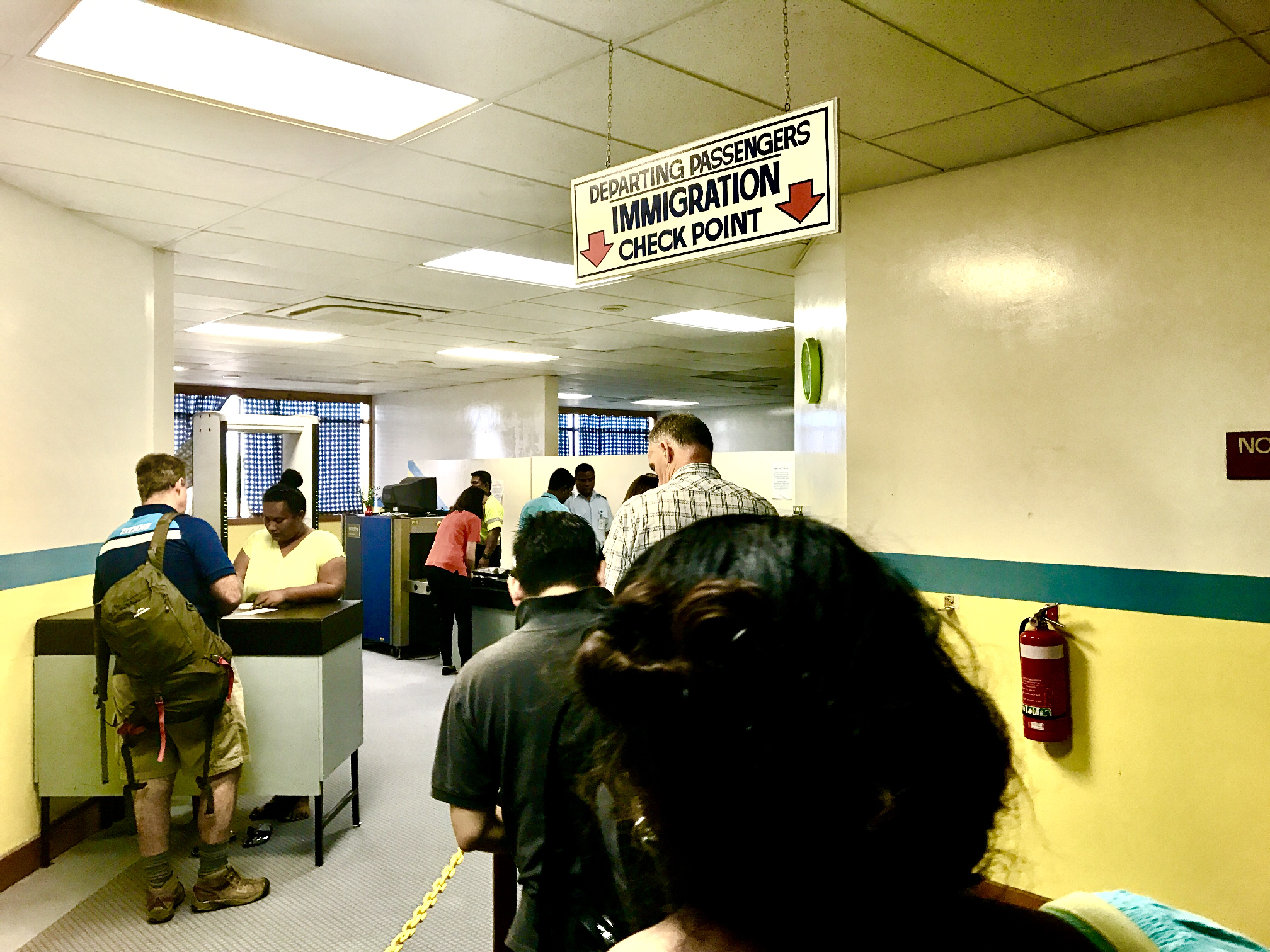
As I approached the immigration podium, the stocky woman with a yellow T-shirt, chest tattoo and semi-lazy eye began leafing through my passport. She asked why I had traveled to Nauru and I quickly answered back, “tourism.” She then proceeded to look down at the passport, and back up me; back down at the passport, and back up at me. She did this three or four times, each time staring a little bit longer. This wasn’t, however, the standard look the officers give when they’re simply trying to match your face with the passport photo. This was a look starkly different, and very concerning. It looked as if she has just recognized a wanted criminal, a man on the run; serving up both a half surprised, and half “Gotcha!” stare. She asked me to wait outside the door. She kept my passport.
I walked out of the immigration area and took a seat, as my mind raced as to what they could be possibly holding me up for. The only thing I could come up with was that they thought I was a journalist. I thought this was something I’d be able to clear up rather quickly. But then I remembered I had spent the last 36 hours conversing with anyone and everyone who would speak to me: locals, social workers, refugee camp workers, and even refugees themselves. And I asked tons of questions. I flashed back to last night when I was sitting at a table with my new friend Adnan, spending at least an hour learning about this story. If I wasn’t guilty of being a journalist, I sure was doing lots of “journalist things.”
Adding insult to injury, it certainly didn’t help that I was indeed with the media, although I’m just a radio DJ who plays music; I don’t report on the news or do any investigative journalism…at least not professionally. But my business cards for my radio stations do say Local Media of San Diego…keyword “media.” I was quickly putting together the pieces in my head, while texting home to tell my boss that I was possibly about to be detained. Who knows if they’d take my phone and keep me; I needed to get word home that something wasn’t right.
In true lockstep with almost every Locked Up Abroad episode, the lady emerged from the immigration checkpoint, this time with a male officer, who looked much more official. They asked me to “follow us,” and led me into a side door, down some stairs, and into a small office with no windows in the bowels on the airport. Yup, this is Locked Up Abroad in almost every way. I couldn’t believe what was happening, I’d played out this scene in my head a million times, and now it was happening in real life.
My plane was due to leave in just 35 minutes, and I was freaking out, already assuming they’d be keeping me well past my departure time. There wouldn’t be another flight out for days. I sat on a wooden chair and the questions began. I glanced down at the male officer’s badge and was a little relieved. It was Rajeev, the gentleman who approved my visa in the first place. I felt we had established a decent rapport during my original visa application process, weeks ago, done via email from the US.
Rajeev and I must have corresponded four or five times, as he would send me forms to fill out, and I would send them back, along with letters of employment and the bank wire confirmation for the $50 visa fee. Every time I’d email Rajeev, I’d always thank him and mention how delighted I was to be able to see Nauru; I was always very respectful and gracious, and at this moment, I’d hoped he’d remember.
I sat in that chair in front of Rajeev and the lady, and in true Locked Up Abroad fashion, the questions began. It was a bonafide good cop-bad cop interrogation, just like in the movies. Rajeev was the good cop, while the lady really had it in for me. She was so suspicious and mistrusting of me, as she inquired why I was in Nauru over and over, never accepting my truthful responses. I explained—slowly, as if I wasn’t sure of her English level—that I simply had a passion for world travel and was out to see all 196 countries in the world. She just couldn’t grasp that concept and again asked, “But why Nauru?” I then explained that I had found a website that listed The Top 25 Least-Visited Countries, and that Nauru was #1; and that was my inspiration to see the island. She still wasn’t buying it and had no problem telling me this.
I remember telling the lady that no one in America has even heard of Nauru, and she barked back, saying, “Of course everyone knows about Nauru!”
Rajeev questioned me about my cameras and video recorders, and what photos and video I took. I was soon going through all of my material with him, including the videos on my GoPro and all the pics and videos on my iPhone. Thank goodness 99% of them were just tourist stuff. No naked pics either. That would’ve been weird! It was very invasive, but I didn’t have any rights in Nauru.
I tried to keep a friendly and non-defensive attitude the whole time, proudly showing him my pictures of the beaches, restaurants, lagoon, and mountain hike. He stopped on a few video thumbnails and asked me to play them for him. One was the video of me at Mr. Wong’s store, and as soon as he saw the first few seconds, he said it was fine. Another thumbnail he asked me to select was a picture I took of one of the mines. That too was fine. I was hoping he didn’t ask to see the video of me outside the refugee camp talking about my experience at the gate. Even though it was only footage of me talking in the car, with no scenes of even the front gate of the camp, I was afraid its journalistic-like commentary would’ve for sure raised another red flag.
Just as I thought things were going as smooth as they could have been considering the situation, both Rajeev and the lady seemed alarmed when they came upon the photos with me and the folks from Connect. This really seemed to step up the concern. They wanted to know everything: how I met them, when I met them, where I met them, what we talked about, where we went and what we did. They were also hell-bent on finding out which locals I talked to. I was completely honest with all of my responses, and continued to try and show that I was just a curious tourist; although I did not mention my conversations with any of the refugees. That would have been just asking for it.
I did mention that I approached the refugee camp’s gate and talked to the guards. I wanted to be 100% transparent; maybe they already knew I had been to the camp.
The lady asked how I got around the island, and I told her I rented a car. This upset her even more. She sternly asked why I decided to explore on my own, instead of booking a tour through the hotel; kind of like a “how dare you see the island without a guide” talk. I told her I didn’t even know the hotel offered tours. But no answer was good enough for her. She was really doing her best to try and “uncover” something.
Rajeev then asked if he could check my bag. He wanted to see if I had any other cameras. I obliged, and showed him that I had nothing but socks, underwear, trunks and flip-flops.
He asked to see my business card, and this posed a whole other set of problems. While I am not a journalist and don’t work for a news agency, as expected, the fact that the word “media” was boldly printed on the center of my business card didn’t help.
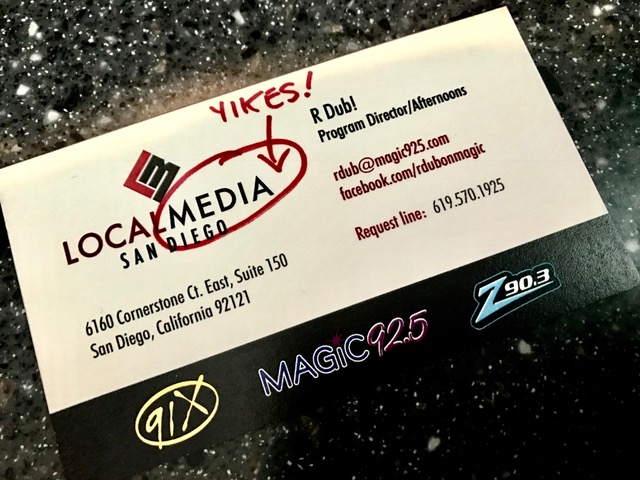
Rajeev asked me to explain my line of work, and I did, explaining that I play music; that I’m just a “DJ.” The lady was having a hard time understanding this. Rajeev then took out his phone and started doing a Google search for my company. The only thing we were able to find was the LinkedIn profile for Local Media of San Diego, as all of our websites are radio-station specific; we don’t have one “main” website for the company, per se. At that moment, I was sure wishing we did!
The questioning went on for about 15 more minutes or so. And while I could write some sensational story about how scared I was about being detained and held on the island, my common sense took over and put my mind at ease. This was not Venezuela, Russia or North Korea, where I could have just “disappeared” to God knows where. Australia plays a big part of the systems in Nauru, and I am aware that US-Australian relations are some of the best on the planet. This will sound arrogant, but I was certain that the US and Australia would not tolerate the tiny piss-ant country* of Nauru holding any American whose only crime was wanting to see their island as a tourist. (*no offense, I was just frustrated at immigration when I wrote this)
Don’t get me wrong, I certainly was a little freaked out, if only for the possibility of missing my flight and throwing the rest of my travel off: I was set to travel back home the next day and be back at work at Monday. I couldn’t afford to be stuck in Nauru, if only three more days until the next flight. I needed to leave today! And the lady immigration officer was grilling me like I was suspected of espionage; a spy, attempting to overthrow the nation. No answer seemed good enough for her and I could tell she thought I was not here for “tourism.”
But I must admit, that a tiny part of me actually did want to be detained. If there was anywhere in the world I’d want to be kept, it was here in Nauru. Maybe I’m being foolishly optimistic, but I imagine the jail here wouldn’t be so bad. In fact, maybe they’d even let an American like me—not accused of smuggling drugs or anything crazy—stay at the hotel while things were sorted out. It’s not like there’d be anywhere for me to escape. Also, the whole thing sure would have made a great story. I mean, who even goes to Nauru, much less gets detained there. Would Lester Holt come looking for me?
The two finally left the room and there I was all alone, sitting in this wooden chair, awaiting my sentence. Oh how I wanted to snap a picture or video of myself in this room, but I was already in hot water. I just sat there with my hands folded, anticipating the verdict.
A few minutes later, both of the officers walked in and told me to grab my stuff. I wasn’t sure if I was going to jail, or to my awaiting plane. Luckily it was the latter, as they both escorted me back upstairs and into the immigration line again. I shook Rajeev’s hand and told him I was sorry if I did anything wrong, and that I’d love to visit again. He apologized for the inconvenience and explained they were just making sure everything was on the up and up. I have to say, Rajeev really was pleasant the entire time.
When I finally stepped up to the immigration podium, for the second time, my female interrogator was already back at her post, and facing me. Her partner reviewed my exit documents and stamped my passport. I turned to my former captor and asked aloud, “So we friends now?” Everyone let out a laugh and she cracked a smile. Well played Nauru, well played.
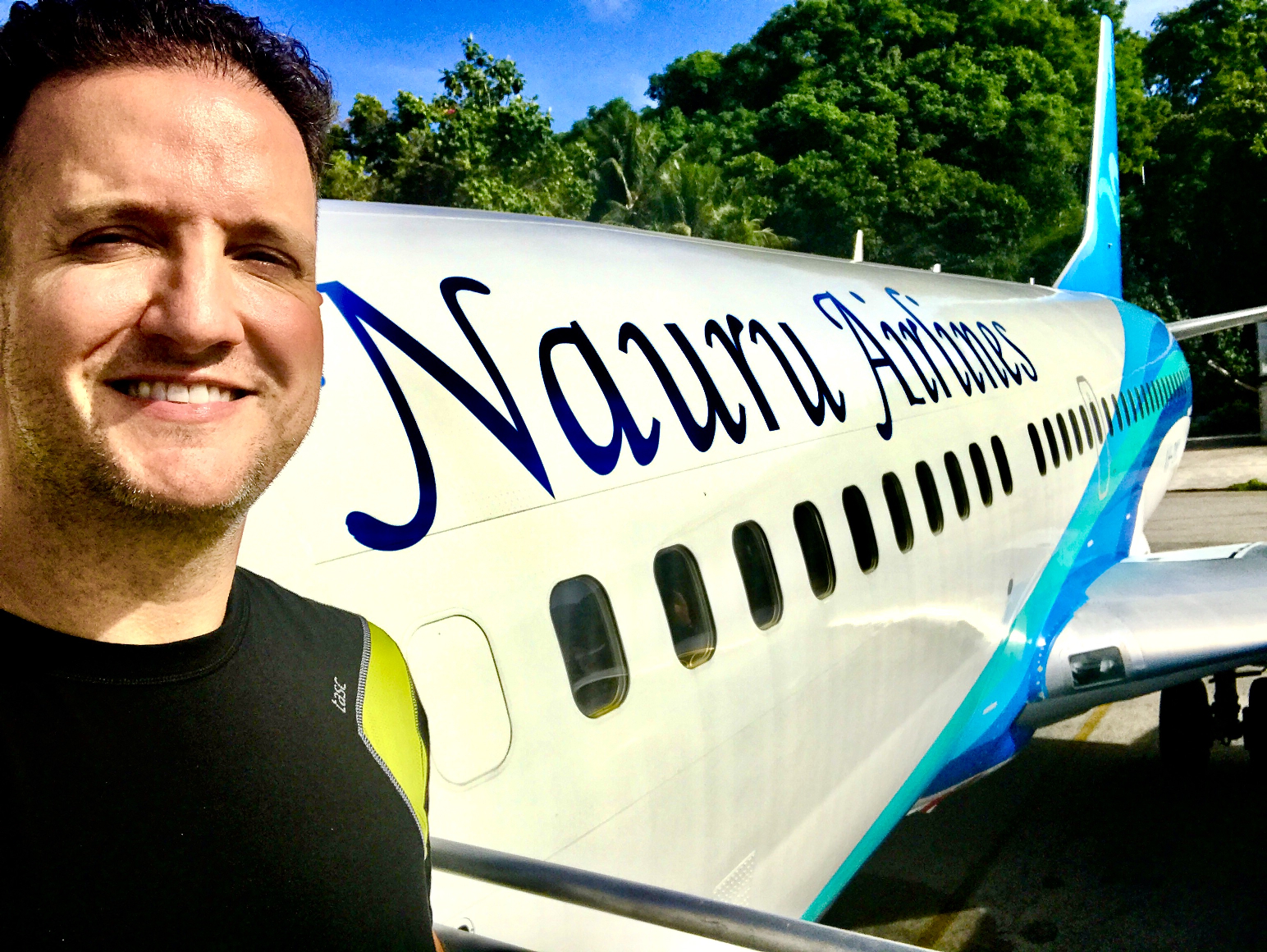
Update…November 30th, 2016:
When I published this article about Nauru two days ago, I had no idea what people (Nauruans, specifically) would think about it. From the trouble I received trying to leave (interrogated and accused of being a journalist) and the feedback I received by a couple people in the piece who wanted their names and photos removed, I feared the people of Nauru wouldn’t like my blog. I was even a little apprehensive to publish it…I didn’t want anyone to feel insulted or disrespected.
I must say, I am both surprised and overjoyed at the number of positive messages I’ve received from Nauruans since publishing this article. So many people from Nauru have told me they’re glad that someone finally has something nice to say about their country–and that most of the other articles have all been negative. I wasn’t even thinking about this when I wrote my blog…I was simply taking notes on what I saw and how I felt while in Nauru. Nothing else! I’m happy to say that out of the 61 countries I’ve visited, Nauru goes down as one of my absolute favorites; possibly THE best one so far.
I want to thank everyone who’s contacted me about the article, and everyone who’s shared it on Facebook. If there’s anything I can ever do, please reach out. I’ll continue to spread the good word about your absolutely stunning island nation.
All the best,
Randy
P.S. You can find me on Facebook HERE.
– – – – – – – – – – – – – – –
Intrigued with Nauru yet? Wanna know more? Here is some really good stuff:
-A Current Affair: Inside Nauru’s Detention Centre

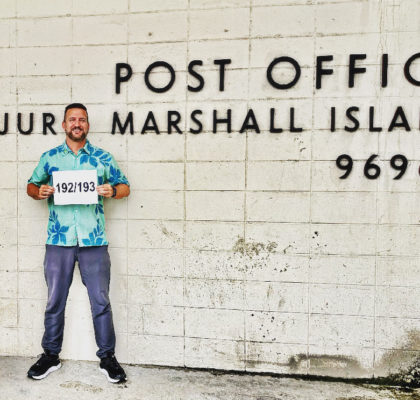

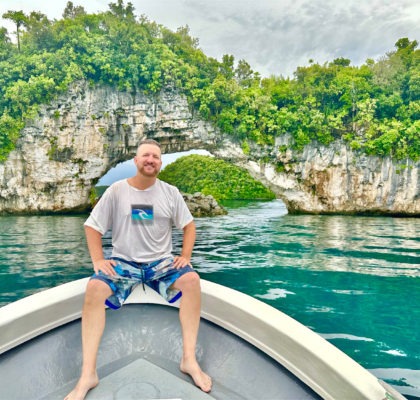
Although I am aware of Nauru because of my love for International travel and following other travel bloggers, this is by far the most comprehensive post I have ever read about this tiny Pacific nation. I have a million different questions about the country, but the first one is how difficult was it for you to get a Visa to Nauru? Does the difficulty come from the lack of information online and lack of Nauru Embassies worldwide? Or did you feel like Nauru tries to do whatever it takes to prevent visitors from coming, like Saudi Arabia and Angola, for example?
Man, thank you so much! Would you please share with others?
Actually, it was quite easy. I just emailed the address on the website for the visa, they sent the forms, I sent them back (with reservation confirmations), they sent me an invoice, I paid it and sent them the receipt…and then they sent the visa! It was all pretty simple and Rajeev was very helpful and responsive.
I thoroughly enjoyed your blog, I am a Nauruan living in Australia. I still get back to the island once or twice a year to visit Mum and my big extended family and your article just made me so homesick. Thank you so much for your very interesting, humorous and enlightening piece, there should be more people like you around to give the real story of what it is really like on Nauru. The media does not always portray my small island fairly. It is a really special place to me and the people are incredibly unique and wonderful in their own Nauruan way. Love your work and looking forward to reading more of your blogs now… Tarrawong (See you later).
That means so much, thank you!!!
Another fantastic read, R! Love the stories and the pics that go with them. Makes me want to get all my camera gear and go on some of these adventures.
What about Antarctica? I know… not a country… BUT… I have seen trips/tours advertised for as a little as $6000! 🙂
My man! And YES…I will be seeing Antarctica!
Love this blog R-Dub!
Thanks Jim!!!
I am a Nauru and dude your blog is frankly straight forward and It awesome… I like your blog and would have rated it 5 star should there be a system add on this page. Because honestly, I have seen others talking about our country and it seems they hated us even though we don’t know them and they us lol But anyways, that is their right, whether the like us or not, life goes on… lol
Dexter, you are the man! Thank you so much for the kind words. I just noted everything I saw and felt. If only I could have stayed longer. I do wish I was able to meet more locals like yourself. Maybe next time, I hope! God bless you.
Aside from the solar powered street lights, did you find out any more about the significance of Nauru’s relationship with Taiwan? It does seem really strange and random that they have an embassy there, but no other country does. Or at least from what I can tell from your story.
I need to dig a little deeper, I’m sure the info is out there…but no, I didn’t find out just yet. Great question!
The People’s Republic of China and The Republic of China (Taiwan) have been fighting for representation in the United Nations for decades. Nauru, regardless of how small of it has a say in the UN. In fact it has a disproportionate amount of representation in the UN for its population size. Given that fact, it is in ROC’s interest to give aid in order to win Nauru’s favor. Unfortunately ROC is losing that fight as many other small countries like Sao Tome and Vanuatu who had previously been great friends with/supporters of ROC have recently sold their loyalty to the Chinese Communist$.
Thanks Shawn!
Great post! You have an eye for a good photo and it’s an entertaining read. More importantly I really got a feel of what it’s like in Nauru. Wow! What a strange world we live in.
Thank you so much Diana, really appreciate it!
This was an awesom read!!!
You have to look up the island of Rotuma!!!!
Ooooh, I just looked it up…it looks amazing! Do you live there?
Wow, I cannot believe I read it all. I thought I’d just skim through it. But it was very interesting and a great read. Enjoy your travels and stay safe.
Thanks so much for taking the time! God bless!
Hi Ramblin Man, I’m 18 yrs of age and I’m a Citizen of Nauru. I want to thank you for taking this adventure on our Island home, hope that your next mission you won’t get into “Immigration Cops” Lols anyway enjoyed reading your blog God Bless.
Sacson, it’s a pleasure to know you. Thanks for reading my article and for the positive vibes! I hope to run into you next time I’m on the island!
Great blog Ramblin’ man. I have shown it to my friends as it saves time when they ask me what Nauru is all about- I work there.
keep up the good work; a really interesting account.
Thank you Jack! Appreciate you checking out my piece, and sharing it. Would love to hear more about what you do on the island, if you’re ever at liberty to discuss. All the best.
I lived in Nauru for one year. Your article certainly brings back many memories and my old haunts! However it’s very different actually living and working on the island compared to being a tourist.
Thanks for checking out my piece. And you’re right…I ended up moving to my favorite vacation spot years ago, and the experience of every day life vs. a quick care-free vacation is such a difference. Would love to hear more about your year in Nauru and what did there, if you ever care to share.
Hi Rambiln……I really enjoyed your blog…thank you.
Thank you!
Hi Randy, I’m one of the gringos who has been working there, for Connect, for a year. Great blog – I really enjoyed reading it. Just thought I’d let you know that the pinnacles are not phosphate – they are what is left after the phosphate has been mined out. They are mostly limestone, or occasionally coral, but are incredibly sharp and can do a lot of damage to surfboards and human bodies. Swimming at high tide, or better still, in the harbour, is recommended.
Great to meet you Louisa! And thank you for the correction…I will fix. Would love to hear some stories from you one day, if you’ll share. You guys do GREAT work there!
Heyy Randy, your blog is great. I am from India currently working in Nauru. This is one of the best articles I’ve ever read about Nauru.
I also would like to share some additional information for travellers. Even though there are only two hotels here, there are two more places where you can stay; there is one Budapest lodge and another Ewa lodge(on top of Capelle Supermarket).
You also missed the remains of the railway and Locomotive parts that they used to carry phosphate in the good old days.
Thanks so much Sandeep! I’m going to add the Budapest and Ewa Lodges to my article. Much appreciated! What do you do on Nauru?
I work at the Power station In Nauru.
Nice!
just curious, Sandeep, how did you get this job? I’m from India and what i know, we, Indians seek the opportunities in developed countries so i’m wondering how did you end up working in Nauru?
I have never been to Nauru but it does make the news quite often here in Australia. The refugee program is very controversial here. That explains the crack down on journalists.
As for the Chinese store owners, I am not so surprised. I am of Chinese descent, and a relative of mine has told me of people setting out from our family’s home province to Fiji and getting rich as shop keepers over there. So it is not really surprising some also made it to Nauru.
So interesting! It’s funny, because very few people here in the US have ever even HEARD of Nauru! Let me know if you ever go for a visit!
Hello Randy,
I write from somewhere really far away and I have just felt like letting you know that I enjoyed reading your blog a lot. It was really interesting to know about the island from the perspective of a tourist. Another thing I liked is that you are very respectful and kind with everyone you have introduced. So, I appreciate your work and I wish you fun in your travels.
Thank you so much! I see the world through eyes of optimism and positivity, so it was easy seeing the beauty of Nauru!
Where are you?
Great article. Only thing to add (if you didn’t already find it out) – the reason for the Taiwanese presence in Nauru (and also in states such as Kiribati and Tuvalu) is because the Taiwanese government gives large financial incentives to the more, shall we say ‘obscure’ UN member states to recognise them rather than PR China (under the ‘One China’ policy). This gives Taiwan more UN members that are likely to vote in favour of them (as of course Taiwan is not ‘officially’ a country in the eyes of the UN, so can’t participate in anything there).
Ahhh, yes, did finally learn that…so interesting!!!
And to add to the above, Nauru has become rather adept at playing the international diplomacy market for full value, hence why they rather randomly recognise South Ossetia and Abkhazia (no doubt due to a financial incentive from Russia!)
Thanks so much for reading my stuff Keley Ann!!!
Hi and greetings from Berlin,
I really enjoyed to read your adventures on Nauru Island. Nevertheless two questions arose:
1. Where’s all the money left from the phosphate years ? From your pictures everything looks rather poor. And Taiwan presented the lamps they can’t afford themselves ?
2. Great parts of the beaches and the inside of the island are dumps with metallic leftovers. Why isn’t obviously no one caring about that situation? It can’t be that difficult to charter a ship and send the leftovers to some steel factory in China.
I will never set a foot on Nauru soil, so thank you very much to do that for me.
Cheers HDN
Hey Hans! So nice to meet you!
I’m certainly not the Nauru expert, but from what I’ve read…
1. There was a serious of huge bank frauds that left the nation poor. As in most cases–big corruption–there are many articles on line that can explain this better. But from what I remember reading, the country was ripped off–in a major way–and the money is gone. So sad, as they were once a very, very rich country. Taiwan gifted the lamps (and other things, I believe), in return for Nauru “recognizing” Taiwan as its own nation, even though China claims Taiwan is theirs.
2. Great question that I don’t have the answer to. But everything comes down to money, yes? So my guess is that the cost associated with removing/collecting those leftovers wouldn’t be worth the effort. Just my guess though…
Thank you for spending time with my Nauru piece, and I hope you will explore the rest of the website when you have time. And oh, have some Punschkrapfen for me…my favorite German food (dessert)!
Hi Hans-Dieter,
As I can see, you are a former GDR citizen. Same as me.
If you would like to know more about Nauru just let me know. I have never been there but had pen pals there last century and have written an article about that strange one extremely rich and later extreme poor country. Nauruans didn’t work, they just got paid. A former C.o.P. was one of the very rich (from phosphate royalties) andbought a Lamgourghini but he was too fat to fit into it. So it was dumped next to his house. Others used 50 AUD notes ii the toilet..
An interesting read and I must confess I had never heard of Nauru either. A casual read on the Internet threw up the name and I just got courios to know more about this country. A little of bit of search and I landed up here. Well written. I wish I had written something like this about Colombia when I visited that place 10 years ago.
I have the same question as Hans-Dieter Neuser. Why can’t someone clean up the place of scrap and sell to a factory in China or India. You mentioned there are shipping containers all over the place which means there is sea port too.
Saw a documentary on Youtube which mentioned 2 financial advisors who robbed the place of its money. That’s the good thing about being a financial advisor. Take the upfront fee + share from the profits. No questions asked if those investments fail (which happens almost all the time).
Thank you for coming by my friend! I hope you’ll enjoy more of this website. Check out Tuvalu, which reminded me a bit of Nauru. But NOTHING in the world can really compare.
Very Interesting Blog..appreciate..
Thanks!
What do you think is the best time of year to visit Nauru?
Oh wow, that my friend, I don’t know. I’m certainly not the Nauru expert. I’d say just check online to avoid rainy/wet season. Keep me updated on your travels there!!!
Truly a great blog for only 3 days on the island. Thanks for choosing to visit home. May you have many more safe and exciting adventures wherever you travel. Tubwa (thank you)
Thank you so much for reading my blog! I will never forget Nauru!
Thanks for the terrific post on your visit to Nauru, I really enjoyed reading it.
You asked about the DHL logo on the life guard’s shirts. DHL sponsors surf lifesavers in Australia and the Nauruan lifeguards have a close relationship with their counterparts in Australia, right down to sharing uniforms.
https://sls.com.au/newsdhl-renews-partnership/
https://www.surflifesaving.com.au/news/nauru-lifeguards-making-their-mark
https://www.dailytelegraph.com.au/newslocal/wentworth-courier/sport/nauru-lifeguards-patrolled-bondi-beach-which-can-host-double-their-countrys-population/news-story/018bc11279ca5261954104c983884271
Merv, thank you my friend! This is awesome!
Randy, I want to say thank you for your thorough post on your Nauru experience. It was informative, funny and downright nerve-racking (immigration scenario especially) at times. Outstanding read. Ive always wondered about the island of Nauru growing up in Micronesia and the Marshall Islands. Nauru at the time I was growing up in the islands (early 90s) had a presence in hospitality and finance sector in Marshall while their economy was in great shape. Sad to see it wilt away…I’m glad you were able to share this experience with all, nonetheless. Also, awesome to see you’re out of SD! Miss it there! Small world! Look forward to catching up/reading many more of your adventures. Hang loose!
Hey Alex! Thanks for coming by and really appreciate the note. Did you make it to Nauru–back then or recently? Also, please send me any insider tips for Micronesia and Marshall Islands–I will see them in the next year or two and I would love some advice from an expert like you!
Hey Randy, I haven’t been to Nauru, but reading your blog has stirred interest (and another pin on my map!) in wanting to visit. I last left Marshall Islands in 1997 and I’m sure there’s been changes since then. Plan to go in a year or two but flights are not cheap flying with United Airlines as they are the only a commercial access to the islands and FSM. Prices on average is over two grand for round trip tickets from the mainland US. Unlike Nauru, in the Marshalls, FSM, and Palau; there are no visa requirements for US citizens so Immigration process should go smooth without the worry of an interrogation lol. All islands listed use the USD currency so that’s convenient. There is internet/WiFi, phone service (unsure of reliability) should you need it. English is a second language besides Marshallese in these islands so you shouldn’t have an issue with communicating with locals.
The Marshallese people like the Nauruans, you’ll find to be very friendly. Fun fact: You’ll find that a lot of Marshallese and FSMers in general immigrate to the US in search of education and economic opportunities thanks to the Compact of Free Association (CFA) agreement between the US and the Marshall Islands (also FSM and Palau). Biggest Marshallese communities are in the state of Arkansas and Hawaii among others. Be sure to also visit Guam and Yap (and the other island states of FSM), these two islands were the other locations I grew up on. There’s many more facts but just a little background info on the islands.
Here are several links that should provide you all the basic info on the Marshall Islands. Hope it helps and happy travels!
https://travel.state.gov/content/travel/en/international-travel/International-Travel-Country-Information-Pages/MarshallIslands.html
https://www.un.int/marshallislands/marshallislands/travel-marshall-islands
Thanks again! Awesome intel!
Hi Randy
I caught your video showing your plane landing at Nauru by random chance on YouTube, and saw one of the replies linking your blog to this page. So I came, and am glad I did. This was such a cool read, and you captured the island life well. Thank you for sharing your travels with all of us. I will have to “visit” more of your travels. Take care and safe travels, wherever you may be.
Awww, thanks so much Daniel! I hope you will explore around my website!
WOW! I came across Tuvalu as the fourth smallest nation in the world and hence decided to know the other smallest nations of the world, I already knew the Vatican’s status in the list, but some of the others I’d never heard of such as Tuvalu and Nauru. I’d already seen something about Tuvalu, so I decided to read more on Nauru, hence Google and now your blog.
The way you wrote the whole thing with the photos and videos, they should have paid you for the free PR work. It’s just brilliant! You made me feel like jumping into the next plane to Nauru. In a way, I kind of like the drama you had with the immigration, it added some chili pepper to the whole story sending it to the climatic ending it thoroughly deserves. It felt like I was on the tour with you – well written.
While it would be nice if the country to SPECIALLY invite you with all expenses paid for another trip, it would be best to leave the story as it is in other to keep the sweet memories as unspoiled. I am sure Tuvalu’s tourism must have spiked since you wrote this blog. Thanks for sharing this story.
Appreciate you reading my blogs Brother John, and thanks for the kind words!
Came across this article about Nauru recognizing Taiwan again:
https://www.taiwannews.com.tw/en/news/3666113
— and decided to learn more about this little nation. It wasn’t long until I came across your site. Thanks for sharing your experiences there, they were a pleasure to read!
Thank you so much Mark!
Found myself reading this having looked at a list of countries with the smallest population, in which Nauru was one of the smallest. Utterly fascinating! Love your writing style, I can’t remember ever reading a single website entry for that long. Excellent stuff, thank you!
Oh man, thank you! That really means a lot! I hope you’ll check out a few of the other countries on here. Some fun ones…like Burundi, even North Korea! All the best.
Randomly decided to research the smallest countries and this article made me feel completely submerged in the island. Felt like I was there too. Great read.
Wow Ryan, thank you so much! I hope you’ll come back and explore more small/strange countries…we have a lot here for you!